- Meet the Team
- Work with Us
- Czech Republic
- Netherlands
- Switzerland
- Scandinavia
- Philippines
- South Korea
- New Zealand
- South Africa
- Budget Travel
- Work & Travel
- The Broke Backpacker Manifesto
- Travel Resources
- How to Travel on $10/day
Home » Central America » Travel Safety

Is Nicaragua Safe for Travel? (Insider Tips)
Wedged between Costa Rica and Honduras , Nicaragua is a good all-round destination. Think beautiful cathedrals, elegant architecture, a ton of history, and loads of nature to get to grips with.
However, Nicaragua was hit with renewed political trouble in 2018, and it was hit hard. There have been widespread protests against a corrupt government and these are sometimes met with force. Given all the recent reports, it’s no wonder so many ask if Nicaragua is safe.
The question of safety in Nicaragua is an interesting case – while it may appear unsafe in a lot of ways, tourism safety in Nicaragua is still fairly high. Their trip may be somewhat hampered but that doesn’t mean their life will be in danger or that they won’t have the time of their life!
For those who still want to go, we’ve created this guide for staying safe in Nicaragua. We want to make sure you’re well-equipped with some sound travel tips for Nicaragua and to help you avoid becoming a victim.
From concerns about the safety of solo travel in Nicaragua to wondering if it’s safe to take your family or even as a woman, we’re covering all of this and more in this handy guide. We’ll even get into whether or not it’s safe to live in Nicaragua, if, for some reason, you were planning on moving.
So maybe you wanted to visit Nicaragua and then heard about all the trouble. To answer the burning question of “Is it safe to travel to Nicaragua right now” , I present you this guide.
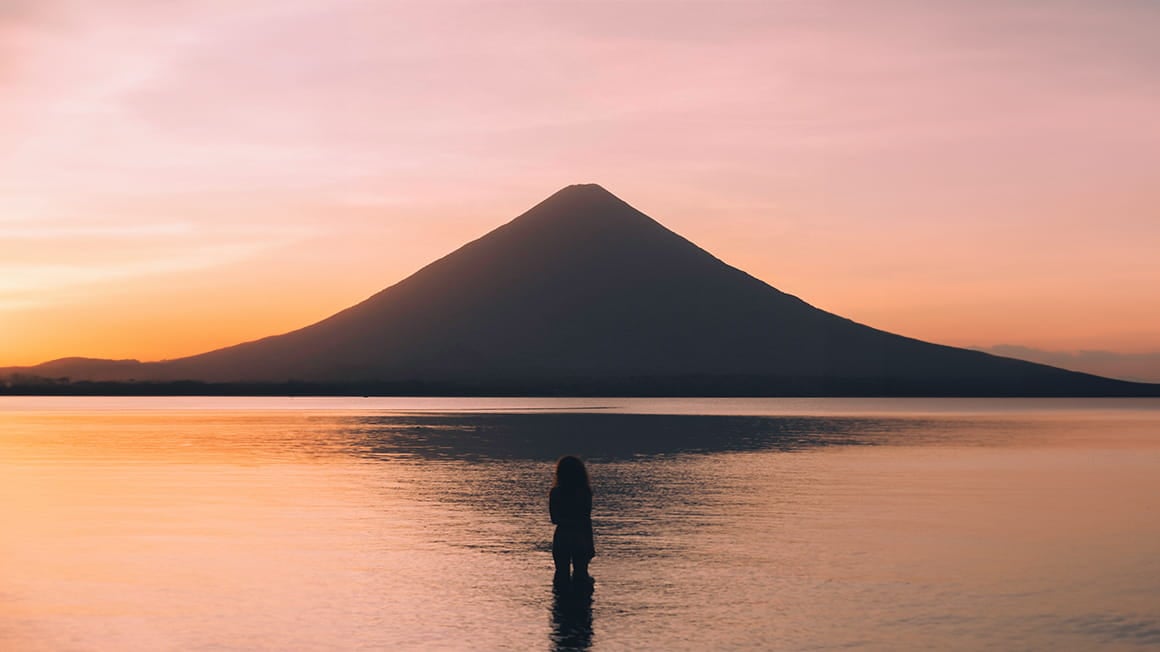
Unlock Our GREATEST Travel Secrets!
Sign up for our newsletter and get the best travel tips delivered right to your inbox.
How Safe is Nicaragua? (Our take)
Is nicaragua safe to visit right now, safest places in nicaragua, 25 top tips for traveling safely to nicaragua, is nicaragua safe to travel alone, is nicaragua safe for female travellers, more on safety in nicaragua, faq about staying safe in nicaragua, so, is nicaragua safe.
Backpacking in Nicaragua has always been very popular. The locals are welcoming, there are epic volcanoes to climb, beaches to laze on, the second largest rainforest in the Americas to explore, history abound; it’s a travellers’ paradise!
Sadly, Nicaragua has been experiencing a lot of turbulence in recent years. Due to the recent political Unrest of 2018, much of the country is difficult to visit. A lot of accommodation in Nicaragua has been shut down and citizens have been fleeing the country.
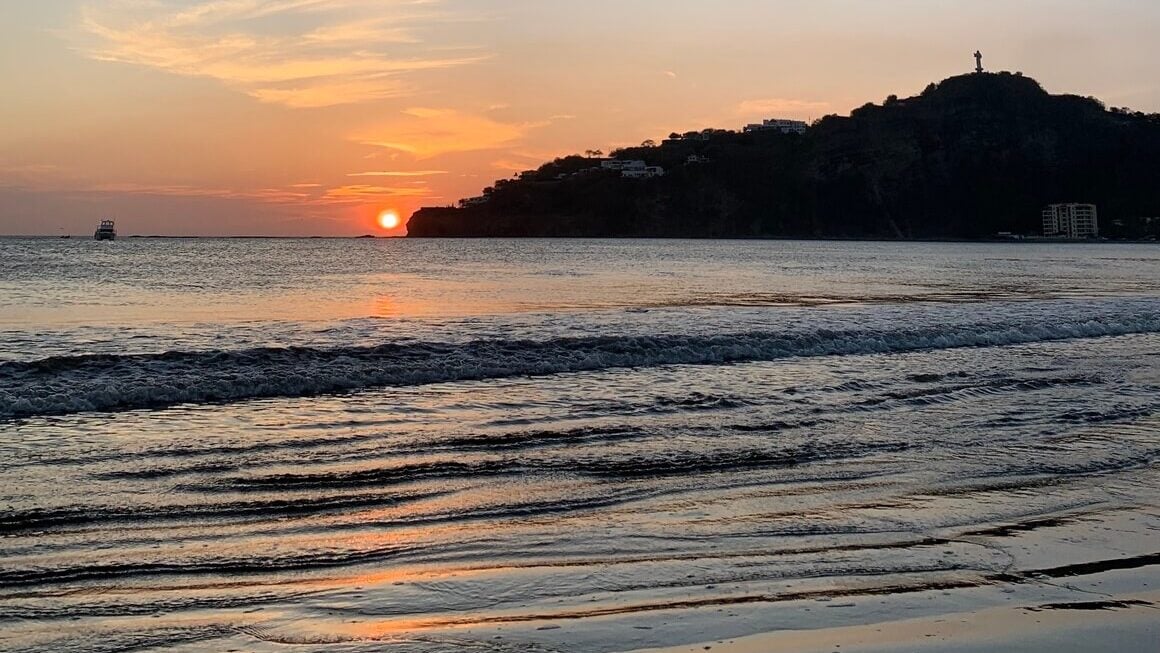
Petty crime is steadily on the rise (though it’s not out of control like in some other places in Latin America). Most people can still visit Nicaragua without getting robbed – they just have to be more cautious than usual.
Truth is: Nicaragua has always been an alternative destination for intrepid travellers, regardless of political situations. Neighbouring Central American countries, Costa Rica and Honduras, were always the more ‘touristy’ options and Nicaragua has always been the odd man out.
This has little to do with danger though and shouldn’t stop you from visiting Nicaragua! Nicaragua is still safe for tourists, within reason.
There is no such thing as a perfect safety guide, and this article is no different. The question of “Is Nicaragua Safe?” will ALWAYS have a different answer depending on the parties involved. But this article is written for savvy travellers from the perspective of savvy travellers.
The information present in this safety guide was accurate at the time of writing, however, the world is a changeable place, now more than ever. Between the pandemic, ever-worsening cultural division, and a click-hungry media, it can be hard to maintain what is truth and what is sensationalism.
Here, you will find safety knowledge and advice for travelling Nicaragua. It won’t be down to the wire cutting edge info on the most current events, but it is layered in the expertise of veteran travellers. If you use our guide, do your own research, and practise common sense, you will have a safe trip to Nicaragua.
If you see any outdated information in this guide, we would really appreciate it if you could reach out in the comments below. We strive to provide the most relevant travel information on the web and always appreciate input from our readers (nicely, please!). Otherwise, thanks for your ear and stay safe!
It’s a wild world out there. But it’s pretty damn special too. 🙂
This is a bit of a tricky one. While Nicaragua is not a country for first-time travellers, it’s definitely a great destination for experienced backpackers.
Tourism still is the most important service industry in the country. It was once a huge boon for the local economy, as poverty was stymied and jobs were created thanks to tourists. In 2018, however, it has been severely affected by political unrest.
Now? Many Nicaragua travel advisories warn against “all but essential travel” to Nicaragua. So whether or not you want to listen to these warnings is up to you. Only you, ultimately, can make the call of how safe Nicaragua is for you.
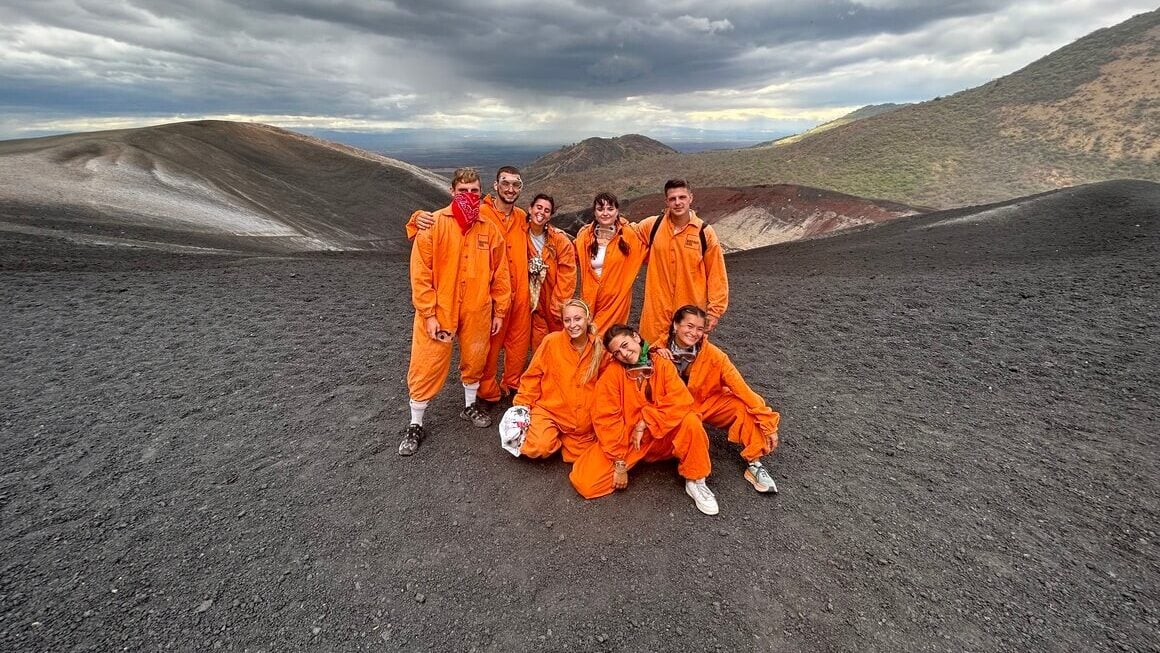
There has been some progress lately in Nicaragua’s safety and political situation, but it’s slow going.
Censorship of the media, especially when students are involved and killed, has been widespread. So has the dismissal of teachers. However, much of this doesn’t affect tourist safety in Nicaragua.
Managua Augusto Sandino Airport is still receiving international flights. Despite government warnings, people are still travelling to Nicaragua. A fair few backpackers have even been staying in Granada recently, as well as San Juan del Sur.
So is Nicaragua safe to visit in 2021? Yes, as long as you don’t get involved in politics and keep your wits about you. No one is targeting tourists (aside from the pickpockets) here.
When choosing where you’ll be staying in Nicaragua, a bit of research and caution is essential. You don’t want to end up in a sketchy area and ruin your trip. To help you out, we’ve listed the safest areas to visit in Nicaragua below.
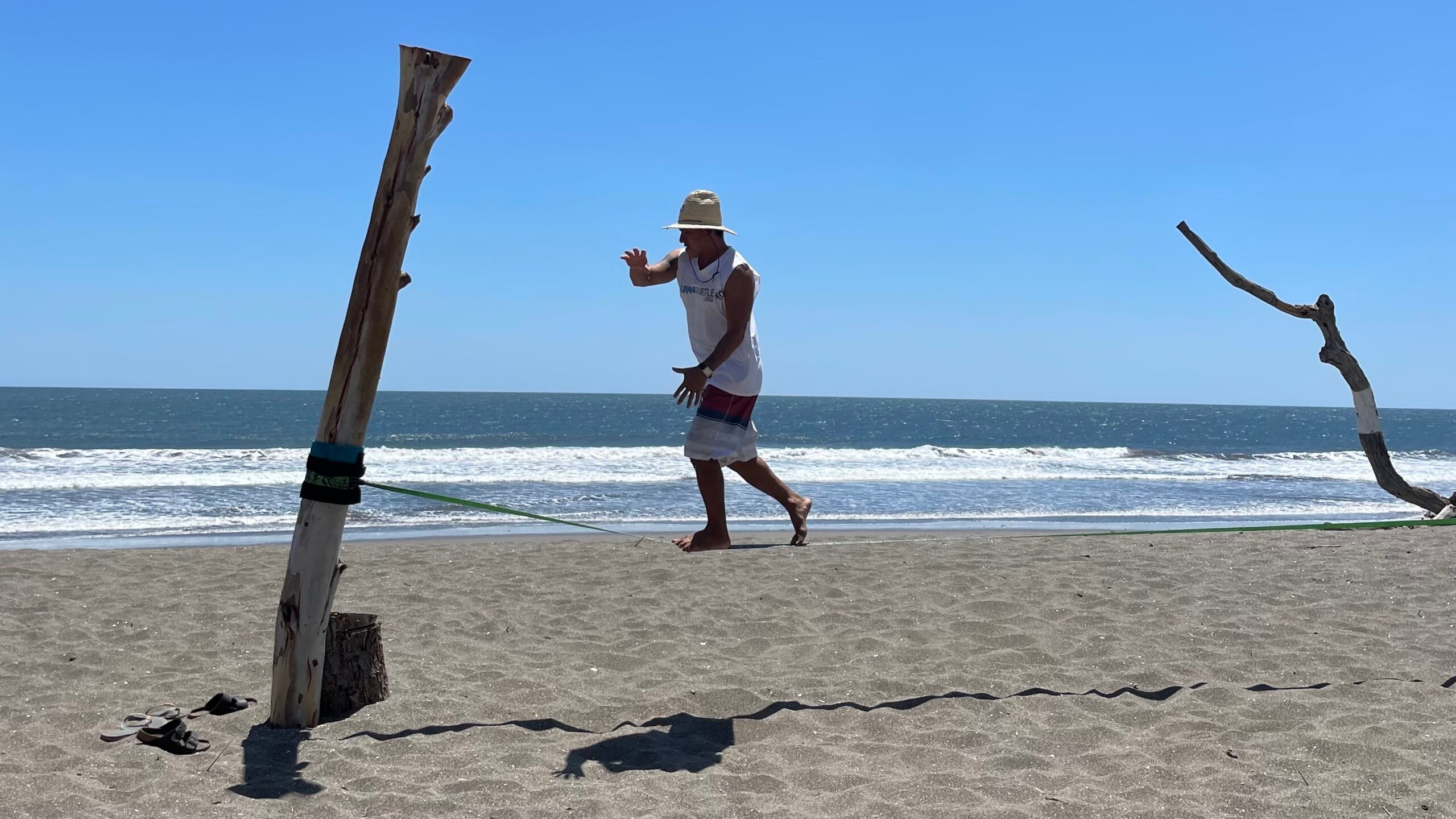
This stunning colonial city is a great place to get stuck. While it’s always been on the backpacker map, Leon is starting to really gain a lot of popularity as a must-visit destination while in Nicaragua. There are plenty of historical attractions to visit, and you can even find pretty cool nightlife here.
Make sure to check out the stunning cathedral in the main square, for just a dollar you can get right up on top of the whitewashed roof where you will be rewarded with stunning panoramic views of the city.
Leon is a little bit more laid back than other cities in Nicaragua, which also shows in the safety statistics. While you still shouldn’t be careless, it’s definitely less sketchy in Leon than elsewhere. However, we definitely wouldn’t recommend walking around alone at night. It’s just a risk that you can very easily avoid.
An easy hop from Leon by chicken bus, Granada is another colonial city with gorgeous buildings, vibrant nightlife and historical sites. You don’t need too long, perhaps just a day, to get a feel for this city but make sure you visit the cathedral and bargain hunt for hand-made souvenirs in the central square.
This picturesque lakeside town boasts charming cobblestone streets, friendly locals, brooding nearby volcanoes, and the beautiful yellow cathedral smack dab in the middle.
For any backpacker travelling through Nicaragua, you will find yourself in Granada at some point. With tourism on the rise in recent years, a boatload of hostels have sprung up all across the city and there are many eco-lodges on the small islands across the lake. Not only that, Granada has also developed a pretty solid infrastructure which makes it one of the safest cities to visit in Nicaragua.
Playa Maderas
A popular surfer hang-out, this is a good place to rent a board for a day ($10) and hit the waves. Most travelers backpacking Nicaragua want to have a crack at surfing and this is one of the best places to learn.
This beach is however normally pretty busy and the food is very expensive. Bring snacks. Likewise, it is an expensive place to stay although if you have a tent you can camp for free. We recommend turning right (as you face the ocean) and walking along the beach, over the rocks and onto the next beach to enjoy stunning views and clear water.
The next beach is completely isolated – it takes just two minutes to walk there but there are currently no buildings, whatsoever. It is pretty much like having your own private beach. If you’re there at the right time of the year, you may see baby turtles scrambling down towards the sea.
Places to avoid in Nicaragua
Unfortunately, not all places in Nicaragua are safe. You need to be careful and aware of your surroundings pretty much anywhere you go in the world, and the same goes for visiting Nicaragua. To help you out, we’ve listed a couple of no-go or caution areas below:
- Public transport stations – Pickpocketing is common at bus stations, on crowded buses, and in the markets
- Managua – Crime occurs in the capital Managua, old cathedral is a well-known crime pit, on Avenida Bolivar
- Rene Schick and Jorge Dimitrov – Gang violence is highly present here
- Zona Rosa – This area in known for prostitution. Ideally, stay away!
- Puerto Cabezas, Bluefields, and the Corn Islands – Street crime is pretty common here but can be avoided with a bit of common sense and caution.
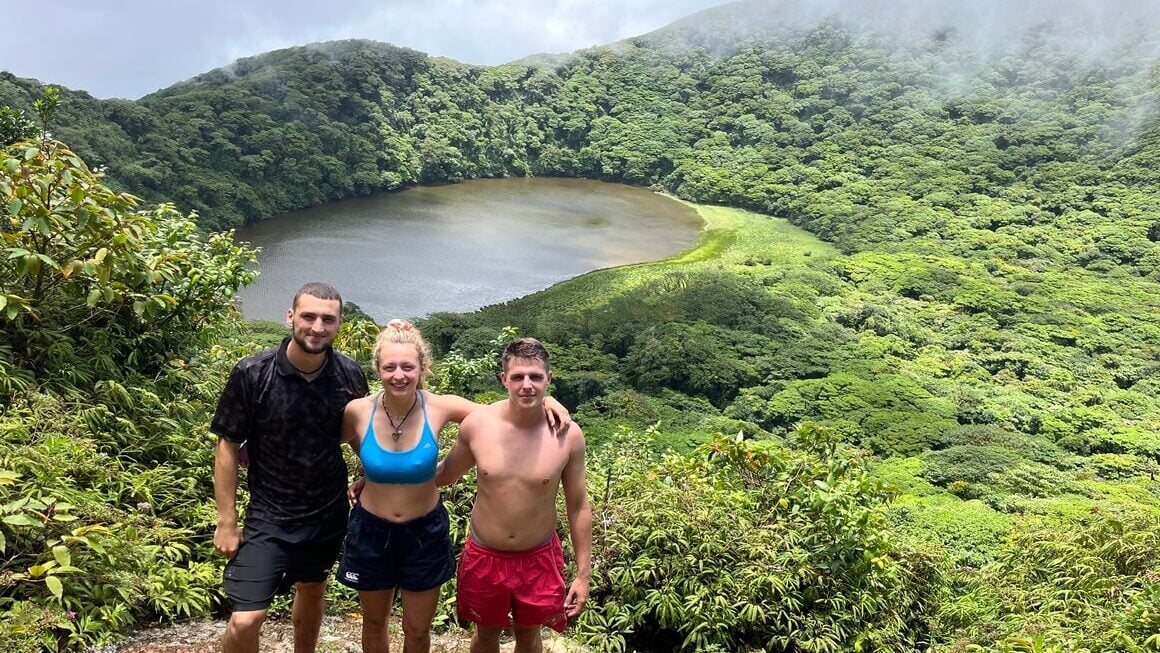
It’s important to know that Nicaragua is definitely not a super safe place, so a bit of caution and research before you start your travels will go a long way. If you want to increase your safety during your stay, read on for our insider travel tips. Stick to those and you won’t have a single issue in Nicaragua.
Nicaragua Travel Insurance
ALWAYS sort out your backpacker insurance before your trip. There’s plenty to choose from in that department, but a good place to start is Safety Wing .
They offer month-to-month payments, no lock-in contracts, and require absolutely no itineraries: that’s the exact kind of insurance long-term travellers and digital nomads need.

SafetyWing is cheap, easy, and admin-free: just sign up lickety-split so you can get back to it!
Click the button below to learn more about SafetyWing’s setup or read our insider review for the full tasty scoop.
If you’re not going to participate in protests or go near to cities, it’s more than reasonable to visit Nicaragua. In some ways, if you want a truly adventurous location where you won’t find many other travellers, this is the place.
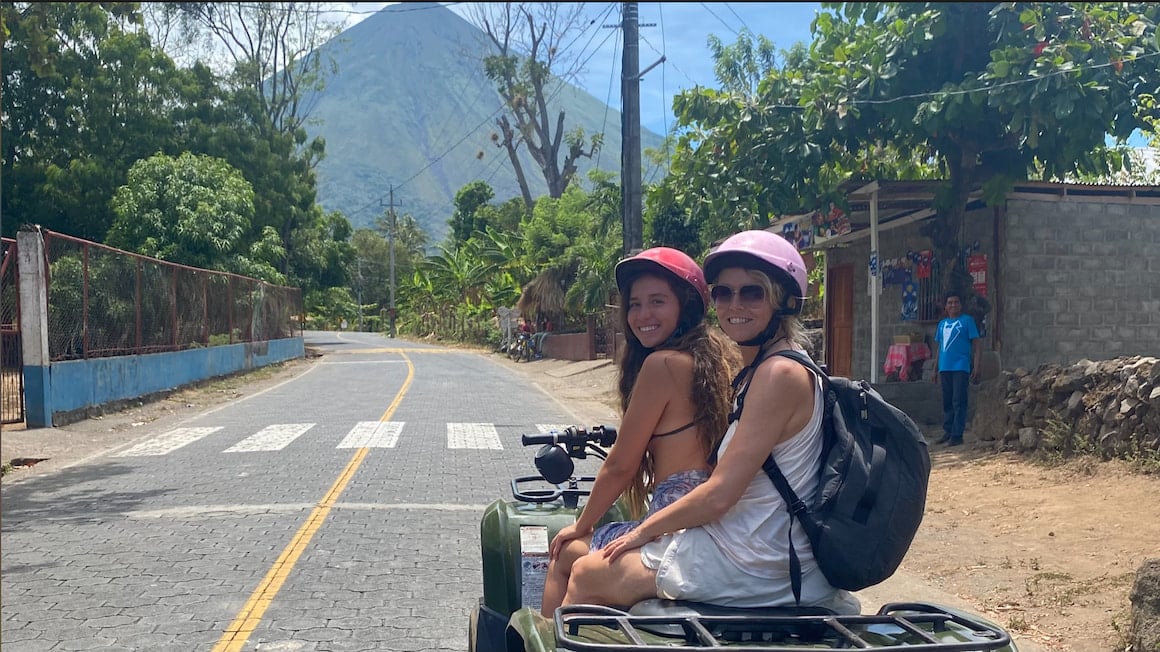
Granted, things are always up in the air – shit could hit the fan again or it could all calm down (which we hope it does). If you do decide to visit Nicaragua, here are some tips to help you on your way.
Nicaragua Safety Tips for Travelling Smooth
- Stay away from protests – DO NOT GET INVOLVED. Methods for crowd control sometimes include live ammunition…
- Know when to travel – Rainy season runs from May to November , which is when hurricanes hit, too.
- Get your Spanish on – Knowing some of the local lingo will help you to get around. It’s good for making friends, too!
- Keep an eye on your belongings – pickpockets, especially around bus terminals, are pretty active. Invest in a good money belt for ultimate protection.
- Use hotels and hostels with good reviews – 24-hour security helps; it just pays to stay somewhere amazing AND safe.
- Don’t walk around looking rich – Flashing cash, wearing jewellery, SLRs; this is pretty dumb and a good way to get robbed.
- Learn what to do during an earthquake or volcanic eruption – It’s simple, but it will definitely help.
- Don’t go ambling off the roads, especially in the north – Landmines still dot this area.
- Only change money at reputable places – Most likely you’ll be ripped off anywhere else.
- Lock car doors and keep windows closed – There have been reports of shady characters lingering around traffic lights in Managua.
- Be careful when you swim – The sea at the Pacific Coast has strong currents. Follow local advice and don’t go out too far.
- If confronted by a mugger, don’t resist – They’re often armed. This is when trouble occurs. Just hand it over.
- Have an escape plan – Let’s be honest, if shit hits the fan, you’re going to want to get out of there. Research, plan, inform others of your plans. Remain vigilant!
- Get yourself a roaming sim – Maps are helpful and so is keeping in touch with family. You can also use your phone to get live updates of ongoing situations in Nicaragua.
- Take a torch with you – For dark nights in rural areas. You don’t want to step on something that can bite you!
- And don’t travel at night either – This is a good time for criminals to operate.
- Stay away from drugs – Possessing any drugs can land you on the wrong, and we really mean wrong, side of the law.
- Don’t use drones – In fact, you can’t even bring them into the country. Say goodbye to the intro to your awesome travel video.
- Protect against mosquitoes – Cover-up, bring repellent, buy coils, whatever is best for you. These guys carry nasty diseases.
- Here be scams – Especially in Managua. It’s best to use the advice your mum told you: don’t talk to strangers.
- Watch out for children coming up to your table – it’s most likely a distraction. They’re there to pinch your cash and they usually work for a boss.
- Always use a good tour company – It might cost more, but it will be better and less dangerous.
- Don’t travel on Sundays (if you can help it) – Schedules can be completely out of whack.
- Pack yourself a medicine bag – Fill it with tablets and pills to keep diarrhoea and other illnesses at bay!
- On the subject, make sure you get relevant vaccines – No-brainer.
As intimidating as Nicaragua sounds, it’s still one of the safest countries in Central America. For solo backpackers, Nicaragua is a good choice.

Solo travel anywhere in the world is pretty rewarding, and it’s no less for travelling to Nicaragua alone. With the hope that Nicaragua can once again return to the peaceful place it was, here are some safe travel tips for Nicaragua.
Travelling to Nicaragua Alone – Tips and Pointers
- There’s a very decent selection of vibrant hostels in Nicaragua. Stylish, fun, and often boasting pools, these are also great places to meet other travellers. Just make sure it’s well-reviewed!
- Lend a helping hand. Get involved with a community project or a charity and give back to the country that you’re enjoying so much! There are loads of different organisations you can reach out to. Check out Worldpackers if you’re interested in volunteering while travelling.
- Learning some of the local language is going to really open up the country to you. And it’s not just normal Spanish, either – there’s a Nicaraguan dialect to get to grips with, and this will go down a treat.
- Book yourself on a tour. This is a good option if you want to get travel Nicaragua safely and without having to stress out. It’s also a very good chance to meet other travellers.
- Getting crazy drunk by yourself at night, either in a city or by the beach, is probably not a good idea. Alcohol is very cheap so you’ll probably want to sample a lot of it!
- On that note, know your limits. Whilst you think you may be fine wandering back by yourself, your judgement won’t be up to scratch. Taking risky shortcuts, hopping in the sea for a skinny dip, or simply getting lost, could end very badly. Especially if you’re alone.
Whilst it is possible to travel safely in Nicaragua as a female, solo or otherwise, it’s important to note that it is a male-dominated society. Sexual assaults against female travellers have happened, especially at beach destinations where everything seems safe.
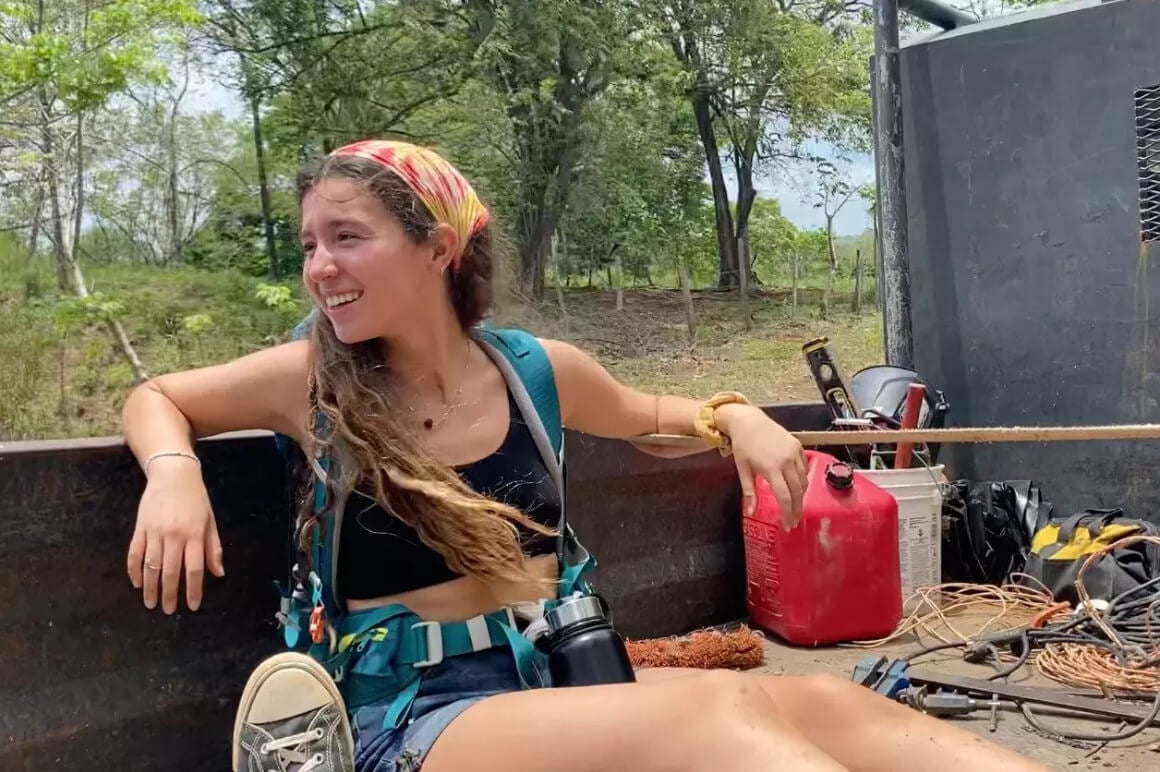
In the past, Nicaragua has been a popular place for solo female travellers. For those who are ready to re-enter the ring and travel to Nicaragua as a solo female traveller, here are a few pointers to bear in mind.
Travelling to Nicaragua as a Woman – Tips and Pointers
- Dressing appropriately and modestly is a smart move. Ok, so, you won’t have to worry about what you wear too much in a beach resort or a party hostel in Nicaragua. Elsewhere you should exercise some restraint and know that Nicaragua is still a fairly conservative country.
- Catcalls will happen because Nicaragua is a fairly macho society. Men may shout or say things to you as you walk by. The best course of action is to just ignore them.
- There ARE cases of serious sexual harassment. If someone follows you, head somewhere busy, into a shop, or somewhere that seems secure.
- DO NOT travel around at night time by yourself. Ever. For whatever reason.
- Buddy up! There are plenty of other female backpackers making their way travelling to Nicaragua. Not only is this good to actually make some friends, but is a good way to get travel tips from other women too.
- Walk around with someone else on the islands, beaches, and in broad daylight, regardless of if they seem safe or not. Deserted areas may feel beautiful, but Nicaragua can be dangerous when there’s no one around.
- If someone’s asking you about personal information, it’s best to be vague . Vague itineraries and vague life stories will keep you safe when people seem to be taking too much interest in you.
- The nightlife is fun in Nicaragua! You may be having a good time and the drinks may be flowing, but don’t let your drink out of your sight. Drink spiking could happen.
- On that note, getting stupid drunk could just lead to trouble, and this isn’t just talking about locals, but fellow travellers too. Stay vigilant – even other travellers can have bad intentions.
- If you want to learn more about local women and their lives, you can always get involved with an NGO. Nicaragua is a patriarchal society, and working with one of these could help you learn more about how the society works.
- You might want to make a stockpile of feminine sanitary products. These won’t be totally available throughout Nicaragua, especially away from the larger towns.
We’ve covered the main safety concerns already, but there are a few more things to know. Read on for more detailed information on how to have a safe trip to Nicaragua.
Is Nicaragua safe to travel for families?
There was a time when Nicaragua was a great place to take your family. The relatively low crime rate and incredible natural credentials made it an amazing place for a family holiday.
Obviously, at the moment, the political situation currently means that travel in Nicaragua isn’t as safe as it used to be though.
Before the unrest this year it was a fantastic ( and inexpensive ) family-friendly holiday destination. The country still offers great amenities to those with children.
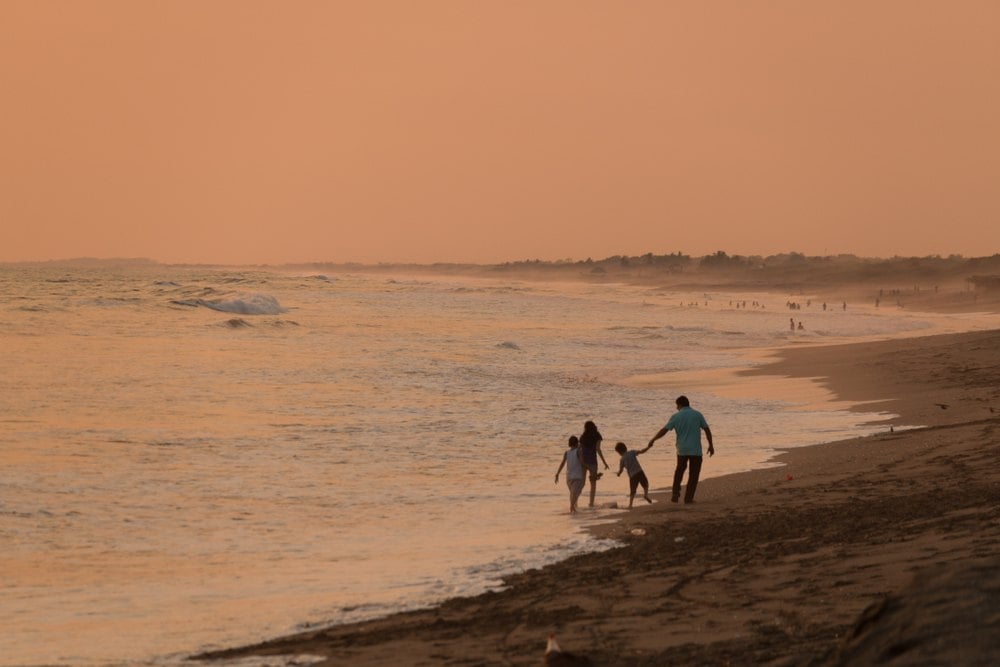
Family-based tourism in Nicaragua is still safe and mostly intact. There are some great hotels to stay at, homestays to enjoy, and a lot of local culture to soak up. Not only that but you can watch sea turtles nesting, play around in the surf, and/or visit indigenous peoples.
If you decide to travel to Nicaragua with your family, there are some things you will need first. You’ll need:
- Vaccines (obviously). Know what shots you need to go to Nicaragua.
- Protection against mosquitoes.
- To watch out for creepy crawlies like scorpions.
- Protection from the sun.
- Be careful when you’re at the beach – riptides are dangerous!
- Make sure your children stay away from stray animals.
The country has seen better days, but its attitude towards the family is still as strong as ever. It’s still fairly safe to go to Nicaragua for families.
Is it safe to drive in Nicaragua? Getting around Nicaragua.
Driving in Nicaragua is possible and people do rent cars and have an incredible time exploring for themselves. Driving is a good way to see what the Pacific Coast and Central Nicaragua has to offer.
Make no mistake, driving in Nicaragua is still an experience. You’ll have to deal with all the usual stuff and then some. Dodgy rental cars, potholes, drink drivers, lack of signs, animals in the road, no lights on highways: all of these make driving in Nicaragua not very safe.
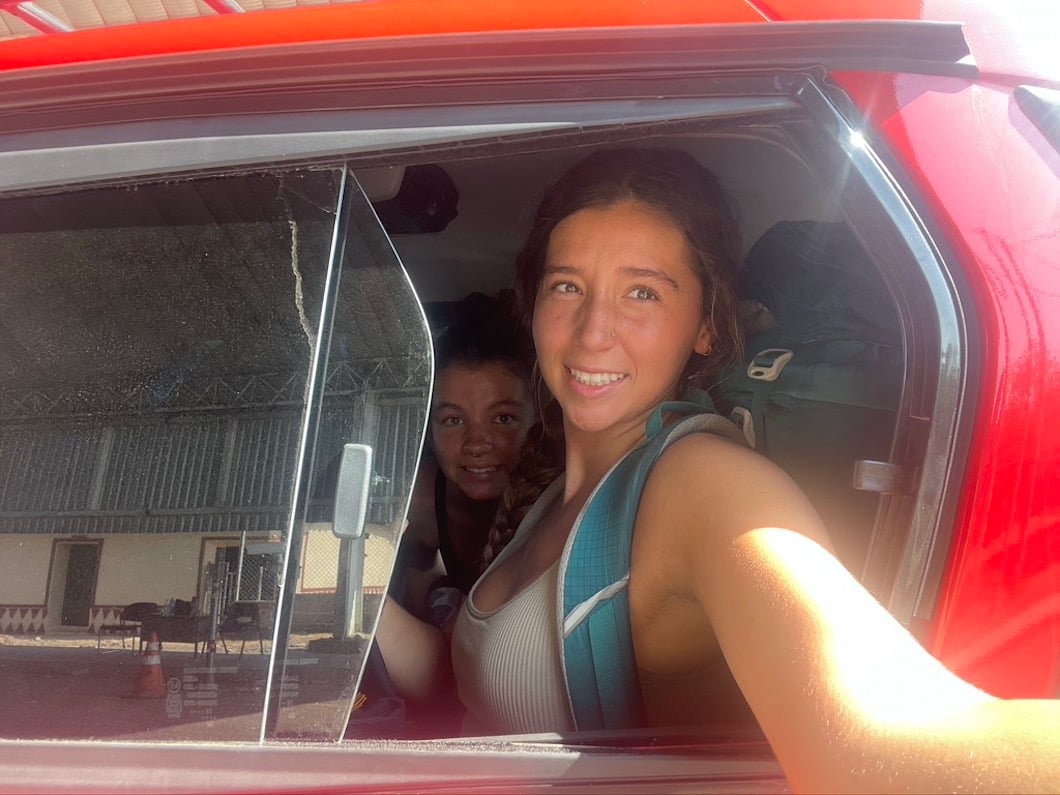
Not only that, but corrupt police might pull you over for a bribe. Use your judgement of the situation on this one.
Improvised roadblocks are all over the place and can pop up sporadically. They’re thrown up by locals and areas around these can be dangerous as police try to clear them (there’s often violence).
The barricaders themselves aren’t too interested in gringos , so don’t worry. There might be some dodgy people, but generally, barricaders are there for some political cause.
Even before 2018, we’d have said that driving isn’t safe in Nicaragua. Now? It still isn’t. Proceed according to your own abilities or get yourself a local driver.
Is Uber safe in Nicaragua?
The Nicaraguan government has refused permission for Uber to operate in the country. They don’t want to cause trouble for local taxi drivers, who are already on a low wage.
Nicaragua is an Uber-free zone, people. End of story.
Are taxis safe in Nicaragua?
Taxis in Nicaragua are not always safe. These can be very sketchy and downright dangerous.
Using a taxi is likely unavoidable though and, chances are, you’ll have to take one at some point in Nicaragua. While they may not be ideal to use, they are, unfortunately, your only option at times.
Most taxis in Nicaragua are shared taxis – this is common practice . If you don’t fancy sharing, make sure you agree on a solo journey and agree on the price before you get in. Don’t know Spanish? Write the number down and show it to the driver, but not on your phone!
Official taxis in Nicaragua have a red border around a white license plate. You should be able to see the driver’s company name, and the license plate itself should be clear, too.
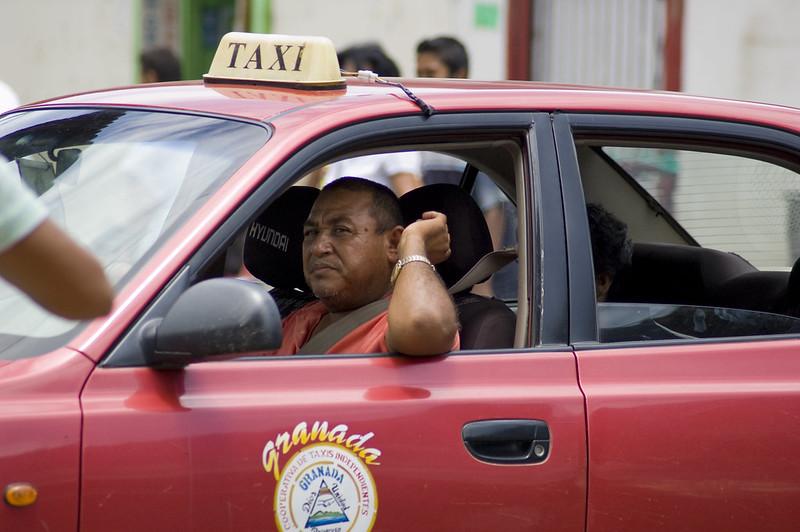
Lock the doors when you get in and hide your luggage. Make sure you have small change with you so you don’t hand over stupidly large bills just to get no change back.
Unfortunately, express kidnappings have been increasing recently. These are particularly common when leaving from the airport but can happen in cities as well. Usually, these start with a stranger asking if you need a taxi and end with you being forced to an ATM instead. Don’t listen to drivers that seem overly eager or forceful.
We recommend booking a taxi through your hostel. Get staff to book a cab for you and become friendly with the driver. If they seem like a good sort, use them regularly.
Taxis aren’t what we’d call super safe in Nicaragua, but as we said… sometimes you have to use ’em. It’s still the safest way to get around at night time for that matter.
Is public transportation in Nicaragua safe?
Most towns are served and connected by chicken buses – those colourful, old American school buses that cram everybody and their livestock on board. You know the ones.
If you’re not in a hurry to get anywhere and fancy a local (if uncomfortable) experience, we say use them! Just don’t take your eyes off your bag, and be sure to watch your pockets. Keep hydrated too, ’cause it can get very, very hot on these. (Did you remember a water bottle?)
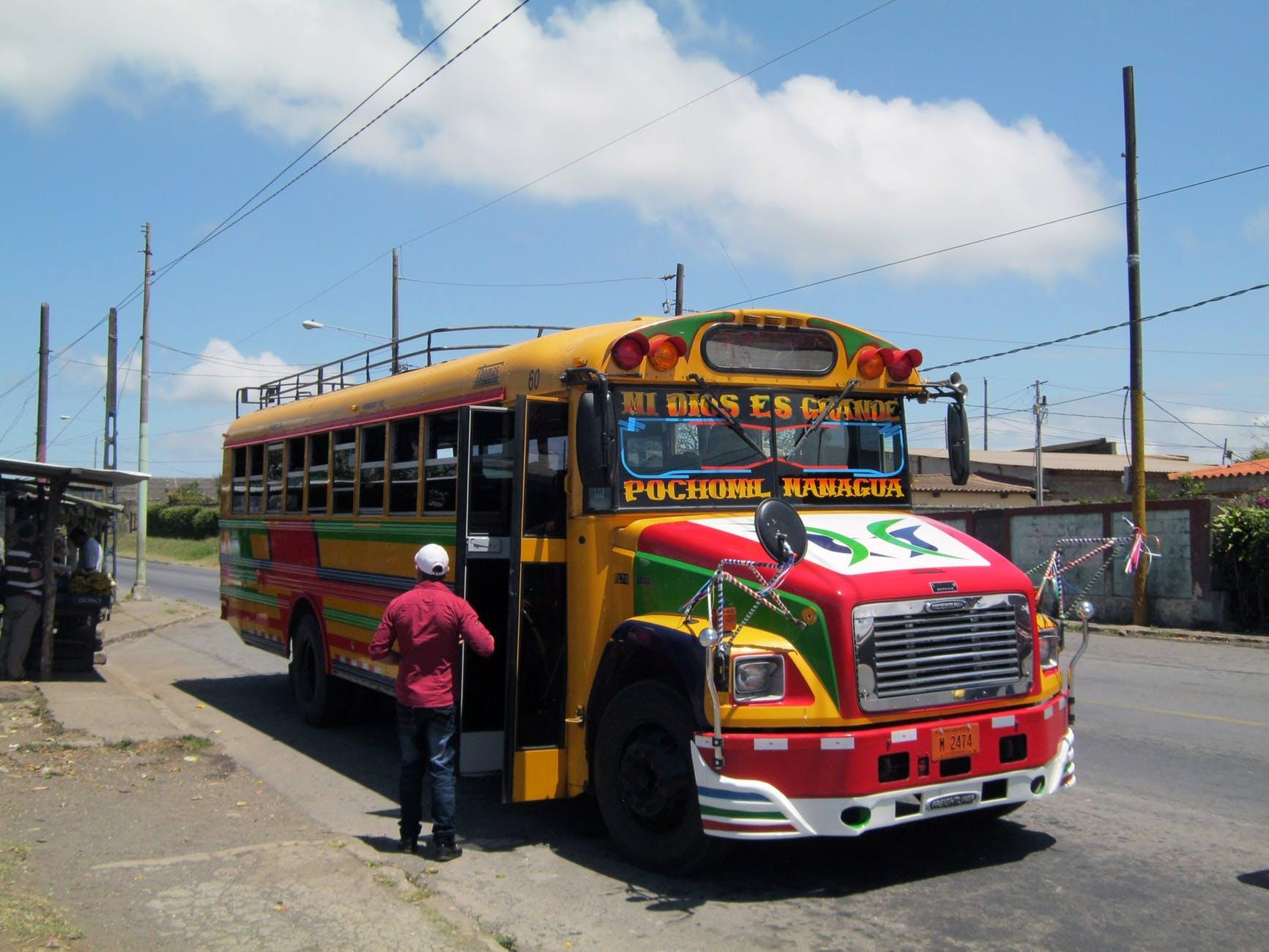
Then there are microbuses. These are smaller, faster, and more expensive than chicken buses. They leave only when they’re completely full and behave much the same as the chicken buses but in micro-form.
Bus terminals can be chaotic and overwhelming. Watch out for shady characters lingering around.
If you’re after more comfort and safety while travelling around Nicaragua, then opt for privately-owned minibuses. These are pretty luxurious compared to everything else – air-conditioned, pre-arranged through your hostel, and is more often a gringo -only experience.
Public transport in Nicaragua isn’t the safest but it’s still more than usable – many travellers do.
Is the food in Nicaragua safe?
Spanish, Indigenous, and Creole flavours mix in a tantalisingly tasty cuisine offering in Nicaragua. There’s heavy use of corn (of course) on the Pacific Coast, whilst on the Caribbean Coast, there’s seafood and coconuts galore.
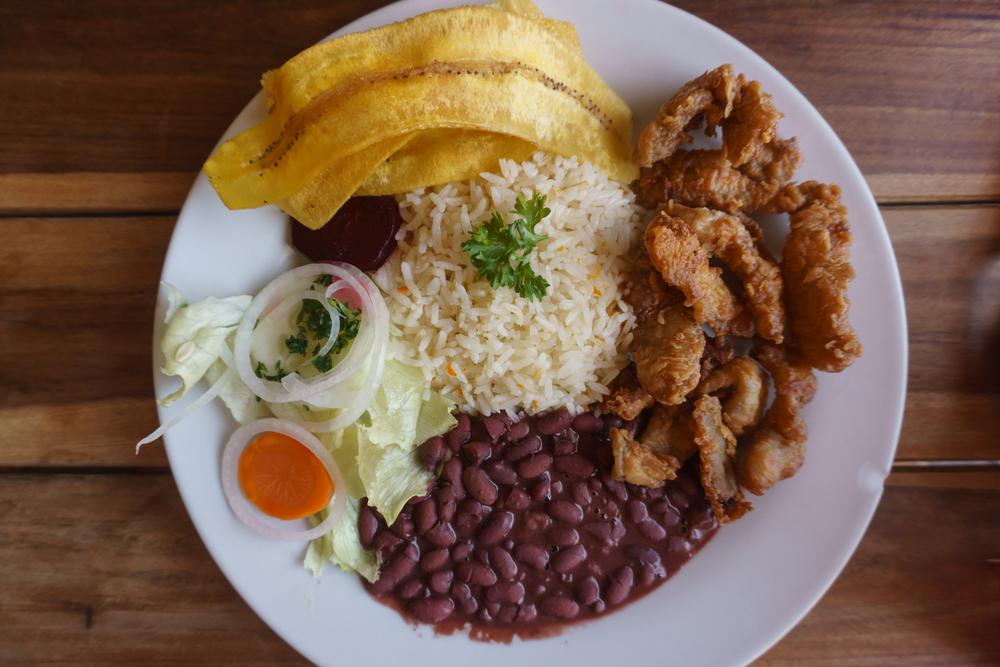
Keep clean, don’t be too greedy, and definitely use your common sense. In general, you should be fine eating your way around Nicaragua – especially if you’ve just come from somewhere else in Latin America . Even if you haven’t, you’re in for a treat. The food in Nicaragua is pretty darn safe… and delicious!
Eating Safety in Nicaragua
- Street food is where it’s at. But rushing in and eating literally everything is a BAD move. You’ll probably get sick.
- If you’re prone to a bad stomach anyway – or have a medical condition – that means your digestive system is a bit sensitive, then you may just want to take it easy in general. Bring rehydration sachets and diarrhoea medication.
- And when it comes to street food, look around. It may all look pretty good, but a rule for pretty much anywhere in the world is to go where other people are going. Busy places are good, especially if they’re more local.
- If meat, or any food for that matter, isn’t freshly cooked – and especially if it looks like it’s been sitting uncovered all day – don’t even bother.
- You may really want a smoothie because, no joke, they look amazing. But be careful of anything raw. Fruit, washed or unwashed, can be crawling with germs.
- Same goes for salads and vegetables. Peel, wash with sterilised water, cook, but don’t eat raw. A good way to get a bad tum.
- … And ice cubes? Could be tap water.
- Seafood is very popular here and it’s prepared in wonderful ways! It is probably best tried in a restaurant or the in-house eatery at your hostel/hotel/guesthouse. Eating seafood on the street is usually a bad idea and you’ll be asking for trouble if you do so.
- Wash your hands, forever and always. Or (and), sanitise.
- Traveling with an allergy? Research ahead of time how to explain your allergy (or just vegan). If you’re gluten-free, pick up a handy Gluten-Free Translation Card with descriptions of Celiac disease, cross-contamination risk, and local Nicaraguans ingredients in Latin American Spanish.
Can you drink the water in Nicaragua?
The water in Nicaragua is allegedly potable and safe to drink.
Many Nicaraguans drink the tap water, but you may get Traveller’s Diarrhoea if you try.
If you don’t feel comfortable, then don’t risk drinking from the tap. Stick to bottled water, or bring a refillable bottle and water purification tablets. Boiling water is always the surest way to eliminate harmful organisms.
A Grayl Geopress would also be a great investment as these are quite effective in the field. Seriously, filtered water bottles are the best.
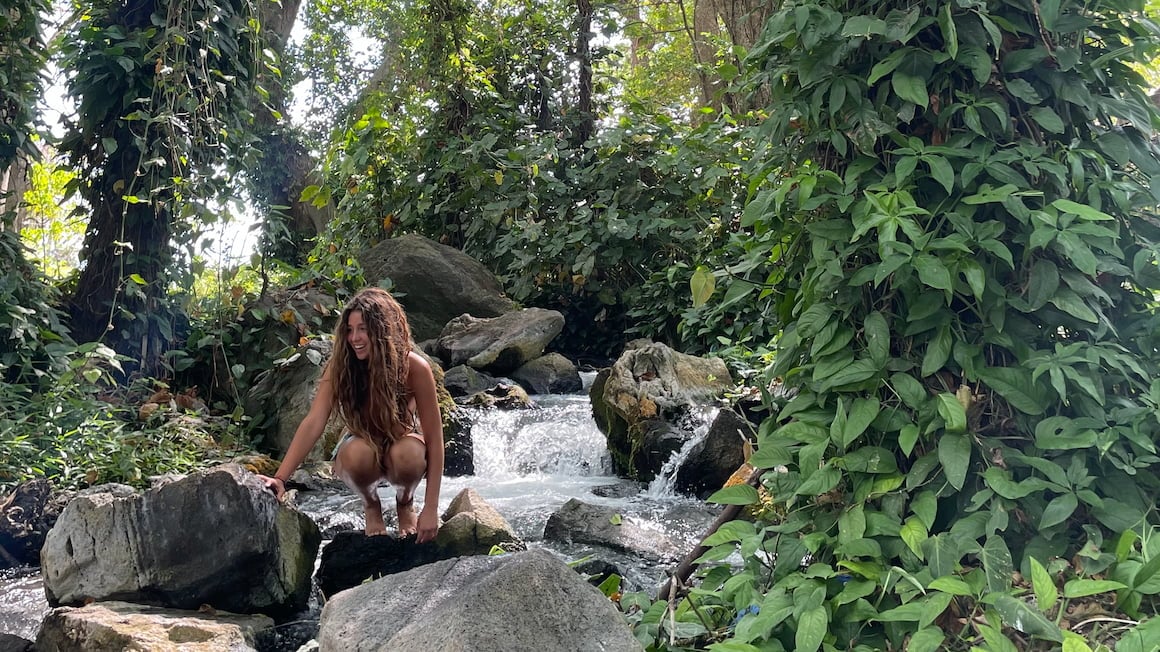
Is Nicaragua safe to live?
Many ex-pats end up living in Nicaragua. It’s safer than its neighbours, has a generally laid-back lifestyle, low cost of living, good food, and some amazing natural landscapes. If anything, it’s becoming an increasingly popular destination for ex-pats but there are aspects that mean Nicaragua is not safe to live in.
You’ll still be targeted like any other travelling gringo – that means petty theft and scams are still things to look out for. Trying your best to blend in, not being flashy, not shouting around in English; these things will help you live more easily in Nicaragua.
Learning Spanish is a must. Even if it’s just a little bit, learning the local language will help you get around.
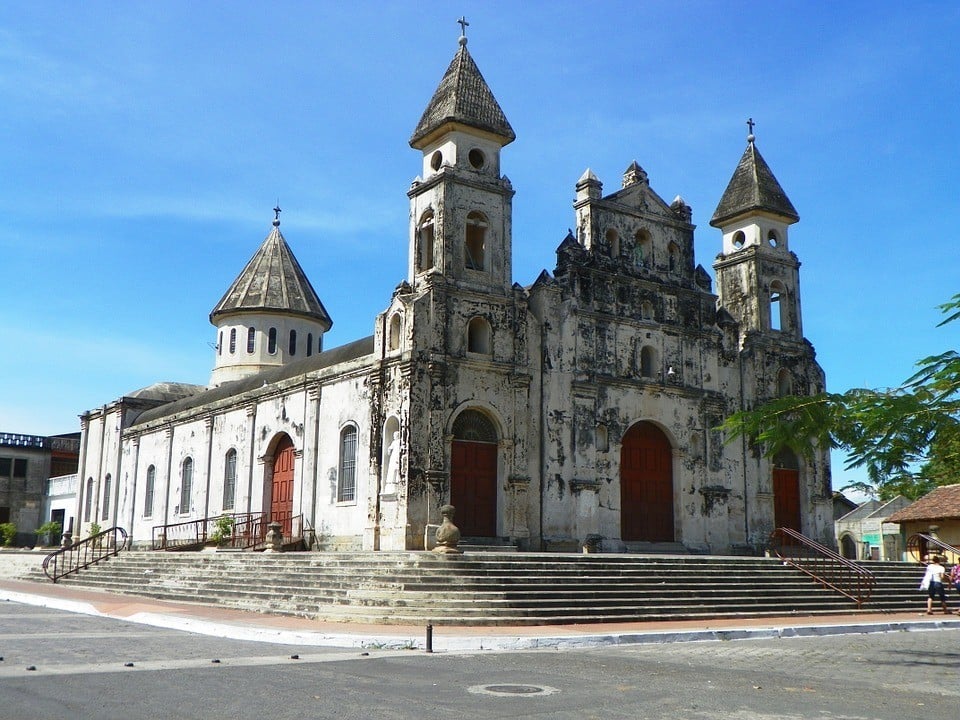
The urban infrastructure is inhibited greatly by the unrest. There’s often a shortage of fuel, frequent power outages, somewhat limited food supplies, and a heavily censored media. When there’s a big confrontation the internet gets shut off, the roads are blocked, and the paramilitary presence increases greatly. At this point, protests and even looting are usually on deck.
Living in Nicaragua, you’ll have to be ok with this instability. Living in Nicaragua has its pros and cons.
If you want to know more about the current situation, you really should do your research. At the end of the day, I wouldn’t say living in Nicaragua is safe but you may be of a different mind.

A new country, a new contract, a new piece of plastic – booooring. Instead, buy an eSIM!
An eSIM works just like an app: you buy it, you download it, and BOOM! You’re connected the minute you land. It’s that easy.
Is your phone eSIM ready? Read about how e-Sims work or click below to see one of the top eSIM providers on the market and ditch the plastic .
Is it safe to rent an Airbnb in Nicaragua?
Renting an Airbnb in Nicaragua is a great idea. Unfortunately, there are not an incredible amount of options, but the ones you are getting are pretty safe. Just don’t expect super high luxury.
And it’s perfectly safe, as long as you read the reviews. Staying at an Airbnb during your trip will also open up new possibilities and options to experience the country. The local hosts are known to take great care of their guests and give the absolute best recommendations of what to do and what to see. Local knowledge always goes a long way, so be sure to reach out to your hosts if you’re unsure about how to fill up your Nicaragua itinerary!
On top of that, you’ll stay safe with the reliable Airbnb booking system. Both hosts and guests can rate each other which creates a very respectful and trustworthy interaction.
Is Nicaragua LGBTQ+ friendly?
Nicaragua is fairly open to same-sex relationships. Keep in mind that it’s a pretty conservative country, so be aware of the culture and religion is a must. You can also expect quite a few stares and maybe one or two rude comments. However, you won’t face any other issues as an LGBTQ+ traveller.
Party destinations like San Juan del Sur are more open-minded thanks to a generally younger crowd and more travellers. If you’re worried about your safety, stick to these kinds of places!
Here are some quick answers to common questions about safety in Nicaragua.
Is Nicaragua safer than Costa Rica?
Nicaragua’s crime rate is slightly lower than Costa Rica, but the two countries are pretty much equal when it comes to safety. Costa Rica sees more tourists than Nicaragua which means there are more attractions and facilities that accommodate visitors, but Nicaragua’s untouched nature is far more impressive than Costa Rica’s.
What should you avoid in Nicaragua?
– Don’t get involved in protests – Avoid visiting during the rainy season (May to November) – Don’t look like a tourist or super-wealthy – Don’t underestimate the sea current
Is San Juan del Sur safe in Nicaragua?
San Juan del Sur is overall safe, especially during the day. The main concern you’ll have here is petty theft and pickpocketing. Avoid the beach at night and stay away from the dark side streets. In fact, don’t go out at night at all to add another level of security during your stay.
Is Nicaragua safe for tourists?
Nicaragua can be very safe for tourists if one uses their common sense and has been travelling around Central American countries before. As long as you stay away from protests, sketchy areas and keep an eye on your belongings and surroundings, you’ll be safe in Nicaragua.
Although plagued by petty theft and civil unrest, Nicaragua is still one of the safer Latin American countries you could choose to visit.
It’s an interesting one as well since it’s sandwiched between two of the most visited countries of Central America yet remains generally undiscovered by backpackers. Even so, the tourism industry is the second biggest in the country and it could be even bigger under different circumstances.
With the advent of some serious political trouble in Nicaragua safety has come into question and tourists have been opting to not travel here. At its worst, between May and November of 2018, hostels had closed their doors and tour companies stopped operating. Backpackers ARE starting to trickle back in, but the fact remains that the situation isn’t stable.
Is Nicaragua safe for travel? It’s like a bubbling pot. There’s a chance it could boil over but the tourist status changes thing, as it usually does Nicaragua is mostly safe for tourists provided you understand the political situation and the volatility of it.
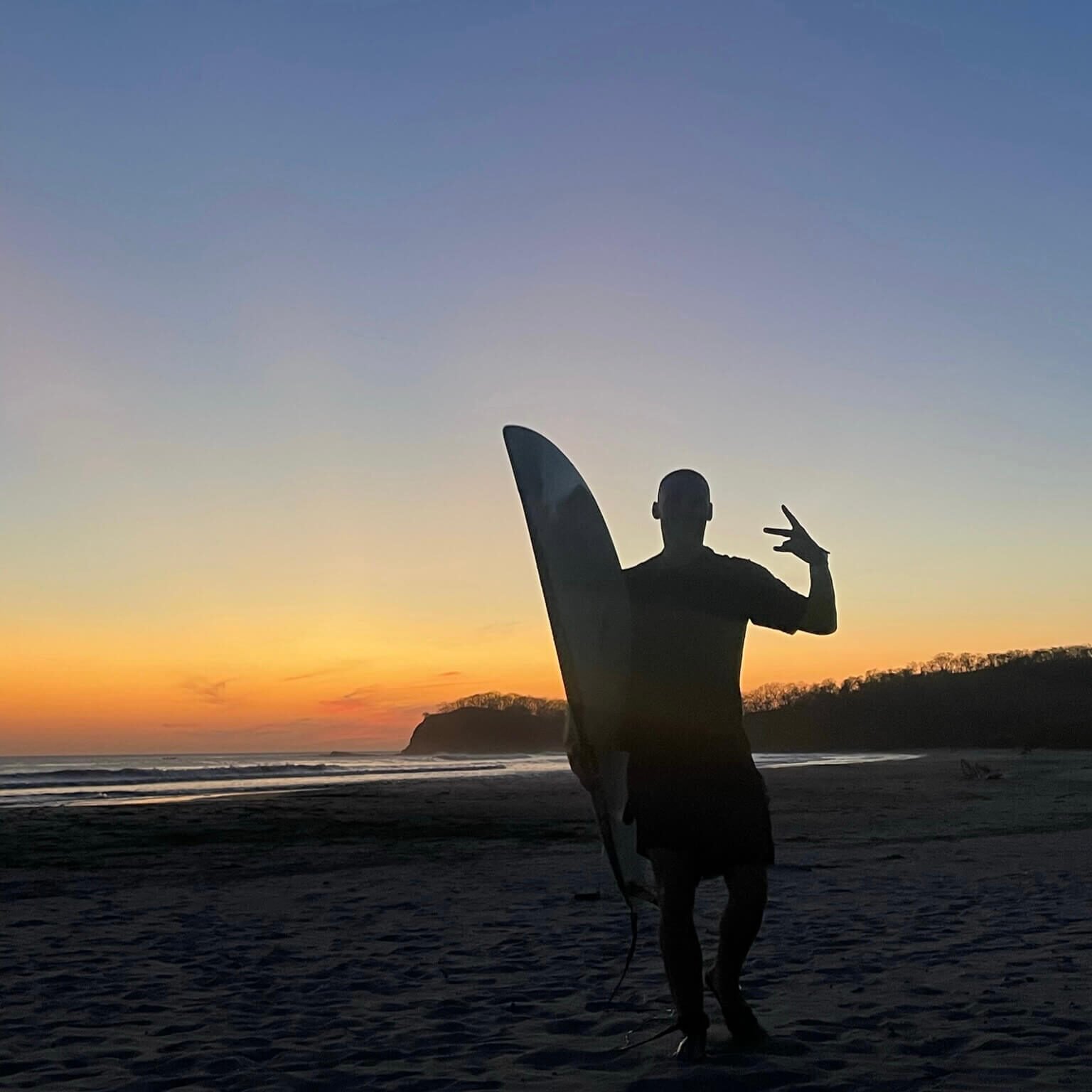
Disclaimer: Safety conditions change all over the world on a daily basis. We do our best to advise but this info may already be out of date. Do your own research. Enjoy your travels!

And for transparency’s sake, please know that some of the links in our content are affiliate links . That means that if you book your accommodation, buy your gear, or sort your insurance through our link, we earn a small commission (at no extra cost to you). That said, we only link to the gear we trust and never recommend services we don’t believe are up to scratch. Again, thank you!
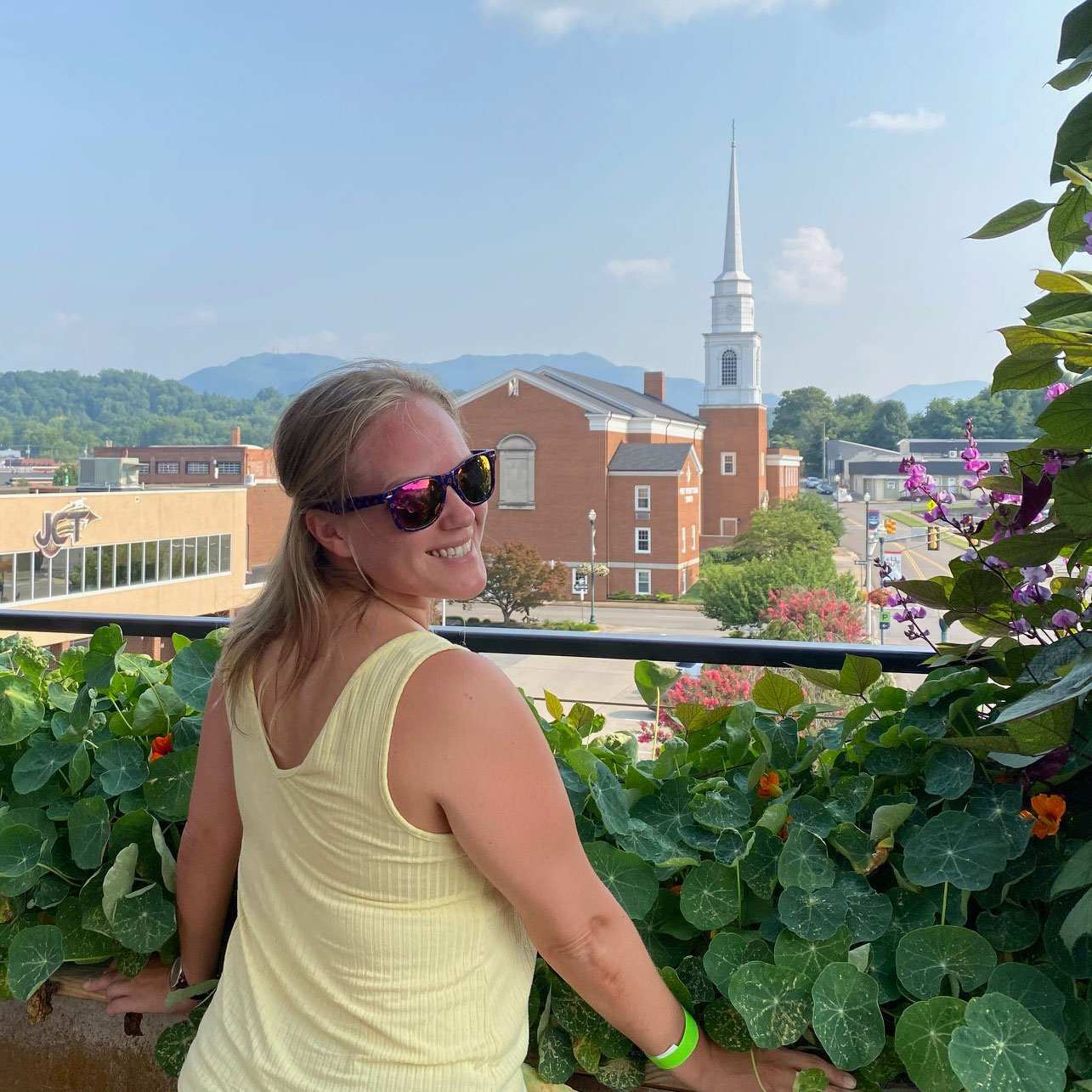
Share or save this post

47 Comments
I’ve visited Nicaragua every year for 17 years, up until 2019. I agree that generally speaking, it is safe. There is a heavy military and police presence everywhere, and even the fast-food restaurants have heavily armed security guards at the entrances, replete with AR 15 assault style rifles. Getting stopped by the police in the countryside where a bribe was expected seems to have gone by the wayside, but it used to be a common practice. The Nicaraguan economy has been in a shambles since April 2018, especially tourism, when the government began its harsh repression of a popular uprising. There is now an uneasy calm, and the dictatorship of Daniel Ortega is firmly in control. He recently emptied the jails of many of his critics and political opponents, put them on a plane, flew them to Washington DC, and stripped them of their Nicaraguan citizenship. As Loz says, better to avoid any political activity in country, but don’t ignore the fact that the Ortga government is a corrupt, cruel, intolerant regime whose only allies in the world are fellow dictators. If you’re adventuresome, go, don’t take chances, and support Nicaraguan businesses. But don’t be politically naive.
The comment by the author that there is no Uber is correct – however, there are local Nica apps equivalent to Uber that work well (eg Aventon)
The white cathedral in León and it’s rooftop is GORGEOUS!
Of course it is safe. I’ve lived here for 5 years and have never been robbed or threatened in the street. And I’ve travelled all over from Ocotal to Chinandega to San Juan del Sur. The national highways are generally excellent, as good as European roads, and driving is generally safe outside Managua, providing you take care – motorcycles are by far the worst, ridden by youths who have no clue about road conditions and take chances. Taxis can also be badly driven. However, road rage is rare as Nicas don’t like violence and avoid it. The police do stop motorists, but it is quite rare to encounter a bent cop; if your papers (driving licence, insurance, road tax) are in order, they’ll let you go and even wish you a good journey. On the politics – don’t get involved and you’ll be fine. In any case, you wouldn’t get involved in the politics of another country, whether it be Argentina, Algeria or Australia, unless you come from there, so why worry about Nicaragua? Leave politics to the Nicas; it’s their problem, not yours. Just be a tourist and enjoy yourself – plenty of excellent beaches, restaurants, hotels – all perfectly safe.
Thanks for some great local insights, Loz!
I have spent months in Nicaragua starting in 2001 until 2012. I would NOT recommend travel. It is not safe. The writer of this article has presented the country with rose colored glasses. For as many wonderful people you will encounter, there are as many, if not more, waiting to take advantage of you. In more ways than you can imagine. I have been mugged there, have walked past the dead body of the town’s public official being brought out after being murdered, I have witnessed domestic violence, violence against strong local men who know what they are doing in their hometown, stumbled over children huddled on street corners in the middle of the night to stay warm together, seen people living surrounded by human waste and more. There is a charm about the country which seems to be humble yet kind, but again, for as much of this that you will encounter, there are so many people waiting in the shadows. I brought my sister with me on one trip and in the airport, before entering the fresh air of Nicaragua which smells of burning trash, someone leaned in and said right in her ear, “Trust no-one here.” A perfect stranger told her this upon arrival. At the time, I still had my rose colored glasses too. Do not be fooled, this is not a tourist destination where you can make yourself feel good about supporting a humble local economy, Nicaragua has become a dark and scary place.
Good insights. I’m contemplating expat status here. I’ll visit next month. I learned a lot.
Traveled their Jan 2017 before shit hit the fan stayed in Managua . Felt uneasy for the unfamiliarity in the middle of the night with and 11 and 14 year old. Arrived to destination and still a little uneasy. Once morning struck very friendly and accommodating at the hotel, resort, middle of no where it seemed. Waited for our pre arranged driver to take us to San Juan del sur. Arrived after breakfast showed us some sites offered a pit stop and a side attraction along the way and brought us to our door in San Juan del sur. Experienced a very welcoming people even though power went out and struggled to exchange currency we surfed and mingled. We met 1 tourist who had his camera bag and money stolen from the walking path but not in person he left it unattended ( not smart). Never felt unsafe walking through. We rented a vehicle and drive to visited Rivas markets and no problems. We carried on to Granada . We stayed 5 blocks from the squire in which the host infred of us areas to stay away and use caution. We ate at a local joint and felt safe but different as the kids explained it. Walked around met locals and even met people from our plane ride and expects who raved about the country. Someone even recommended a place to eat and bought us our meal. Completely uncalled for and unheard of back home. Seen him again later and bought him lunch. We were the only ones in our hotel as it was not as central but excellent hospitality. We still talk to our hostess to this day.
Felt very safe all around and talked about moving there one day. Unfortunately a hurricane devastated San Juan del sur and then government corruption hit. We ha e not expected anywhere but Nicaragua is not off the list. Cheers
Hey, thanks for a great article! I have been dreaming of going to Nicaragua for years and I really want to travel to the San Juan Del Sur area (at least) alone from Costa Rica in February. Not to sound conceited but I have to mention, I’m a typical Swedish blue eyed blonde in my twenties; would I stick out too much as a chela/gringa for petty criminals? Also, I have never travelled alone before and Mexico is my main Latin America experience as well as having only very basic Spanish.
Could I go to a resort alone to ensure safety? Also, I don’t drive and would have to cross the border on foot, has anyone done this? What is the experience like, tips etc please?
Yes you will stand out and yes you will get a lot of attention. However, whether that attention is from criminals or in any way negative I am less sure of – I met Icelandics traveling across the country and they had a wonderful time. Basically, follow all of the precautions we have set out and keep your wits about you.
Nicaragua still is the safest country in Central America, including Costa Rica. Friendly people and beautiful nature are big assets, don’t miss the beaches!!!
I am an Alabamian who visited Esteli in Feb ’20 for a cigar factory tour. I promised myself that when I was financially able to exit the US, Esteli would be my home for at least 4 years. I was awarded disability in spring ’20 and drove to Esteli from Birmingham in Nov ’20. I had 2 corrupt police issues in northern Mexico. I made sure I was in a hotel before nightfall except for Guat City, Guatemala, where evening traffic was a crawl, but no danger issues. I got off the highway and found a taxi and asked him to escort me to a hotel for a pre negotiated fee. We arrived and I paid him. He was very nice. I learned to say Disabled Veteran former Military Policeman in Spanish, and had no law enforcement problems along the way (after N Mex). I have filed for permanent residency and the government has been accommodating all through the process. The car gets a few looks, too, as well as the Alabama license plate. Can’t get local plates until I am approved for residency. The city isn’t too big nor small. It’s great. No regrets.
Hi Long Ash
I’m delighted to learn that its working out for you. I hope your enjoy your time there.
To Ana, and Maribel Ruiz…thanks to you both for your contributions. Although it is not impossible to visit my beloved Nicaragua right now, nether is it advisable. There simply are too many unknowns, primary of which is what you’d do if you became seriously ill while there. Never make an international journey, without comprehensive travel insurance with good coverage in the event of your needing to be evacuated for medical reasons. It will take some time for tourism to become re-established there, but waiting is the more prudent course right now. Think 2022, at the earliest. A small language comment for Maribel: “Petty” crime vs “pretty” crime. ( Maybe a typo.). Pretty = linda in Spanish. ” Petty” in Spanish would be something like ” sin importancia”, or ” menor”,thus something like being pick pocketed would be a petty crime (but horribly inconvenient!) as opposed to violent crime, such as rape, assault, murder, etc. Much worse! And there is almost no violent crime in Nicaragua directed against foreigners, that I have ever heard of in 17 years travel there.
My cousin (Afro American) has been living in Nicaragua for past 2 years as a single woman up until recently…Her boyfriend who is a security guard, now lives with her in a 2 bedroom apartment for approximately $200/ a month! She is 70 but looks GREAT for 70! Her boyfriend is much younger than her.Thus us the trend there…older woman,younger man.Why?…There was a War some years ago & alot of the older men were killed!!! Last month there was a water shortage in her local.A water truck distributed Water to the local.She & her neighbor she water from a large water tank. Recently, my cousin visited her on his annual vacation. I have yet to hear from him about his visit…so I cannot speak on it. The weather is hot & sometimes it rains for a whole week. I do not have a desire to visit there as I look forward to visit Ghana with a tour group, Kenya & Malawi.I have an Aunt & Uncle living in Malawi.
As much as I resist myself from writing good reviews that may favor the Nica government. I am a Nica and yes you may travel and yes it’s safe, but please, please be aware of danger and use your head avoid crowds, avoid conflict go fishing go snorkeling go horse back riding eat the food and set aside a day and pamper yourself go to a good barber or beauty shop and get pampered. But always be smart!! Go to Chinandega there is plenty to do!!!!Contact me!!
I’ve visited Nicaragua each year for the past 17 years. However, for the first time since 2004, I am not going in 2021. I am in touch with friends in Managua, Granada, Leon and elsewhere. Things are calm there. The repressive government will not tolerate demonstrations. Petty crime is always an issue. Violent crime against foreigners is very rare. Tourism is indeed dead, and many hotels and restaurants have closed. Those that are open rely almost exclusively on Nicaraguan nationals, a very limited pool. Many international sources advise against travel now. There is no COVID 19 vaccine available there yet. The government has hidden the number of COVID deaths. Hospitals are over-crowded, public health care is poor. Also, almost no one in Nicaragua speaks English. The “guide” in the article is next to worthless. Nicaragua needs tourism, but think 3 times before going this year. The risk is too high. Nicaragua is a wonderful country. But think 2022, at the earliest, in my judgement.
Nicaragua beautiful country with Lakes and volcanoes, sadly the government has repressed the people, tourists can visit the country with the precautions of pretty theft and even problems from police, who can fine you with out reason. Many criminals are armed, the government let them out from prison in the revolution event of 2018. The military armed paramilitary, and now these are armed criminals too. #SOSNICARAGUA.
Is the drive from Liberia airport to Playa El Coco safe for a single young woman…in a taxi?
I would like to travel in Nicaragua….
Come on down!!! The country is safe to travel in. Just use common sense: Use the same precautions you would use anywhere in North America or Europe. Don’t carry any recreational drugs while travelling. (Even as small amounts are generally overlooked… better safe than sorry.) Don’t flash your cash etc.
If you wish to have more detailed info, leave a message here and I’ll find a a way to get in touch with you directly. If you decide to come and visit, you will LOVE it here.
Can we talk more about it? I’m kind of scared of going to visit.
I am planning to come to Nicaragua very soon and stay for two months. I will be coming with my girlfriend. My only real question is about safety.
looking for to retire in Nicaragua, Granada at the age of 70
Right, The cathedrals and architecture are mostly eyesores in my opinion. But great country to visit, great people, and great wilderness.
Is Nicaragua safe? Broad question. It is possible to travel without incident but crime is not a new thing.
Saying that Nicaragua is ‘back to normal’ is irresponsible and false. Nicaragua will not recover from 2018 anytime soon.
What people need to understand is that the socioeconomic climate has shifted and regressed decades and it DOES affect tourism deeply.
It’s expensive and people are desperate. Yes, you can visit but don’t expect anything near 2018 and before. Local estimates point to a seven to ten year recession. Good luck
what does ” deeply ” mean? lack of transportation, dangerous gangs on the highways and cities? lack of accommodations? food supply, medicines? vagueness doesn’t help me decide what or when to visit. is the ” deeply affected ” areas widespread or localized in Managua/Leon ? I want to visit for 6 months in the San Juan del Sur area. is that ok? sometimes recession means lower prices. thanks
where would you recommend? costa rica is expensive, panama more so, el salvador, honduras, guatemala, mexico, all bad. so , basically, All of central america is off limits to affordable tourism, long stays, travel ,etc.? oh yeah Belize,
I can’t beleive what I’m reading here! I just came back from my 5th trip to Nicaragua, 2 months each time. It’s safe, inexpensive & quiet. I’m a woman, travelling alone & never had problems of any kind. Poeple are so helpfull & nice. In fact, it’s even less expensive than before the “problems” (April 2018). Even airlines tickets went down: I paid 471 $ cad with COPA & already booked for Feb for the same price. And reading that the taxis are unsafe & dangerous ?!?!?! Come on! I go all around the country each time, using the local bus, local taxis, eat local food & stay in local hostals. I really wonder if the autor has even been to Nicaragua ? Or did she stay in an all inclusive remoted 5* hotel & just repeats what she heard about the real life in Nicaragua ? Sorry to read that because yes, poeple are suffering from the lack of tourism but they are not desperate, as M. Alvarado says. So yes, GO to Nicaragua. You will be surprised & amazed. This country has so much to offer…. Have a nice trip!
Well Monica, you make it sound like the streets are paved with gold. Everyone has a different experience.
I actually live in Nicaragua and I would love for things to be different. The fact is tourism is dead.
Is it safe? By Central American standards it’s better than Honduras. Is it enough for less seasoned travelers than yourself? Questionable.
Tourism is a fickle industry; hard to make assumptions for other people.
I’m glad you had a nice stay, but this doesn’t change the fact that tourism in Nicaragua is a hard sell at the moment.
I really don’t believe this story is about the tourism industry. It is about general safety for travelers and visitors to Nicaragua. I also feel the author has spent very little time on the ground and travelling by means other than a rental car. If you commit a traffic infraction, expect to get stopped like in any other country. I travel at least once a week from SJDS to Managua. Unlike most people, I like to travel at night. Less traffic and quicker trips. I get stopped by the police a least once or twice on each trip for routine stops. I have no problem with that as the officers are courteous and very professional. I am glad they are out their doing their job. Also, the asking for “Tips” by the officers has virtually disappeared. I have lived here full time for over 16 years. The country is safe for anyone to visit. Just use common sense and you’ll be just fine. I certainly feel safer here than in just about any city in North America. So come and visit, enjoy Nicaragua and its people. You may just decide to stay….
Thanks for the input J.S!
I am so happy you wrote this comment because I plan on going in June 2020 and when I read the article I second guessed the entire trip
You are supporting and helping the people of this beautiful country by going! They should not suffer due to their government! Amazing and beautiful place! Little Corn Island is an absolute paradise fyi!
I absolutely agree! Nicaragua is an incredible place, and the people even more so.
I’m going soon, glad I saw the comments at the end as I was thinking of cancelling.
Hi Jim, I’m replying here cause the comments collapse weird on mobile.
You ask how deep the crisis is, I will say it’s safe for you to continue with your plans with some caveats:
Nicaragua used to be affordable. Even cheap. That’s the main problem. After 2018 inflation went above every Central American nation. This affects everything, from the price of a donut to an airplane ticket. Look it up.
Also, because of the unrest, society has become very insular, distrusting of each other and foreigners and especially the government.
Third, the services and hospitality industry has collapsed and this creates speculation at every level of the economy. Normally this would result in savings but, like the Airlines, they need to charge more money to fewer visitors as before to make ends meet.
Can you travel without incident through the country? Well, besides obvious hot spots as Managua, Masaya and Ometepe which have gained a bad status, yes, you can travel safely.
Going to SJDS will probably turn into a pleasant experience for you especially if you’ve never been there before and have no reference point. So enjoy your trip!
Thanks for your insights.
Even if it is the safest among many dangerous countries why would you want to support a government/country that has treated its own people so unfairly. Support other countries with just as much to offer tourists.
Hi Dolores. Our hope is always that we’re supporting the communities in countries like Nicaragua that benefit from tourists. We don’t support oppressive governments, but we also don’t recommend boycotting these destinations because communities take a much bigger hit than their governments.
This is a good point. The money we spend there can be better spent elsewhere with better results. Besides everything is crazy expensive in Nicaragua right now.
Great page but way out of date with lots of incorrect information. Nicaragua is back to normal and is by far the safest nation between Mexico and Columbia. The failed attempted coup ended in July 2018 and there have been no major killings or protests since. I am a United Methodist Missionary who lived in Nicaragua for 31 years – my kids and nieces and nephews and sisters in law are still there and I go at least three times a year. The people are incredibly nice and helpful, the beaches are gorgeous as are so many other areas. Managua has improved by leaps and bounds with good restaurants and hotels in every price category, markets, malls and lots to do downtown which was destroyed in the 1972 earthquake.
We are starting to hear from various sources that Nicaragua is indeed safe again. It’s good to hear this too as we love visiting the country.
Thanks for sharing this with us.
thank you for this info. we are planning to spend a month in Granada, and truly look forward to a wonderful experience
Very captivating and unexpected, as I’ve been to Nicaragua some 30 years ago I’m now in
Really, What beautiful cathedrals? They are eyesores…
Leave a Reply Cancel reply
Your email address will not be published. Required fields are marked *
Save my name, email, and website in this browser for the next time I comment.
Notify me of followup comments via e-mail.
- Skip to main content
- Skip to "About this site"
Language selection
Search travel.gc.ca.
Help us to improve our website. Take our survey !
COVID-19: travel health notice for all travellers
Nicaragua travel advice
Latest updates: The Health section was updated - travel health information (Public Health Agency of Canada)
Last updated: April 15, 2024 13:01 ET
On this page
Safety and security, entry and exit requirements, laws and culture, natural disasters and climate, nicaragua - exercise a high degree of caution.
Exercise a high degree of caution in Nicaragua due to the political situation, the potential for civil unrest and crime.
Back to top
Political situation
The political situation is volatile in Nicaragua. The country has experienced periods of political unrest since April 2018, resulting in hundreds of deaths and detentions.
Since the 2021 Presidential elections, Nicaraguan government officials and law enforcement have severely repressed those critical or opposed to government policies. According to UN reports, Nicaraguan authorities:
- undertake arbitrary arrests and detentions
- censure media
- prevent certain individuals from departing Nicaragua by air or land for political reasons
- arbitrarily seize and search private property, including personal phones and computers for anti-government content
- arbitrarily charge individuals with terrorism, money laundering, and organized crime offenses for political reasons
If you are in Nicaragua:
- refrain from discussing the political situation in public or online
- avoid all political activities
- avoid posting information on social media
The ability of the Embassy of Canada to Nicaragua to provide consular assistance may be limited in some circumstances.
Petty crime
Petty crime, such as pickpocketing and purse snatching, occurs. Crime against property, such as house and car burglaries also occur frequently.
- Ciudad Sandino
- León
- in remote areas such as beach communities on the Pacific coast
- in the North Caribbean Coast Autonomous Region
In Managua, the following neighbourhoods face very high levels of assault and robbery incidents:
- Mercado oriental
- Reparto Shick
- Jorge Dimitrov
- Ciudad Belén
- Américas 1 y Américas 2
- Barrio Camilo Ortega
In these areas, thefts from cars have occurred while drivers were waiting at red lights with open windows. Thefts also commonly occur in:
- popular tourist areas
- bus terminals, train stations and airports
- hotel lobbies
- restaurants, including patios
Border areas also often see higher criminal activity and violence. Criminal gangs are more active in the border areas with Costa Rica and Honduras. Generally, the police are understaffed and lack resources.
While travelling:
- ensure that your belongings, including your passport and other travel documents, are secure at all times
- don’t keep your passport and other types of ID in the same place and carry a photocopy rather than the original, including the Nicaraguan entry stamp
- be aware of your surroundings, particularly in crowded and tourist areas
- avoid showing signs of affluence or wearing expensive jewellery
- avoid carrying large sums of cash or unnecessary valuables
- avoid deserted areas
- avoid walking alone at night
- choose well-secured accommodation
While driving:
- avoid picking up hitchhikers
- keep your windows closed and doors locked at all times
- keep your belongings out of reach
- never leave belongings unattended in a vehicle, even in the trunk
- use secure parking facilities, especially overnight
- don’t stop to change a flat tire in an isolated area
- be aware of strangers offering their help
- use the official border crossings only
Violent crime
Violent crime, including murders, armed robberies and sexual assaults, occurs although difficult to assess and likely under reported.
Most violent incidents are organized crime-related or politically motivated. Paramilitary forces and para-police, which are armed civilians in plain clothes, have committed exactions against citizens. Assaults mostly take place in major cities but sometimes also in rural areas.
Foreigners are rarely targeted but you could find yourself in the wrong place at the wrong time.
Express kidnappings
Express kidnappings, where kidnappers demand small immediate ransoms, have occurred.
Kidnappers usually take the victim to an ATM and force them to make a cash withdrawal. The victim is sometimes held overnight for a second withdrawal the next day.
Criminal taxi drivers sometimes use this ploy.
- Only use reputable taxi companies
- Avoid hailing a taxi on the street
- If you are threatened, do not resist
Demonstrations and civil unrest
Demonstrations and civil unrest may occur.
Nicaraguan law prohibits political activity by foreigners. Participating in demonstrations or promoting dissent, including on social media, may result in you being detained or deported.
Even peaceful demonstrations, although infrequent, can turn violent at any time. They can also lead to disruptions to traffic and public transportation.
- Avoid areas where demonstrations and large gatherings are taking place
- Follow the instructions of local authorities
- Monitor local media for information on ongoing demonstrations
Mass gatherings (large-scale events)
Credit card and ATM fraud occurs. Be cautious when using debit or credit cards:
- cover the keypad with one hand when entering your PIN
- pay careful attention when your cards are being handled by others
- avoid using card readers with an irregular or unusual feature
- use ATMs located in well-lit public areas or inside a bank or business
- check for any unauthorized transactions on your account statements
Overseas fraud
Women’s safety
Women travelling alone may be subject to some forms of harassment and verbal abuse.
Local authorities may not regard harassment as unlawful unless physical contact or explicit threats are made.
Advice for women travellers
Water activities
Coastal waters can be dangerous, especially on the Pacific Coast. Riptides are common.
Rescue services may not be consistent with international standards. Warning signs, lifeguards and rescue equipment are often limited.
Drownings occur regularly.
- Never swim alone, after hours or outside marked areas
- Consult residents and tour operators for information on possible hazards and safe swimming areas
- Only undertake scuba diving and other water activities with a well-established company
- Monitor weather warnings
Water safety abroad
Adventure tourism
Outdoor activities, such as white-water rafting, scuba diving, surfing, canopy touring, hiking other adventure activities can be dangerous if unprepared. Trails are not always marked, and weather conditions can change rapidly, even during summer.
If you intend to practice adventure tourism:
- never do so alone, and do not part with your expedition companions
- obtain detailed information on your activity and on the environment in which you will be before setting out
- buy travel insurance that includes helicopter rescue and medical evacuation
- ensure that your physical condition is good enough to meet the challenges of your activity
- avoid venturing off marked trails
- avoid camping or sleeping overnight on beaches
- ensure that you’re adequately equipped and bring sufficient water
- stay informed about weather and other conditions that may pose a hazard
- know the symptoms of acute altitude sickness, which can be fatal
- inform a family member or friend of your itinerary
- refrain from using facilities or equipment if you have doubts on their safety
Road travel
Road conditions.
Road conditions and road safety are poor throughout the country. Except on the Pan-American Highway, driving conditions may be hazardous due to:
- inadequate lighting
- narrow or unpaved roads
- lack of guardrails
- lack of traffic signs
- unnamed streets
- roaming livestock
Road safety
Drivers don’t always respect traffic laws. They often drive at excessive speeds. They may be aggressive and reckless. Drinking and driving is prevalent.
Vehicles are poorly maintained. Roadside assistance is not available. Cell phone coverage outside urban areas can be lacking, particularly in mountainous areas. If you drive in Nicaragua:
- always drive defensively
- plan your trip ahead of time, especially if you plan to visit a rural area
- avoid road travel at night
- travel in convoys of at least two vehicles
- keep your car doors locked and the windows closed at all times
- carry a cell phone and a charger
Public transportation
Public transportation is unreliable and often overcrowded. Vehicles are generally in poor condition.
Pickpockets often target tourists on public buses. Travellers have also been assaulted when getting off a bus.
- Don’t reveal your intended destination
- Don’t share a cab with strangers at the end of a bus ride
- Be cautious of any advice that could convince you to get off a bus earlier than planned to take a shortcut
Many taxis are in poor condition and lack safety features such as seat belts. Express kidnappings have occurred in unauthorized taxis. It’s common practice for taxi drivers to pick up other passengers en route.
If using taxi services while in Nicaragua:
- use only Pink taxis booked ahead of time or a trusted ride-sharing app
- agree on a fare with the driver for a private ride before departure
- avoid sharing taxis with strangers
- note driver’s name and plate number
- avoid boarding taxis at taxi stands or flagging taxis in the street
We do not make assessments on the compliance of foreign domestic airlines with international safety standards.
Information about foreign domestic airlines
Every country or territory decides who can enter or exit through its borders. The Government of Canada cannot intervene on your behalf if you do not meet your destination’s entry or exit requirements.
We have obtained the information on this page from the Nicaraguan authorities. It can, however, change at any time.
Verify this information with the Foreign Representatives in Canada .
Entry requirements vary depending on the type of passport you use for travel.
Before you travel, check with your transportation company about passport requirements. Its rules on passport validity may be more stringent than the country’s entry rules.
Regular Canadian passport
Your passport must be valid at least 6 months beyond the date you expect to leave Nicaragua.
Passport for official travel
Different entry rules may apply.
Official travel
Passport with “X” gender identifier
While the Government of Canada issues passports with an “X” gender identifier, it cannot guarantee your entry or transit through other countries. You might face entry restrictions in countries that do not recognize the “X” gender identifier. Before you leave, check with the closest foreign representative for your destination.
Other travel documents
Different entry rules may apply when travelling with a temporary passport or an emergency travel document. Before you leave, check with the closest foreign representative for your destination.
Useful links
- Foreign Representatives in Canada
- Canadian passports
Tourist visa: not required for stays of up to 90 days Business visa: not required Student visa: not required Residency visa: required
Renewal of a residency visa is at the discretion of immigration authorities.
If you undertake this process, you may have to produce numerous documents showing your right to be in the country. You may also face lengthy interrogations.
Entry stamp
Immigration authorities will stamp your passport upon arrival and write down the number of days you are allowed in the country. The 90-day period is not guaranteed, and the decision is at their discretion.
You may face fines and possible delays if you fail to present an entry-stamped passport when departing Nicaragua.
- Make sure your passport has been stamped upon arrival
- Take good note of the maximum length of the approved stay
Central America-4 Border Control Agreement
Under the terms of the Central America-4 Border Control Agreement (CA-4), Canadian tourists may travel freely within any of the following CA-4 countries:
- El Salvador
You can travel between these countries for up to 90 days without having to undergo entry and exit formalities at border immigration checkpoints.
You must still check in at immigration counters when you enter or exit these checkpoints.
The 90-day period begins at the first point of entry to any of the CA-4 countries. You will be fined if you exceed the 90-day limit.
You may request an extension of up to 90 days once a year. You must request this extension and pay the required fee at the Nicaraguan General Directorate of Migration and Foreign Nationals before your first 90-day limit expires. Immigration authorities will determine the length of the extension.
General Directorate of Migration and Foreign Nationals – Government of Nicaragua
Registration
To help facilitate your entry into the country, Nicaraguan authorities recommend pre-registering your trip if you are travelling for:
- business purposes
- study purposes
- volunteering work
You should submit your form to the Ministry of the Interior in Spanish by email, at least 7 days before departure.
Entry and exit application portal - Government of Nicaragua (in Spanish)
Other entry requirements
Customs officials may ask you to show them:
- a return or onward ticket
- proof of sufficient funds to cover your stay
Children and travel
Learn more about travelling with children .
Yellow fever
Learn about potential entry requirements related to yellow fever (vaccines section).
Relevant Travel Health Notices
- Global Measles Notice - 13 March, 2024
- Zika virus: Advice for travellers - 31 August, 2023
- COVID-19 and International Travel - 13 March, 2024
- Dengue: Advice for travellers - 8 April, 2024
This section contains information on possible health risks and restrictions regularly found or ongoing in the destination. Follow this advice to lower your risk of becoming ill while travelling. Not all risks are listed below.
Consult a health care professional or visit a travel health clinic preferably 6 weeks before you travel to get personalized health advice and recommendations.
Routine vaccines
Be sure that your routine vaccinations , as per your province or territory , are up-to-date before travelling, regardless of your destination.
Some of these vaccinations include measles-mumps-rubella (MMR), diphtheria, tetanus, pertussis, polio, varicella (chickenpox), influenza and others.
Pre-travel vaccines and medications
You may be at risk for preventable diseases while travelling in this destination. Talk to a travel health professional about which medications or vaccines may be right for you, based on your destination and itinerary.
Yellow fever is a disease caused by a flavivirus from the bite of an infected mosquito.
Travellers get vaccinated either because it is required to enter a country or because it is recommended for their protection.
- There is no risk of yellow fever in this country.
Country Entry Requirement*
- Proof of vaccination is required if you are coming from a country where yellow fever occurs.
Recommendation
- Vaccination is not recommended.
- Discuss travel plans, activities, and destinations with a health care professional.
- Contact a designated Yellow Fever Vaccination Centre well in advance of your trip to arrange for vaccination.
About Yellow Fever
Yellow Fever Vaccination Centre
* It is important to note that country entry requirements may not reflect your risk of yellow fever at your destination. It is recommended that you contact the nearest diplomatic or consular office of the destination(s) you will be visiting to verify any additional entry requirements.
There is a risk of hepatitis A in this destination. It is a disease of the liver. People can get hepatitis A if they ingest contaminated food or water, eat foods prepared by an infectious person, or if they have close physical contact (such as oral-anal sex) with an infectious person, although casual contact among people does not spread the virus.
Practise safe food and water precautions and wash your hands often. Vaccination is recommended for all travellers to areas where hepatitis A is present.
Measles is a highly contagious viral disease. It can spread quickly from person to person by direct contact and through droplets in the air.
Anyone who is not protected against measles is at risk of being infected with it when travelling internationally.
Regardless of where you are going, talk to a health care professional before travelling to make sure you are fully protected against measles.
Hepatitis B is a risk in every destination. It is a viral liver disease that is easily transmitted from one person to another through exposure to blood and body fluids containing the hepatitis B virus. Travellers who may be exposed to blood or other bodily fluids (e.g., through sexual contact, medical treatment, sharing needles, tattooing, acupuncture or occupational exposure) are at higher risk of getting hepatitis B.
Hepatitis B vaccination is recommended for all travellers. Prevent hepatitis B infection by practicing safe sex, only using new and sterile drug equipment, and only getting tattoos and piercings in settings that follow public health regulations and standards.
Coronavirus disease (COVID-19) is an infectious viral disease. It can spread from person to person by direct contact and through droplets in the air.
It is recommended that all eligible travellers complete a COVID-19 vaccine series along with any additional recommended doses in Canada before travelling. Evidence shows that vaccines are very effective at preventing severe illness, hospitalization and death from COVID-19. While vaccination provides better protection against serious illness, you may still be at risk of infection from the virus that causes COVID-19. Anyone who has not completed a vaccine series is at increased risk of being infected with the virus that causes COVID-19 and is at greater risk for severe disease when travelling internationally.
Before travelling, verify your destination’s COVID-19 vaccination entry/exit requirements. Regardless of where you are going, talk to a health care professional before travelling to make sure you are adequately protected against COVID-19.
The best way to protect yourself from seasonal influenza (flu) is to get vaccinated every year. Get the flu shot at least 2 weeks before travelling.
The flu occurs worldwide.
- In the Northern Hemisphere, the flu season usually runs from November to April.
- In the Southern Hemisphere, the flu season usually runs between April and October.
- In the tropics, there is flu activity year round.
The flu vaccine available in one hemisphere may only offer partial protection against the flu in the other hemisphere.
The flu virus spreads from person to person when they cough or sneeze or by touching objects and surfaces that have been contaminated with the virus. Clean your hands often and wear a mask if you have a fever or respiratory symptoms.
Malaria is a serious and sometimes fatal disease that is caused by parasites spread through the bites of mosquitoes. There is a risk of malaria in certain areas and/or during a certain time of year in this destination.
Antimalarial medication may be recommended depending on your itinerary and the time of year you are travelling. Consult a health care professional or visit a travel health clinic before travelling to discuss your options. It is recommended to do this 6 weeks before travel, however, it is still a good idea any time before leaving. Protect yourself from mosquito bites at all times: • Cover your skin and use an approved insect repellent on uncovered skin. • Exclude mosquitoes from your living area with screening and/or closed, well-sealed doors and windows. • Use insecticide-treated bed nets if mosquitoes cannot be excluded from your living area. • Wear permethrin-treated clothing. If you develop symptoms similar to malaria when you are travelling or up to a year after you return home, see a health care professional immediately. Tell them where you have been travelling or living.
In this destination, rabies is commonly carried by dogs and some wildlife, including bats. Rabies is a deadly disease that spreads to humans primarily through bites or scratches from an infected animal. While travelling, take precautions , including keeping your distance from animals (including free-roaming dogs), and closely supervising children.
If you are bitten or scratched by a dog or other animal while travelling, immediately wash the wound with soap and clean water and see a health care professional. In this destination, rabies treatment may be limited or may not be available, therefore you may need to return to Canada for treatment.
Before travel, discuss rabies vaccination with a health care professional. It may be recommended for travellers who are at high risk of exposure (e.g., occupational risk such as veterinarians and wildlife workers, children, adventure travellers and spelunkers, and others in close contact with animals).
Safe food and water precautions
Many illnesses can be caused by eating food or drinking beverages contaminated by bacteria, parasites, toxins, or viruses, or by swimming or bathing in contaminated water.
- Learn more about food and water precautions to take to avoid getting sick by visiting our eat and drink safely abroad page. Remember: Boil it, cook it, peel it, or leave it!
- Avoid getting water into your eyes, mouth or nose when swimming or participating in activities in freshwater (streams, canals, lakes), particularly after flooding or heavy rain. Water may look clean but could still be polluted or contaminated.
- Avoid inhaling or swallowing water while bathing, showering, or swimming in pools or hot tubs.
Travellers' diarrhea is the most common illness affecting travellers. It is spread from eating or drinking contaminated food or water.
Risk of developing travellers' diarrhea increases when travelling in regions with poor standards of hygiene and sanitation. Practise safe food and water precautions.
The most important treatment for travellers' diarrhea is rehydration (drinking lots of fluids). Carry oral rehydration salts when travelling.
Typhoid is a bacterial infection spread by contaminated food or water. Risk is higher among children, travellers going to rural areas, travellers visiting friends and relatives or those travelling for a long period of time.
Travellers visiting regions with a risk of typhoid, especially those exposed to places with poor sanitation, should speak to a health care professional about vaccination.
Insect bite prevention
Many diseases are spread by the bites of infected insects such as mosquitoes, ticks, fleas or flies. When travelling to areas where infected insects may be present:
- Use insect repellent (bug spray) on exposed skin
- Cover up with light-coloured, loose clothes made of tightly woven materials such as nylon or polyester
- Minimize exposure to insects
- Use mosquito netting when sleeping outdoors or in buildings that are not fully enclosed
To learn more about how you can reduce your risk of infection and disease caused by bites, both at home and abroad, visit our insect bite prevention page.
Find out what types of insects are present where you’re travelling, when they’re most active, and the symptoms of the diseases they spread.
There is a risk of chikungunya in this country. The risk may vary between regions of a country. Chikungunya is a virus spread through the bite of an infected mosquito. Chikungunya can cause a viral disease that typically causes fever and pain in the joints. In some cases, the joint pain can be severe and last for months or years.
Protect yourself from mosquito bites at all times. There is no vaccine available for chikungunya.
- In this country, dengue is a risk to travellers. It is a viral disease spread to humans by mosquito bites.
- Dengue can cause flu-like symptoms. In some cases, it can lead to severe dengue, which can be fatal.
- The level of risk of dengue changes seasonally, and varies from year to year. The level of risk also varies between regions in a country and can depend on the elevation in the region.
- Mosquitoes carrying dengue typically bite during the daytime, particularly around sunrise and sunset.
- Protect yourself from mosquito bites . There is no vaccine or medication that protects against dengue.
Zika virus is a risk in this country.
Zika virus is primarily spread through the bite of an infected mosquito. It can also be sexually transmitted. Zika virus can cause serious birth defects.
During your trip:
- Prevent mosquito bites at all times.
- Use condoms correctly or avoid sexual contact, particularly if you are pregnant.
If you are pregnant or planning a pregnancy, you should discuss the potential risks of travelling to this destination with your health care provider. You may choose to avoid or postpone travel.
For more information, see Zika virus: Pregnant or planning a pregnancy.
American trypanosomiasis (Chagas disease) is a risk in this country. It is caused by a parasite spread by infected triatomine bugs. The infection can be inactive for decades, but humans can eventually develop complications causing disability and even death.
Risk is generally low for most travellers. Protect yourself from triatomine bugs, which are active at night, by using mosquito nets if staying in poorly-constructed housing. There is no vaccine available for Chagas disease.
Animal precautions
Some infections, such as rabies and influenza, can be shared between humans and animals. Certain types of activities may increase your chance of contact with animals, such as travelling in rural or forested areas, camping, hiking, and visiting wet markets (places where live animals are slaughtered and sold) or caves.
Travellers are cautioned to avoid contact with animals, including dogs, livestock (pigs, cows), monkeys, snakes, rodents, birds, and bats, and to avoid eating undercooked wild game.
Closely supervise children, as they are more likely to come in contact with animals.
Person-to-person infections
Stay home if you’re sick and practise proper cough and sneeze etiquette , which includes coughing or sneezing into a tissue or the bend of your arm, not your hand. Reduce your risk of colds, the flu and other illnesses by:
- washing your hands often
- avoiding or limiting the amount of time spent in closed spaces, crowded places, or at large-scale events (concerts, sporting events, rallies)
- avoiding close physical contact with people who may be showing symptoms of illness
Sexually transmitted infections (STIs) , HIV , and mpox are spread through blood and bodily fluids; use condoms, practise safe sex, and limit your number of sexual partners. Check with your local public health authority pre-travel to determine your eligibility for mpox vaccine.
Medical services and facilities
Good health care is limited, especially outside of Managua. Quality of care varies greatly throughout the country. Most healthcare workers are located on the Pacific coast region, and rather scarce in the centre and along the Caribbean coast regions.
Public hospitals and clinics remain below Canadian standards. Services are limited. They may lack of medical supplies and adequately trained professionals.
Private facilities may be better equipped and provide better health care. They are mostly located in Managua and non-existent in rural areas. Services may be expensive and many institutions expect immediate cash payment.
Doctors may not speak English.
Emergency services are unreliable throughout the country. Ambulance services provide transportation and basic first aid only.
You might need medical evacuation in case of serious illness or injury.
Make sure you get travel insurance that includes coverage for medical evacuation and hospital stays.
Travel health and safety
Some prescription medication may not be available in Nicaragua.
If you take prescription medication, you’re responsible for determining their legality in the country.
- Bring sufficient quantities of your medication with you
- Always keep your medication in the original container
- Pack your medication in your carry-on luggage
- Carry a copy of your prescriptions
Keep in Mind...
The decision to travel is the sole responsibility of the traveller. The traveller is also responsible for his or her own personal safety.
Be prepared. Do not expect medical services to be the same as in Canada. Pack a travel health kit , especially if you will be travelling away from major city centres.
You must abide by local laws.
Learn about what you should do and how we can help if you are arrested or detained abroad .
Transfer to a Canadian prison
Canada and Nicaragua accede the Inter-American Convention on Serving Criminal Sentences abroad. This enables a Canadian imprisoned in Nicaragua to request a transfer to a Canadian prison to complete a sentence. The transfer requires the agreement of both Canadian and Nicaraguan authorities. This process can take a long time, and there is no guarantee that the transfer will be approved by either or both sides.
The legal system is generally cumbersome and not always transparent. If you are arrested in Nicaragua, even for a minor incident, you should expect long delays to resolve your case and you may not be allowed to leave the country.
Penalties for possession, use or trafficking of illegal drugs are severe. Convicted offenders can expect lengthy jail sentences or heavy fines.
- Pack your own luggage and monitor it closely at all times
- Never transport other people’s packages, bags or suitcases
Drugs, alcohol and travel
2SLGBTQI+ travellers
Nicaraguan law does not prohibit sexual acts between individuals of the same sex.
Outside urban areas, 2SLGBTQI+ travellers could face discrimination based on their sexual orientation, gender identity, gender expression, or sex characteristics.
Travel and your sexual orientation, gender identity, gender expression and sex characteristics
Identification
Authorities may request to see your ID at any time.
- Carry identification or a photocopy of it at all times
- Keep a photocopy of your passport in case it’s lost or seized
- Keep a digital copy of your ID and travel documents
Photography
It’s illegal to photograph official buildings.
Verify with local authorities before taking photos.
Electronic smoking devices
E-cigarettes and similar devices are illegal.
Local authorities may confiscate them if they find you in possession of such items.
Drones are strictly prohibited in Nicaragua.
Local authorities will confiscate drones or similar devices upon entry.
Investments
Disputes related to property acquisition or other investments are costly and take time to resolve.
If you plan to buy property, or making other investments in Nicaragua:
- seek legal advice in Canada and in Nicaragua before making commitments
- choose your own lawyer
- avoid hiring a lawyer recommended by a seller
Dual citizenship
Dual citizenship is legally recognized in Nicaragua.
If you are a Canadian citizen, but also a citizen of Nicaragua, our ability to offer you consular services may be limited while you're there. You may also be subject to different entry/exit requirements .
Travellers with dual citizenship
International Child Abduction
The Hague Convention on the Civil Aspects of International Child Abduction is an international treaty. It can help parents with the return of children who have been removed to or retained in certain countries in violation of custody rights. It does not apply between Canada and Nicaragua.
If your child was wrongfully taken to, or is being held in Nicaragua by an abducting parent:
- act as quickly as you can
- consult a lawyer in Canada and in Nicaragua to explore all the legal options for the return of your child
- report the situation to the nearest Canadian government office abroad or to the Vulnerable Children’s Consular Unit at Global Affairs Canada by calling the Emergency Watch and Response Centre.
If your child was removed from a country other than Canada, consult a lawyer to determine if The Hague Convention applies.
Be aware that Canadian consular officials cannot interfere in private legal matters or in another country’s judicial affairs.
- International Child Abduction: A Guidebook for Left-Behind Parents
- Travelling with children
- Canadian embassies and consulates by destination
- Emergency Watch and Response Centre
You can drive in Nicaragua with a Canadian driver’s licence for up to 30 days. If you intend to stay longer, you must obtain an international driving permit.
In the event of a car accident:
- remain at the scene
- call 118 to report the accident and request Transit Police
- don’t move your vehicle until the authorities arrive
Failure to remain at the site may be considered an admission of guilt under Nicaraguan law.
However, police may not respond, especially overnight. If you feel unsafe:
- ensure your windows and doors are locked
- drive to the nearest police station or a secure location
- report the accident to the police and your insurance company as soon as possible
If you are involved in a road accident causing injuries, you may be detained until a legal decision is made, regardless of culpability.
International Driving Permit
The currency in Nicaragua is the córdoba (NIO).
You cannot exchange Canadian dollars in Nicaragua. However, you can easily exchange U.S. dollars.
Credit cards are usually accepted. However, ATMs outside of major cities may not be available.
Exchange foreign currency at banks or official exchange offices only.
Nicaragua is subject to various natural disasters such as:
- earthquakes
- volcanic eruptions
- torrential rains
Hurricane season
Hurricanes usually occur from mid-May to the end of November. During this period, even small tropical storms can quickly develop into major hurricanes.
These severe storms can put you at risk and hamper the provision of essential services.
If you decide to travel to a coastal area during the hurricane season:
- know that you expose yourself to serious safety risks
- be prepared to change your travel plans on short notice, including cutting short or cancelling your trip
- stay informed of the latest regional weather forecasts
- carry emergency contact information for your airline or tour operator
- follow the advice and instructions of local authorities
- Tornadoes, cyclones, hurricanes, typhoons and monsoons
- Large-scale emergencies abroad
- Active storm tracking and hurricane watches and warnings - United States’ National Hurricane Center
Rainy season
The rainy season occurs from May through November, with October being the month with the most rainfall.
Seasonal flooding can hamper overland travel and reduce the provision of essential services. Roads, including major highways, may become impassable, and bridges may be damaged. Heavy rains may also contribute to dangerous landslides.
- Monitor local media for the latest updates, including those on road conditions
- Stay away from flooded areas
- Monitor weather reports
- Follow the instructions of local authorities, including evacuation orders
Bush and forest fires
Bush and forest fires are common between December and April.
The air quality in areas near active fires may deteriorate due to heavy smoke. In case of a major fire:
- stay away from the affected area, particularly if you suffer from respiratory ailments
- follow the instructions of local emergency services personnel
- monitor local media for up-to-date information on the situation
Earthquakes and tsunamis
Nicaragua is located in an active seismic zone. Earthquakes and tsunamis can occur.
Even minor earthquakes can cause significant damage.
A tsunami can occur within minutes of a nearby earthquake. However, the risk of tsunami can remain for several hours following the first tremor. If you’re staying on the coast, familiarize yourself with the region’s evacuation plans in the event of a tsunami warning.
- Earthquakes - What to Do?
- Latest earthquakes - U.S. Geological Survey
- Tsunami alerts - U.S. Tsunami Warning System
There are several active volcanoes in Nicaragua. Local authorities monitored closely the following volcanoes:
- Cerro Negro
- San Cristóbal
You must be accompanied by a local guide to visit some volcanoes, including the Maderas and Concepcion volcanoes on the Isla Ometepe.
Eruptions may occur at any time. Series of tremors sometimes lead to evacuations of surrounding areas. Falling ash may also disrupt air traffic.
In the event of a volcanic eruption:
- monitor local media to stay informed of the evolving situation
- follow the instructions of local authorities, including evacuation orders
Useful links
- Ineter - Nicaraguan Institute of Territorial Studies (in Spanish)
- National System for Prevention, Mitigation and Disaster – Government of Nicaragua
Local services
In case of emergency, dial:
- police: 118
- medical assistance: 128
- firefighters: 115
Consular assistance
Costa Rica, Honduras, Nicaragua
For emergency consular assistance, call the Office of the Embassy of Canada to Nicaragua, in Managua, and follow the instructions. At any time, you may also contact the Emergency Watch and Response Centre in Ottawa.
The decision to travel is your choice and you are responsible for your personal safety abroad. We take the safety and security of Canadians abroad very seriously and provide credible and timely information in our Travel Advice to enable you to make well-informed decisions regarding your travel abroad.
The content on this page is provided for information only. While we make every effort to give you correct information, it is provided on an "as is" basis without warranty of any kind, expressed or implied. The Government of Canada does not assume responsibility and will not be liable for any damages in connection to the information provided.
If you need consular assistance while abroad, we will make every effort to help you. However, there may be constraints that will limit the ability of the Government of Canada to provide services.
Learn more about consular services .
Risk Levels
take normal security precautions.
Take similar precautions to those you would take in Canada.
Exercise a high degree of caution
There are certain safety and security concerns or the situation could change quickly. Be very cautious at all times, monitor local media and follow the instructions of local authorities.
IMPORTANT: The two levels below are official Government of Canada Travel Advisories and are issued when the safety and security of Canadians travelling or living in the country or region may be at risk.
Avoid non-essential travel
Your safety and security could be at risk. You should think about your need to travel to this country, territory or region based on family or business requirements, knowledge of or familiarity with the region, and other factors. If you are already there, think about whether you really need to be there. If you do not need to be there, you should think about leaving.
Avoid all travel
You should not travel to this country, territory or region. Your personal safety and security are at great risk. If you are already there, you should think about leaving if it is safe to do so.
You are using an outdated browser. Upgrade your browser today or install Google Chrome Frame to better experience this site.
Nicaragua Traveler View
Travel health notices, vaccines and medicines, non-vaccine-preventable diseases, stay healthy and safe.
- Packing List
After Your Trip
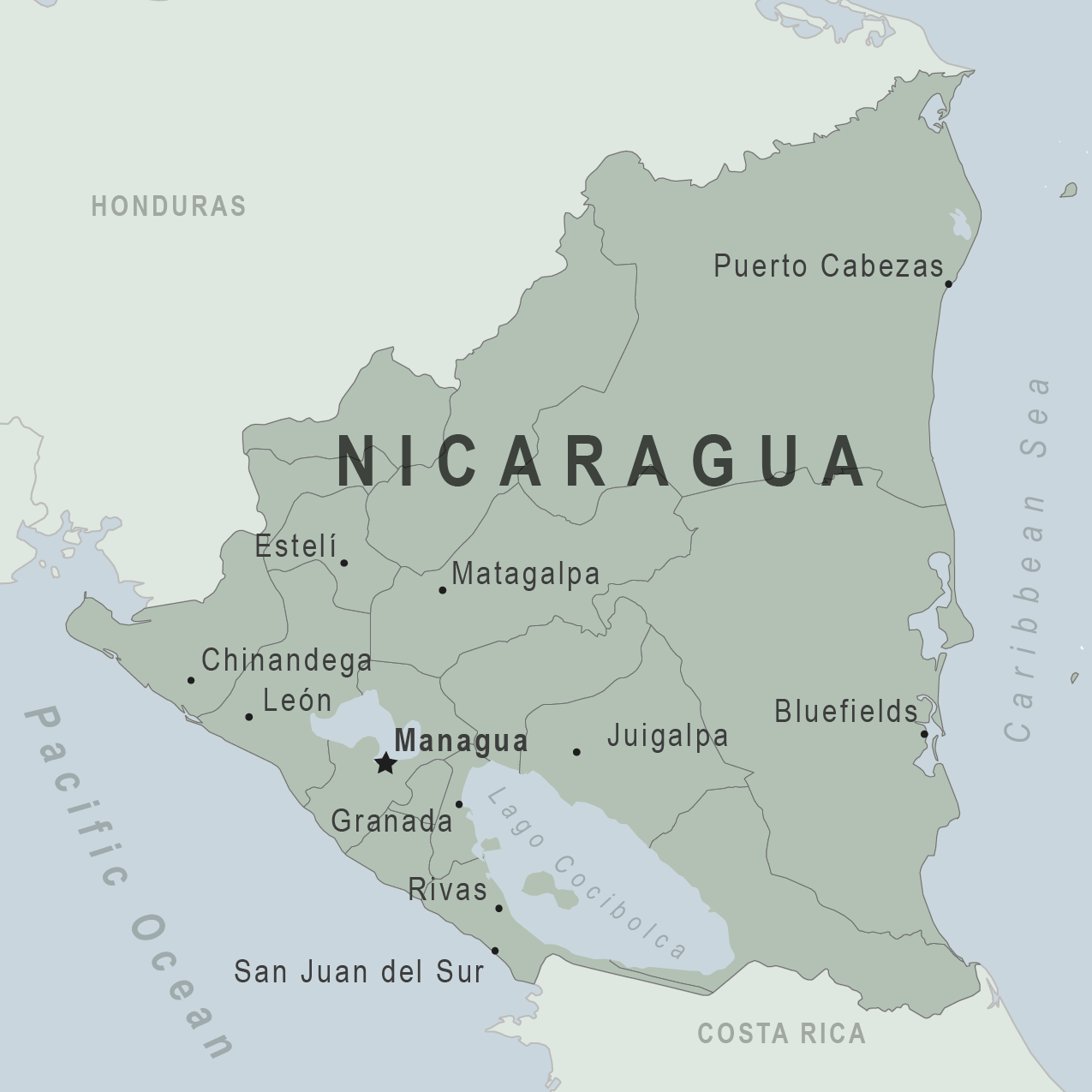
Be aware of current health issues in Nicaragua. Learn how to protect yourself.
Level 1 Practice Usual Precautions
- Dengue in the Americas April 18, 2024 Dengue is a risk in many parts of Central and South America, Mexico, and the Caribbean. Some countries are reporting increased numbers of cases of the disease. Travelers to the Americas can protect themselves by preventing mosquito bites. Destination List: Argentina, Brazil, Colombia, Costa Rica, Ecuador, including the Galápagos Islands, French Guiana (France), Guadeloupe, Guatemala, Martinique (France), Mexico, Nicaragua, Panama, Paraguay, Peru, Turks and Caicos Islands (U.K.), Uruguay
⇧ Top
Check the vaccines and medicines list and visit your doctor at least a month before your trip to get vaccines or medicines you may need. If you or your doctor need help finding a location that provides certain vaccines or medicines, visit the Find a Clinic page.
Routine vaccines
Recommendations.
Make sure you are up-to-date on all routine vaccines before every trip. Some of these vaccines include
- Chickenpox (Varicella)
- Diphtheria-Tetanus-Pertussis
- Flu (influenza)
- Measles-Mumps-Rubella (MMR)
Immunization schedules
All eligible travelers should be up to date with their COVID-19 vaccines. Please see Your COVID-19 Vaccination for more information.
COVID-19 vaccine
Hepatitis A
Recommended for unvaccinated travelers one year old or older going to Nicaragua.
Infants 6 to 11 months old should also be vaccinated against Hepatitis A. The dose does not count toward the routine 2-dose series.
Travelers allergic to a vaccine component or who are younger than 6 months should receive a single dose of immune globulin, which provides effective protection for up to 2 months depending on dosage given.
Unvaccinated travelers who are over 40 years old, immunocompromised, or have chronic medical conditions planning to depart to a risk area in less than 2 weeks should get the initial dose of vaccine and at the same appointment receive immune globulin.
Hepatitis A - CDC Yellow Book
Dosing info - Hep A
Hepatitis B
Recommended for unvaccinated travelers younger than 60 years old traveling to Nicaragua. Unvaccinated travelers 60 years and older may get vaccinated before traveling to Nicaragua.
Hepatitis B - CDC Yellow Book
Dosing info - Hep B
CDC recommends that travelers going to certain areas of Nicaragua take prescription medicine to prevent malaria. Depending on the medicine you take, you will need to start taking this medicine multiple days before your trip, as well as during and after your trip. Talk to your doctor about which malaria medication you should take.
Find country-specific information about malaria.
Malaria - CDC Yellow Book
Considerations when choosing a drug for malaria prophylaxis (CDC Yellow Book)
Malaria information for Nicaragua.
Cases of measles are on the rise worldwide. Travelers are at risk of measles if they have not been fully vaccinated at least two weeks prior to departure, or have not had measles in the past, and travel internationally to areas where measles is spreading.
All international travelers should be fully vaccinated against measles with the measles-mumps-rubella (MMR) vaccine, including an early dose for infants 6–11 months, according to CDC’s measles vaccination recommendations for international travel .
Measles (Rubeola) - CDC Yellow Book
Rabid dogs are commonly found in Nicaragua. If you are bitten or scratched by a dog or other mammal while in Nicaragua, there may be limited or no rabies treatment available.
Consider rabies vaccination before your trip if your activities mean you will be around dogs or wildlife.
Travelers more likely to encounter rabid animals include
- Campers, adventure travelers, or cave explorers (spelunkers)
- Veterinarians, animal handlers, field biologists, or laboratory workers handling animal specimens
- Visitors to rural areas
Since children are more likely to be bitten or scratched by a dog or other animals, consider rabies vaccination for children traveling to Nicaragua.
Rabies - CDC Yellow Book
Recommended for most travelers, especially those staying with friends or relatives or visiting smaller cities or rural areas.
Typhoid - CDC Yellow Book
Dosing info - Typhoid
Yellow Fever
Required for travelers ≥1 year old arriving from countries with risk for YF virus transmission. 1
Yellow Fever - CDC Yellow Book
Avoid contaminated water
Leptospirosis
How most people get sick (most common modes of transmission)
- Touching urine or other body fluids from an animal infected with leptospirosis
- Swimming or wading in urine-contaminated fresh water, or contact with urine-contaminated mud
- Drinking water or eating food contaminated with animal urine
- Avoid contaminated water and soil
Clinical Guidance
Avoid bug bites, chagas disease (american trypanosomiasis).
- Accidentally rub feces (poop) of the triatomine bug into the bug bite, other breaks in the skin, your eyes, or mouth
- From pregnant woman to her baby, contaminated blood products (transfusions), or contaminated food or drink.
- Avoid Bug Bites
Chagas disease
- Mosquito bite
Leishmaniasis
- Sand fly bite
- An infected pregnant woman can spread it to her unborn baby
Airborne & droplet
- Breathing in air or accidentally eating food contaminated with the urine, droppings, or saliva of infected rodents
- Bite from an infected rodent
- Less commonly, being around someone sick with hantavirus (only occurs with Andes virus)
- Avoid rodents and areas where they live
- Avoid sick people
Tuberculosis (TB)
- Breathe in TB bacteria that is in the air from an infected and contagious person coughing, speaking, or singing.
Learn actions you can take to stay healthy and safe on your trip. Vaccines cannot protect you from many diseases in Nicaragua, so your behaviors are important.
Eat and drink safely
Food and water standards around the world vary based on the destination. Standards may also differ within a country and risk may change depending on activity type (e.g., hiking versus business trip). You can learn more about safe food and drink choices when traveling by accessing the resources below.
- Choose Safe Food and Drinks When Traveling
- Water Treatment Options When Hiking, Camping or Traveling
- Global Water, Sanitation and Hygiene | Healthy Water
- Avoid Contaminated Water During Travel
You can also visit the Department of State Country Information Pages for additional information about food and water safety.
Prevent bug bites
Bugs (like mosquitoes, ticks, and fleas) can spread a number of diseases in Nicaragua. Many of these diseases cannot be prevented with a vaccine or medicine. You can reduce your risk by taking steps to prevent bug bites.
What can I do to prevent bug bites?
- Cover exposed skin by wearing long-sleeved shirts, long pants, and hats.
- Use an appropriate insect repellent (see below).
- Use permethrin-treated clothing and gear (such as boots, pants, socks, and tents). Do not use permethrin directly on skin.
- Stay and sleep in air-conditioned or screened rooms.
- Use a bed net if the area where you are sleeping is exposed to the outdoors.
What type of insect repellent should I use?
- FOR PROTECTION AGAINST TICKS AND MOSQUITOES: Use a repellent that contains 20% or more DEET for protection that lasts up to several hours.
- Picaridin (also known as KBR 3023, Bayrepel, and icaridin)
- Oil of lemon eucalyptus (OLE) or para-menthane-diol (PMD)
- 2-undecanone
- Always use insect repellent as directed.
What should I do if I am bitten by bugs?
- Avoid scratching bug bites, and apply hydrocortisone cream or calamine lotion to reduce the itching.
- Check your entire body for ticks after outdoor activity. Be sure to remove ticks properly.
What can I do to avoid bed bugs?
Although bed bugs do not carry disease, they are an annoyance. See our information page about avoiding bug bites for some easy tips to avoid them. For more information on bed bugs, see Bed Bugs .
For more detailed information on avoiding bug bites, see Avoid Bug Bites .
Stay safe outdoors
If your travel plans in Nicaragua include outdoor activities, take these steps to stay safe and healthy during your trip.
- Stay alert to changing weather conditions and adjust your plans if conditions become unsafe.
- Prepare for activities by wearing the right clothes and packing protective items, such as bug spray, sunscreen, and a basic first aid kit.
- Consider learning basic first aid and CPR before travel. Bring a travel health kit with items appropriate for your activities.
- If you are outside for many hours in heat, eat salty snacks and drink water to stay hydrated and replace salt lost through sweating.
- Protect yourself from UV radiation : use sunscreen with an SPF of at least 15, wear protective clothing, and seek shade during the hottest time of day (10 a.m.–4 p.m.).
- Be especially careful during summer months and at high elevation. Because sunlight reflects off snow, sand, and water, sun exposure may be increased during activities like skiing, swimming, and sailing.
- Very cold temperatures can be dangerous. Dress in layers and cover heads, hands, and feet properly if you are visiting a cold location.
Stay safe around water
- Swim only in designated swimming areas. Obey lifeguards and warning flags on beaches.
- Practice safe boating—follow all boating safety laws, do not drink alcohol if driving a boat, and always wear a life jacket.
- Do not dive into shallow water.
- Do not swim in freshwater in developing areas or where sanitation is poor.
- Avoid swallowing water when swimming. Untreated water can carry germs that make you sick.
- To prevent infections, wear shoes on beaches where there may be animal waste.
Leptospirosis, a bacterial infection that can be spread in fresh water, is found in Nicaragua. Avoid swimming in fresh, unchlorinated water, such as lakes, ponds, or rivers.
Keep away from animals
Most animals avoid people, but they may attack if they feel threatened, are protecting their young or territory, or if they are injured or ill. Animal bites and scratches can lead to serious diseases such as rabies.
Follow these tips to protect yourself:
- Do not touch or feed any animals you do not know.
- Do not allow animals to lick open wounds, and do not get animal saliva in your eyes or mouth.
- Avoid rodents and their urine and feces.
- Traveling pets should be supervised closely and not allowed to come in contact with local animals.
- If you wake in a room with a bat, seek medical care immediately. Bat bites may be hard to see.
All animals can pose a threat, but be extra careful around dogs, bats, monkeys, sea animals such as jellyfish, and snakes. If you are bitten or scratched by an animal, immediately:
- Wash the wound with soap and clean water.
- Go to a doctor right away.
- Tell your doctor about your injury when you get back to the United States.
Consider buying medical evacuation insurance. Rabies is a deadly disease that must be treated quickly, and treatment may not be available in some countries.
Reduce your exposure to germs
Follow these tips to avoid getting sick or spreading illness to others while traveling:
- Wash your hands often, especially before eating.
- If soap and water aren’t available, clean hands with hand sanitizer (containing at least 60% alcohol).
- Don’t touch your eyes, nose, or mouth. If you need to touch your face, make sure your hands are clean.
- Cover your mouth and nose with a tissue or your sleeve (not your hands) when coughing or sneezing.
- Try to avoid contact with people who are sick.
- If you are sick, stay home or in your hotel room, unless you need medical care.
Avoid sharing body fluids
Diseases can be spread through body fluids, such as saliva, blood, vomit, and semen.
Protect yourself:
- Use latex condoms correctly.
- Do not inject drugs.
- Limit alcohol consumption. People take more risks when intoxicated.
- Do not share needles or any devices that can break the skin. That includes needles for tattoos, piercings, and acupuncture.
- If you receive medical or dental care, make sure the equipment is disinfected or sanitized.
Know how to get medical care while traveling
Plan for how you will get health care during your trip, should the need arise:
- Carry a list of local doctors and hospitals at your destination.
- Review your health insurance plan to determine what medical services it would cover during your trip. Consider purchasing travel health and medical evacuation insurance.
- Carry a card that identifies, in the local language, your blood type, chronic conditions or serious allergies, and the generic names of any medications you take.
- Some prescription drugs may be illegal in other countries. Call Nicaragua’s embassy to verify that all of your prescription(s) are legal to bring with you.
- Bring all the medicines (including over-the-counter medicines) you think you might need during your trip, including extra in case of travel delays. Ask your doctor to help you get prescriptions filled early if you need to.
Many foreign hospitals and clinics are accredited by the Joint Commission International. A list of accredited facilities is available at their website ( www.jointcommissioninternational.org ).
In some countries, medicine (prescription and over-the-counter) may be substandard or counterfeit. Bring the medicines you will need from the United States to avoid having to buy them at your destination.
Malaria is a risk in some parts of Nicaragua. If you are going to a risk area, fill your malaria prescription before you leave, and take enough with you for the entire length of your trip. Follow your doctor’s instructions for taking the pills; some need to be started before you leave.
Select safe transportation
Motor vehicle crashes are the #1 killer of healthy US citizens in foreign countries.
In many places cars, buses, large trucks, rickshaws, bikes, people on foot, and even animals share the same lanes of traffic, increasing the risk for crashes.
Be smart when you are traveling on foot.
- Use sidewalks and marked crosswalks.
- Pay attention to the traffic around you, especially in crowded areas.
- Remember, people on foot do not always have the right of way in other countries.
Riding/Driving
Choose a safe vehicle.
- Choose official taxis or public transportation, such as trains and buses.
- Ride only in cars that have seatbelts.
- Avoid overcrowded, overloaded, top-heavy buses and minivans.
- Avoid riding on motorcycles or motorbikes, especially motorbike taxis. (Many crashes are caused by inexperienced motorbike drivers.)
- Choose newer vehicles—they may have more safety features, such as airbags, and be more reliable.
- Choose larger vehicles, which may provide more protection in crashes.
Think about the driver.
- Do not drive after drinking alcohol or ride with someone who has been drinking.
- Consider hiring a licensed, trained driver familiar with the area.
- Arrange payment before departing.
Follow basic safety tips.
- Wear a seatbelt at all times.
- Sit in the back seat of cars and taxis.
- When on motorbikes or bicycles, always wear a helmet. (Bring a helmet from home, if needed.)
- Avoid driving at night; street lighting in certain parts of Nicaragua may be poor.
- Do not use a cell phone or text while driving (illegal in many countries).
- Travel during daylight hours only, especially in rural areas.
- If you choose to drive a vehicle in Nicaragua, learn the local traffic laws and have the proper paperwork.
- Get any driving permits and insurance you may need. Get an International Driving Permit (IDP). Carry the IDP and a US-issued driver's license at all times.
- Check with your auto insurance policy's international coverage, and get more coverage if needed. Make sure you have liability insurance.
- Avoid using local, unscheduled aircraft.
- If possible, fly on larger planes (more than 30 seats); larger airplanes are more likely to have regular safety inspections.
- Try to schedule flights during daylight hours and in good weather.
Medical Evacuation Insurance
If you are seriously injured, emergency care may not be available or may not meet US standards. Trauma care centers are uncommon outside urban areas. Having medical evacuation insurance can be helpful for these reasons.
Helpful Resources
Road Safety Overseas (Information from the US Department of State): Includes tips on driving in other countries, International Driving Permits, auto insurance, and other resources.
The Association for International Road Travel has country-specific Road Travel Reports available for most countries for a minimal fee.
For information traffic safety and road conditions in Nicaragua, see Travel and Transportation on US Department of State's country-specific information for Nicaragua .
Maintain personal security
Use the same common sense traveling overseas that you would at home, and always stay alert and aware of your surroundings.
Before you leave
- Research your destination(s), including local laws, customs, and culture.
- Monitor travel advisories and alerts and read travel tips from the US Department of State.
- Enroll in the Smart Traveler Enrollment Program (STEP) .
- Leave a copy of your itinerary, contact information, credit cards, and passport with someone at home.
- Pack as light as possible, and leave at home any item you could not replace.
While at your destination(s)
- Carry contact information for the nearest US embassy or consulate .
- Carry a photocopy of your passport and entry stamp; leave the actual passport securely in your hotel.
- Follow all local laws and social customs.
- Do not wear expensive clothing or jewelry.
- Always keep hotel doors locked, and store valuables in secure areas.
- If possible, choose hotel rooms between the 2nd and 6th floors.
Healthy Travel Packing List
Use the Healthy Travel Packing List for Nicaragua for a list of health-related items to consider packing for your trip. Talk to your doctor about which items are most important for you.
Why does CDC recommend packing these health-related items?
It’s best to be prepared to prevent and treat common illnesses and injuries. Some supplies and medicines may be difficult to find at your destination, may have different names, or may have different ingredients than what you normally use.
If you are not feeling well after your trip, you may need to see a doctor. If you need help finding a travel medicine specialist, see Find a Clinic . Be sure to tell your doctor about your travel, including where you went and what you did on your trip. Also tell your doctor if you were bitten or scratched by an animal while traveling.
If your doctor prescribed antimalarial medicine for your trip, keep taking the rest of your pills after you return home. If you stop taking your medicine too soon, you could still get sick.
Malaria is always a serious disease and may be a deadly illness. If you become ill with a fever either while traveling in a malaria-risk area or after you return home (for up to 1 year), you should seek immediate medical attention and should tell the doctor about your travel history.
For more information on what to do if you are sick after your trip, see Getting Sick after Travel .
Map Disclaimer - The boundaries and names shown and the designations used on maps do not imply the expression of any opinion whatsoever on the part of the Centers for Disease Control and Prevention concerning the legal status of any country, territory, city or area or of its authorities, or concerning the delimitation of its frontiers or boundaries. Approximate border lines for which there may not yet be full agreement are generally marked.
Other Destinations
If you need help finding travel information:
Message & data rates may apply. CDC Privacy Policy
File Formats Help:
- Adobe PDF file
- Microsoft PowerPoint file
- Microsoft Word file
- Microsoft Excel file
- Audio/Video file
- Apple Quicktime file
- RealPlayer file
- Zip Archive file
Exit Notification / Disclaimer Policy
- The Centers for Disease Control and Prevention (CDC) cannot attest to the accuracy of a non-federal website.
- Linking to a non-federal website does not constitute an endorsement by CDC or any of its employees of the sponsors or the information and products presented on the website.
- You will be subject to the destination website's privacy policy when you follow the link.
- CDC is not responsible for Section 508 compliance (accessibility) on other federal or private website.
Suggestions

What you should know to travel to Nicaragua?
Nicaragua location.
Central America, between the Caribbean Sea (East), the Pacific Ocean (West), Honduras (North) and Costa Rica (South). Geographic coordinates: 13:00 North, 85:00 West.
WHAT’S NEW ON NICARAGUA ENTRY PROTOCOLS
The Government of Nicaragua has announced a key change to its travel protocols. Effective Thursday, June 16, 2022, fully-vaccinated travelers to Nicaragua will no longer have to take a COVID-19 test to enter the country.
Vaccinated travelers
The change in protocols states that travelers of all ages and nationalities should only provide at any of the country’s entry ports their vaccination card of two doses or more, independently of the year they were vaccinated.
In addition, those who have received two different doses or have applied only one shot of Sputnik Light or Janssen/J&J will also be eligible for entering with their vaccine card, record, or certificate.
Unvaccinated travelers
Unvaccinated travelers —both children and adults — will require a negative test that should be made within 72 hours prior to arrival. Those who are flying from Asia, Oceania, and Africa will have 92 hours before arriving to make their test.
The only test accepted is RT-PCR. All unvaccinated travelers will have to present digital or printed test results when arriving at the country’s border.
Accepted vaccine
All vaccines approved by the World Health Organization and by the Government of Nicaragua: Sputnik V, Sputnik Light, Pfizer, Moderna, AstraZeneca, Covishield, Soberana 02, Abdala, Janssen/Johnson & Johnson, Sinopharm, and Coviran.
What happens if a traveler shows signs of a fever or respiratory symptoms?
International tourists who have fever or respiratory symptoms upon arrival will not be allowed to enter the country. Nicaragua nationals who have a fever or respiratory symptoms will be allowed to enter the country and be sent to observe a strict quarantine, in keeping with to the biosafety protocol established by the Ministry of Health.
Is it necessary to fill out a form to enter the country?
Non-nationals will have to complete an online immigration form that is available on the official website of the Ministry of Foreign Affairs. It is recommended to complete this form at least 7 days before arrival.
The COVID-19 Protocols are sanctioned by the Government of Nicaragua through the Ministry of Health (MINSA).
What you need to know to schedule and receive your Covid-19 test results online in Nicaragua?
On March 16th, The Nicaragua Ministry of Health (MINSA), launched an online system that allows travelers to electronically schedule PCR-Covid-19 tests prior to travel outside of Nicaragua.
During the launch of the online system, the Secretary-General of the Nicaragua Ministry of Health, Carlos Sáenz explained that the test is administered at the Concepción Palacios Healthcare Complex in Managua
Monday- Friday 7:00 a.m. to 11:00 a.m. Tel: 2264-7630 ; 2264-7730, ext: 1388
When will the results be delivered?
COVID-19 test results are delivered from 3:00pm to 5:00pm the day the test was administered. Test results can be obtained electronically through the Ministry of Health COVID-19 testing system or in person at the Concepción Palacios Healthcare Complex in Managua.
What is the online link to schedule and view results of a COVID-19 test in Nicaragua?
https://serviciosenlinea.minsa.gob.ni/servicios/#/laboratorio
Process to schedule a COVID-19 test:
STEP 1: Select the icon that says, “Registration for a COVID-19 test” (REGISTRO PARA PRUEBAS COVID-19) this will take you to a lab registration intake form.
STEP 2: Fill in the registration form with general information of the traveler (name and surname, travel document number, telephone number, date of birth, address, or hotel)
STEP 3: Select the date that you would like to schedule your COVID-19 test.
Note: All COVID-19 tests must me taken a maximum of 72 hours prior to traveling.
STEP 4: After filling in the registration form save it and you will receive a confirmation message stating that you have successfully scheduled your COVID-19 test.
Note: Once saved the traveler must download or print his or her registration form and present it at the Concepción Palacios Healthcare Complex in Managua the day of the test.
STEP 5: On the day that the test will be administered please present a valid travel document (ID or passport) copy of the online registration form and the COVID-19 test payment voucher.
Note: COVID-19 tests can be paid online through an electronic bank transfer, at any branch of BANPRO bank or at the Concepción Palacios Healthcare Complex.
Process to download COVID-19 test results:
STEP 1: Using the Nicaragua Ministry of Health COVID-19 online testing system select the icon that says “Results” (RESULTADOS).
STEP 2: Enter the number of the travel document you used to schedule your test as well as the sample code you were given when the test was administered.
STEP 3: Select the language and click download.
To view or download the validation of the document, click on Validation, add the unique validation code that is found at the bottom of the document, that way the result of the person who took the test will be shown.
Process to validate COVID-19 test results:
STEP 1: Using the Nicaragua Ministry of Health COVID-19 online testing system select the icon that says “validation” (Validación).
STEP 2: Enter the Unique validation Number (Bar code) located at the bottom of your test results and click the validate button.
Are there commercial flights to Nicaragua?
Nicaragua does not have an imposed lockdown or curfew. Once a traveler has fulfilled all the biosafety requirement to enter Nicaragua, they are free to move about the country, but follow up calls from the Ministry of Health personnel should be expected throughout their stay and authorities encourage all travelers to follow COVID-19 biosafety measures such as: face masks, constant hand washing, use of an alcohol-based hand sanitizer and social distancing.
Yes. You can fly to Managua via Miami, Houston, Ford Lauderdale, San Salvador, Costa Rica, Mexico and Panamá with Avianca, Spirit Airlines, United Airlines, Aeroméxico, Copa Airlines and SANSA.
Flights schedules are as follow:

Note: In Nicaragua you can fly locally using La Costeña airlines.
Does Nicaragua have biosafety protocols?
With the new COVID-19 reality, the Nicaraguan Tourism Board (INTUR) in alliance with private entities has designed and implemented a series of biosafety protocols that seek to support the continued functioning of the tourism sector, provide quality tourism services, and promote safe travel habits.
Why is it safe to travel to Nicaragua?
In January of 2021 Nicaragua obtained the Safe Travel Seal, awarded by The World Travel & Tourism Council (WTTC) and the United Nations World Tourism Organization (UNWTO) in recognition of the rigorous application of biosafety measures for the prevention of Covid-19 in the tourism sector of the country..
“Nicaragua awaits you with open arms and we encourage you to implement the biosafety measures, such as constant hand washing use of an alcohol-based hand sanitizer and of course social distancing”.

Is Nicaragua Safe To Visit In 2024? Safety Tips From My First-Hand Experience
- Post author: Nicoletta
- Reading time: 47 mins read
- Post last modified: February 10, 2024
- Post comments: 0 Comments

Nicaragua is one of the least explored countries in Central America. Before visiting, I heard different stories and people telling me how dangerous it was and that I should’ve been careful. So, I went to travel to Nicaragua to experience it by myself.
After spending a month in the country , I can say Nicaragua is safe to travel . While you have to be more cautious and use your common sense, it’s one of the safest countries in the Americas.
In this article, I’ll give you top safety tips from my first-hand experience.
✈ Travel Resources For Your Trip ✈
Here are some of my favorite travel resources I use for my travel adventures.
Can I Travel To Nicaragua Right Now?
Yes, you can travel to Nicaragua right now. And I highly recommend you do so. Nicaragua is a stunning country with friendly people, incredible nature, and interesting culture. It’s one of my favorite countries I’ve visited. It’s less crowded than the neighboring Costa Rica and very unique.
General Statistic For Safety In Nicaragua
To help you understand how safe Nicaragua really is, I’ve got some statistics and official world safety rankings for you.
Nicaragua is ranked #123 on the Global Peace Index among all countries in the world (e.g., safer than the US, Mexico, Brazil, Israel, Turkey , and other popular travel destinations).
While it’s not the safest country to travel to (well, it’s not Iceland), I felt safe; locals are friendly, and using your common sense will keep you safe.
Is Nicaragua Safe For Solo Female Travelers?
Yes , Nicaragua is safe for solo female travelers. But if you decide to travel individually, you should follow these 2 simple rules : don’t walk alone at night, and be aware of taxi scams (don’t take a taxi at night, especially in Managua).
Taking this advice and using your common sense will keep you safe as a solo female traveler in Nicaragua. I met two women traveling solo in Nicaragua , and they told me they felt safe most of the time. So you shouldn’t be afraid too much.
Is Nicaragua Safe For American Tourists?
Yes, Nicaragua is safe for American tourists. You’ll especially feel safe in cities such as Granada , Leon , and San Juan del Sur . I recommend asking your hotel to call a taxi and not walking alone at night. These two things will keep you extra safe in Nicaragua.
Safety For Backpackers In Nicaragua
Yes, Nicaragua is safe for backpackers. I was backpacking in Nicaragua with my boyfriend for a month and felt mostly safe . We took taxis, buses, and boats, and everything went fine. My general advice is not to walk outside or take a taxi anywhere at night.
Otherwise, Nicaragua is a beautiful country, perfect for backpackers to explore.

👉 READ ALSO: Best Of Nicaragua Itinerary: 7 Days With Map & Tips
9 Safety Tips For Traveling Nicaragua: My Experience
As I mentioned above, I traveled to Nicaragua for a month with my boyfriend. Thanks to the time, I’ve gathered some of the best safety tips and got a whole experience in the country.
With that said, here are my top 9 safety tips for you if you want to experience this beautiful country.
1. Don’t Walk Outside At Night Alone
Walking outside at night, especially as a solo female traveler, is unsafe in Nicaragua. Make sure you join a group of travelers if you want to go out.
It also depends on the place where you’re at. For instance, I felt safe walking around at night in Granada and Leon . I didn’t feel safe at night in Managua and Bluefields . So always plan accordingly.
💡 PRO SAFETY TIP: Avoid walking in places such as Bluefields and Managua or hidden neighborhoods at night.
2. Don’t Take A Taxi At Night
Taking a taxi at night can be dangerous in Nicaragua. I’m not saying not to take it, but you should be cautious. Tell the taxi driver even 5 times where you want to go and make sure he understands. While driving to your destination, check Google Maps to see if he is driving you where you told him.
Generally, I didn’t have any issues with taxi drivers in Nicaragua. You usually also get a feeling of the person before entering the taxi, whether the driver is fair or looks a bit suspicious.
💡 PRO SAFETY TIP: If you need to take a taxi at night, get a taxi driver recommended by local friends or tell your hotel to call a taxi for you . You can trust these and avoid any dangerous situations.

3. Avoid Taking A Night Bus
This is something to do if you want to be extra safe . If it’s a night bus from bigger companies such as Tica Bus, it’s fine to take it . I’m talking about the local buses in Nicaragua , especially on the route to and from Bluefields .
I took a night bus from Bluefields to Managua , and while I felt safe throughout the journey, this route is famous for drug traffic . The story goes that police stopped our bus 15 minutes after departing Bluefields and held us there for almost 2 hours. They found drugs in a local’s luggage and detected her.
Only after I thought about what would happen if someone stuck drugs into my backpack without me knowing, I would’ve been in trouble and perhaps don’t leave Nicaragua for a decade. That woman was imprisoned for 12 years .
💡 PRO SAFETY TIP: Always watch your stuff when taking local buses, and don’t take the night bus from Bluefields for extra safety.
4. Don’t Walk Around With Valuables
Avoid walking around with too many valuable things. If you have a phone, that’s fine, sure. But be sure to have it in your pocket or hold it tight. Always watch your belongings and keep your backpack closed all the time.
💡 PRO SAFETY TIP: Don’t wear expensive jewelry & expensive clothes – this makes you stand out, and you’ll be like a magnet for thefts.
5. Don’t Leave A Lot Of Cash Inside Your Hostel/Hotel Room
Luckily this didn’t happen to me, but I’ve heard stories from other travelers that they left cash in their room, and after they came back, it was gone. Housekeeping staff took advantage of seeing the cash and just took it while cleaning their room.
So either tell the reception you don’t want your room cleaned. Or my advice would be to hide the cash as well as you possibly can . If you put the cash into a rare place , nobody will find it. The housekeeping also only has a little time to look for it. So it’s just a matter of hiding your cash well.
💡 PRO SAFETY TIP: Store your cash in a bunch of clothes, in your hygiene purse, or a book and hide that book in a suitcase stuffed with clothes.
6. Don’t Leave Your Stuff Unattended On The Beach
Similarly, don’t leave your belongings unattended on the beach. I’ve also heard stories of travelers leaving a book with cash on the beach and going for a swim. After 10 minutes, when they came back, the book was there, and the cash was gone.
But come on; this is a bad idea to leave your cash in a book standing alone and walking away. Be smart ; either don’t take much cash with you or none at all . After all, you’re going for a swim and don’t need a lot of cash or many belongings with you.
💡 PRO SAFETY TIP: Ask fellow travelers to watch your stuff if you want to leave it on the beach alone for a while.

7. Don’t Believe Everything What You Hear To Avoid Scams
Locals are clever, sometimes too smart. And they’re very good at scamming people. Always double-check and think twice when you get some information from locals.
I was at the bus terminal in Rivas , traveling from Ometepe to San Juan del Sur. I came to Rivas in a taxi and wanted to change to Rivas and take a bus to San Juan del Sur.
After arriving at Rivas bus terminal, I didn’t even properly stand on the ground with both feet, and locals started yelling at me , offering me a taxi ride to San Juan del Sur and other locations. When I told some I wanted to go to San Juan, they said there was no bus . They claimed the last bus left 5 minutes ago, and the last possible bus only left at night around 10:00 pm (it was 4:00 pm).
I just ignored them and walked towards the buses to double-check . After walking around and asking individual buses and people waiting there whether there was a bus to San Juan del Sur, I found a bus with passengers about to leave in 3 minutes. So I took it.
💡 PRO SAFETY TIP: Locals take advantage of you being new in the country and not knowing things . So don’t listen to everyone . Always double-check first whether it’s true what they’re saying. Take your time to think, and only after taking action.
8. Think Twice Before You Take Action
As I’ve mentioned, take your time to think and re-evaluate a situation before you take action . This applies to everything you do in Nicaragua. If a taxi driver tells you a price that seems too high for you, either negotiate or walk away and find another one.
If somebody wants to exchange your dollars for Nicaraguan Cordoba (local currency) on the street, think before you do so. First, ask him how much would you get and then double-check online at XE.com if the amount is correct.
In case anyone tells you there is no bus to your destination, double-check first . Perhaps it’s not true, and they tell you because they can charge you more for the ride.
💡 PRO SAFETY TIP: People sometimes put pressure on you to make a decision right away. You don’t have to. Take as much time as you need , think first, evaluate whether it’s the right thing to do, and only then take action .
9. Use Common Sense
I know this sounds cliche, but it’s my most important advice when traveling to any country, not just Nicaragua. Listening to yourself and your feelings and using common sense will tell you something is wrong.
We, as human beings, are naturally careful when it comes to our safety . So your body will tell you. You might naturally feel less safe in Bluefields because some people might have that scary or unsafe vibe . You’ll know somebody is lying to you because they put too much unnecessary pressure on you.
💡 PRO SAFETY TIP: So think and use your common sense. It’ll keep you safe while traveling to Nicaragua.
General Safety Tips For Traveling Nicaragua
Now that you have my insights into safety when traveling in Nicaragua let’s talk about general safety tips such as entry requirements, getting around, health risks, scams and crime in Nicaragua, and money safety.
All these tips will keep you safe while traveling in Nicaragua and help you avoid all possible troubles and scams . So keep reading.
Nicaragua Entry Requirements
First of all, check if you need Visa to travel to Nicaragua. You can do so by clicking this link and seeing all the necessary documents and visas you need for Nicaragua. Or click on the box below and see what you need to enter Nicaragua from your country of residence.
Furthermore, there are general entry requirements to enter Nicaragua, except for Visa:
- Fill Out Online Entry Form
- Entrance fee of $14
- Valid Passport
- Confirmation of your hotel/hostel stay
To enter Nicaragua, you must complete this form online before traveling. It asks you for your personal information, and it’s for the government to track who is entering the country and when is your approximate time you’ll leave.
You’ll also have to pay $14 to enter the country (as of 2023). Everyone must pay this general entry fee when crossing the border or arriving at an international airport in Managua.
Additionally, you need a valid passport (make sure it’s not going to expire in the next 6 months) and a confirmation of your hotel/hostel stay .
👉 READ ALSO: How To Get From Costa Rica To Nicaragua – further tips for border crossing
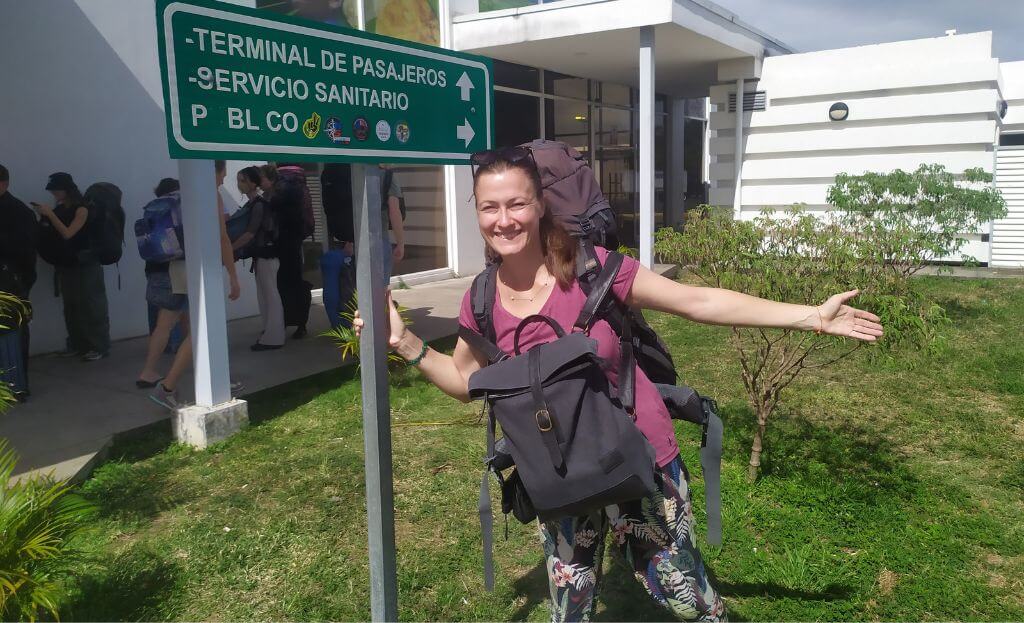
Getting Around Nicaragua – Taxis & Buses
MEDIUM RISK
Taking a taxi in Nicaragua is safe . Don’t Uber ; it can be subject to many scams . Instead, take a regular taxi . The safest is to let your hotel or hostel reception staff call a taxi for you. They work with particular taxi drivers, so you know you can rely on them, and they’ll drive you safely to your destination.
If you’re in a city taking a taxi on your own, tell the driver even 5 times where you want to go . Then check Google Maps while driving to see if he’s going in the right direction.
💡 PRO TIP: Make sure to negotiate the price before hopping into the taxi . Agree on the exact price you’ll make and try to make it lower (negotiate). Once you agree on a specific price with the driver, get into the taxi. Only enter a taxi knowing/agreeing on the price before. Otherwise, the drivers will take advantage of it and charge you more .
Is Public Transportation Safe In Nicaragua?
Public transportation is generally safe in Nicaragua . You should know, though, that the bus drivers drive like crazy . They drive very fast , and the road isn’t in the best condition, so it gets bumpy (I’m mainly talking about the bus route Managua – Bluefields). Yet, don’t worry, it’s safe.
If you take ferries and boats , it might look unsafe , too. These ferries and boats don’t have extra safety measures; they give you a lifevest, that’s it. The sea gets rough , so take a pill against sea sicknesses if you need. But generally, captains check the weather , and they often cancel the boat rides if the weather conditions are bad. So you shouldn’t be worried.
💡 PRO TIP: Be aware of drug traffic on the Carribean coastline of Nicaragua. Watch your backpack and belongings all the time when taking public transportation.
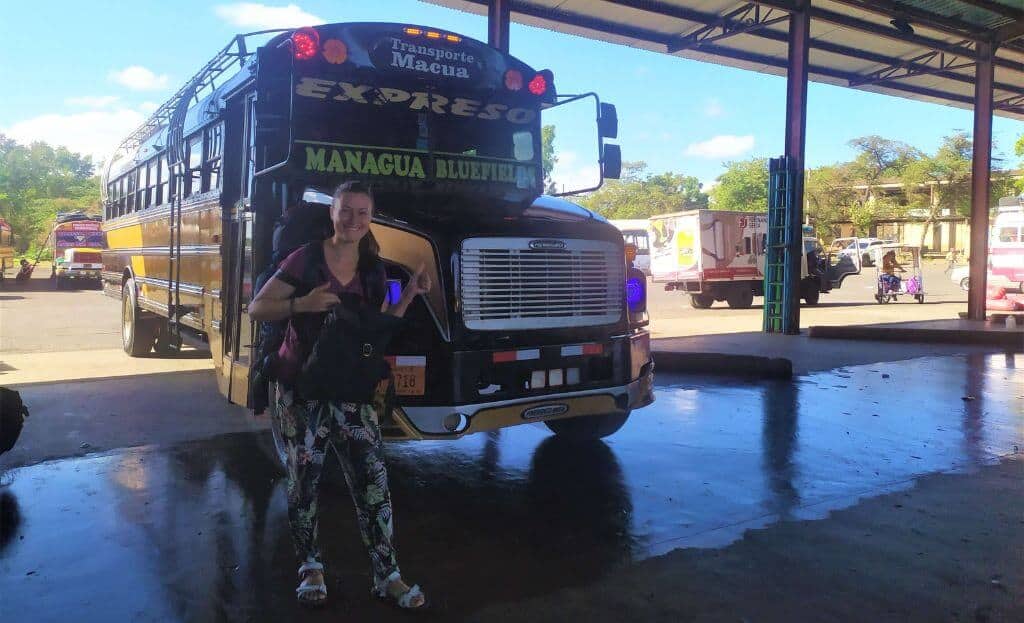
Risk Of Natural Disasters In Nicaragua
There is a number of potential natural disasters in Nicaragua. The main ones are:
- Volcano eruptions
The hurricane season in Nicaragua is between June and November . Some hurricanes have caused a lot of damage, while some were of minor importance. So check the weather forecast and news before traveling to avoid this natural disaster.
Nicaragua is a land of volcanoes . There are 19 altogether, and 7 volcanoes are still active . The last volcano eruption in Nicaragua was in 2012. While it shouldn’t put you off visiting this beautiful country, you should be aware of it, too.
Too much rain and hurricanes can cause floods in the country. This might be an additional natural threat when traveling to Nicaragua.
Health Risks In Nicaragua
As for health risks, malaria is a common disease in Nicaragua. While it’s nothing to fear, you should be aware of it.
You might also face gut health issues , such as diarrhea and stomach sickness . Make sure to eat in clean spaces . Avoid drinking tap water and raw milk/dairy products.
As an experienced traveler, you know you sometimes can’t avoid feeling sick on the road. So if it happens, don’t panic . Stay calm and in bed for a day or two; relax your body , and it’ll be fine. If not, see a doctor.
Nicaragua has great medical services , and the hospital in Managua (capital city) is amazing. Many people travel here specifically to get cheaper treatments and surgeries.
Is It Safe To Drink Tap Water In Nicaragua?
Tap water in Nicaragua isn’t safe to drink . Honestly, I didn’t even try it and always bought water bottles. Drinking tap water in Nicaragua may cause gut problems and diarrhea , so avoid it.
Crime In Nicaragua
MEDIUM – HIGH RISK
You should be aware of the high crime risk in Nicaragua. But again, please don’t let it put you off visiting this stunning country. The danger is everywhere globally; the best precaution is to know about it and behave accordingly.
The most common crime cases in Nicaragua are:
- drug smuggling
- express kidnapping
Drug smuggling is widespread on the Caribbean coast of Nicaragua . Bluefields is the drug hub where all the drug traffic occurs. That’s why I told you to avoid taking the night bus from there. Also, it’s dangerous walking at night on the streets of Bluefields. Throughout the day, I felt safe.
Theft is also common in Nicaragua. But if you use your common sense and follow the safety tips I gave you earlier in this article, you’ll be fine.
Assault and express kidnapping may also occur. Avoid walking in hidden streets without people and tourists. Stay in the common areas of any city and generally avoid walking/traveling around at night in Nicaragua.
Armed gangs are common in northern Nicaragua , the border with Honduras. So be aware of that, too. You’ll be fine if you cross the border with a local travel supplier or an official bus company.
Pickpockets & Scams In Nicaragua
There is a high risk of pickpockets in Nicaragua, too. But again, follow the safety tips I gave you from my experience and use your common sense . You’ll be fine this way. I believe pickpocketing happens when people don’t care and walk around with an open backpack or leave their phone/belongings unattended.
The most common scams in Nicaragua are:
- money scams
A taxi scam happened to me. A taxi driver charged us 10 times more for a ride because he claimed it was more expensive at night to drive, and he also had to wait for us to arrive on a ferry. We got this taxi driver recommended by our friends, so I didn’t even negotiate the price before as I believed our friends recommended us a fair driver. But, well, things happen regardless.
💡 PRO TIP: Always negotiate the price before entering a taxi. This way, you’ll avoid any taxi scams.
Another common scam in Nicaragua is a money scam . Think of people giving you a bad exchange rate in an office, fake bank notes , or on the street or giving you a wrong change . Keep reading the section below for money scams if you want to learn more.
Money Safety In Nicaragua
Nicaragua’s most common money scams are fake bank notes and wrong exchange rates .
Fake Bank Notes When Exchanging Cash
Random people are standing/sitting on the streets that will offer you local cash in exchange for your dollars. Be very careful. I saw people doing these money exchanges, and I did it once, too.
We were in a taxi driving to our hotel in Managua and needed to change money to pay the taxi driver. We trusted this guy as he drove us before, and he pulled over on the street and helped us exchange the money with the guy standing there. But I think I wouldn’t do this cash exchange alone.
💡 PRO TIP: I would avoid exchanging cash on the streets as the bank notes might be fake . If you exchange money, make sure it’s an official exchange place . Also, check the rate online on XE.com before and then count whether they gave you the exact cash it was supposed to be.
ATM Withdrawals & Cash
It’s safe to use ATMs in Nicaragua. I recommend withdrawals from ATMs in bigger shopping malls or safer cities such as Granada and Leon. If you plan to travel to remote areas such as the Carribean Coast and the Corn Islands, withdraw cash before.
💡 PRO TIP: Calculate how much you need to explore the country for the number of days you’ll spend there. Exchange the appropriate amount . Avoid carrying too much cash around.
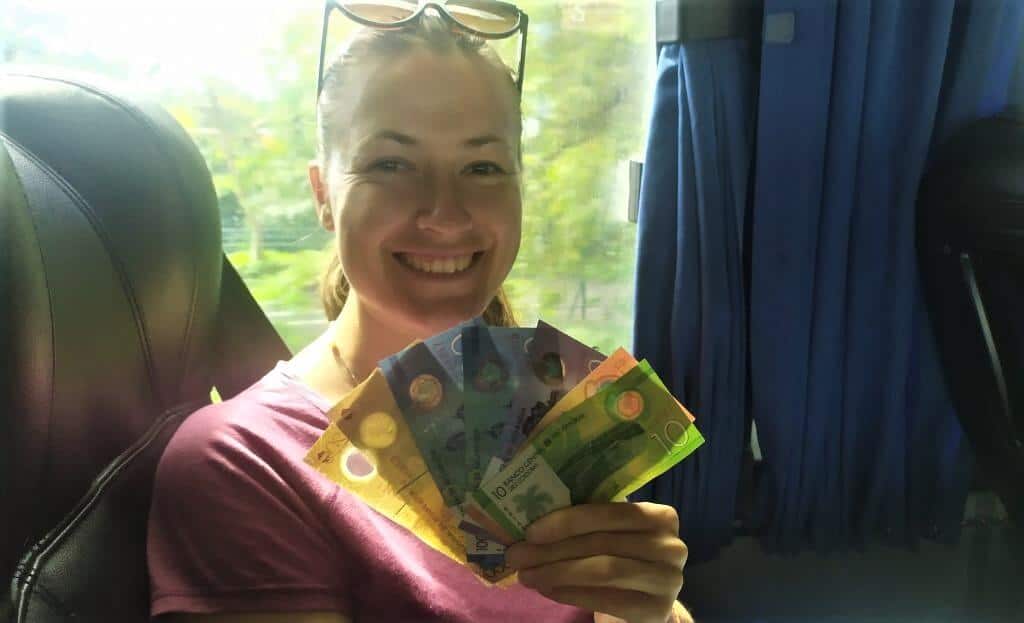
What Is The Safest Part In Nicaragua? Safest Places In Nicaragua
As with all countries, Nicaragua has its safe places and not-so-safe ones. If you want to be extra safe and avoid any trouble while traveling in the country, I recommend visiting the safe places.
The safest part of Nicaragua is the western part of the country , the Pacific coastline, and cities such as Leon, Granada, Popoyo, San Juan del Sur, and Ometepe Island.
Here is a list of the safest places in Nicaragua . I visited all of them and felt super safe throughout my stay.
✅ GRANADA – Granada is a stunning, rather small colonial town, and I consider it to be the safest place in Nicaragua. It’s a beautiful town with many facilities, beautiful hotels, great cafes, and many attractions, and it always feels safe. The people are super friendly and engaging, and the community helps each other.
👉 READ ALSO : Where To Stay In Granada Nicaragua
✅ LEON – Leon, located in the northern part of Nicaragua, is another safe place to visit. It’s the second biggest city in the country (after Managua), and while it has its sketchy neighborhoods, staying in the city center is very safe.
👉 READ ALSO : Where To Stay In Leon Nicaragua
✅ POPOYO – Popoyo is a small village on the Pacific coast of Nicaragua. It’s the main surfing hub and a great destination to relax and enjoy the quietness. It’s a very remote place, slightly difficult to get to, and one of the country’s safest places.
👉 READ ALSO : Where To Stay In Popoyo Nicaragua – one of the best surfing destinations worldwide
✅ SAN JUAN DEL SUR – San Juan is another touristy area, and most people visit it when traveling in Nicaragua. It’s a main beach destination and a great place to try surfing, too.
✅ OMETEPE – Another super-safe place in Nicaragua is Ometepe Island. As with Granada, I felt the safest in Ometepe. The locals are nice and friendly, and I didn’t feel danger at any corner. It’s a great destination to experience adventure, go hiking, and spend time in beautiful nature.
👉 READ ALSO : Where To Stay In Ometepe & 11 Unique Things To Do On Ometepe Island
✅ CORN ISLANDS – Corn Islands in the Caribbean Sea are a true paradise. Little Corn Island is by far the most beautiful island I’ve visited (that’s not a joke). Locals are super friendly, always smiling; it’s another world, calm and relaxing. So if you want a proper beach vacation, visit the Corn Islands as one of the safest places in Nicaragua.
Disclaimer: I do have to mention that there is some drug traffic around these islands and Bluefields, but it didn’t affect me in any way when I was there.
👉 READ ALSO : How To Get To Corn Island From Managua

What Should You Avoid In Nicaragua? Less Safe Places In Nicaragua
You should avoid two things in Nicaragua: walking outside (especially alone) and taking a taxi at night.
With that said, there are less safe places in Nicaragua. I wouldn’t say you should specifically avoid these places. But I consider them less safe than the places I mentioned above. You have to be more careful when visiting the following places in Nicaragua.
📍 BLUEFIELDS – Bluefields is commonly known as the drug hub in Nicaragua. There is a lot of drug traffic not just in Bluefields but the entire Caribbean coast. With that, some danger arises naturally. I felt safe in Bluefields during the day. But it’s really dangerous walking around at night. So please don’t do it; even locals don’t do so.
👉 READ ALSO: How To Get From Managua To Bluefields
📍 MANAGUA – The capital city of Nicaragua, Managua, is quite controversial. While getting around in the city center is safe, some parts can be dangerous. But as a traveler, you rarely end up in these hidden and dangerous areas. So if you stay within the city center and avoid walking around at night, you’ll be fine.
👉 READ ALSO : How To Get From Costa Rica To Nicaragua (Managua)
📍 SAN CARLOS – I have yet to go to San Carlos myself, but I’ve heard from many travelers that it’s less safe than other areas. It still is common to visit it while traveling in Nicaragua. It’s a jungle area, so be aware of potential health risks and theft in remote areas. But again, if you use your common sense, you’ll be fine.

I’ve also answered some of the most frequently asked questions below to give you even more information. So check them out.
Is Costa Rica Safer Than Nicaragua?
Costa Rica is slightly safer than Nicaragua because it’s a major tourist country in Central America. Generally, Costa Rica and its moto ‘Pura Vida’ has welcomed tourists and kept them safe. While Nicaragua is a safe country, there are things to consider that Costa Rica handles better, such as walking at night or taxi services.
Is It Safe To Live In Nicaragua?
Yes, Nicaragua is safe to live in. Generally, it depends on where you choose to live and the people you’re surrounded by. Nicaragua’s safest places to live are Leon, Granada, San Juan del Sur, and the Corn Islands.
I’ve met a Canadian couple who moved to and lived in Nicaragua for about 2 years. They told me they were the happiest there and always felt safe. Despite a hurricane, they stayed there and could sustain their lives.
Is Managua Nicaragua Safe?
Yes , Managua is safe in the center . The outskirts of Managua are pretty sketchy , so I recommend avoiding these places. To be honest, Managua felt the most unsafe of all places in Nicaragua to me. But the center was fine.
WRAP-UP: Safety In Nicaragua
Taking all of this advice into consideration, Nicaragua is a safe destination to travel to . While it has some crime rate and dangerous parts, if you follow these safety tips from my article, you’ll be fine whether you travel the country as a backpacker or a solo woman traveler. Most importantly, use your common sense, and you’ll be fine.
If you have any questions or need a customized travel itinerary, contact me at info(at)voicesoftravel.com . I’ll gladly help you.
Happy Travels!
More Tips For Nicaragua Travel
Looking to visit more places in Nicaragua? Check out my related articles:
Nicaragua Backpaking Itinerary For 7 Days
11 Unique Things To Do On Ometepe Island Nicaragua
Where To Stay In Ometepe Nicaragua
Where To Stay In Granada Nicaragua
Where To Stay In Leon Nicaragua
How To Get From Costa Rica To Nicaragua
How To Get To Corn Island From Managua
Is It Safe To Fly From Lima To Cusco? Revealed!

About the author: Nicoletta is a travel enthusiast and passionate language learner. While traveling, she loves to connect with locals using her language skills to learn about new cultures. Look for her skiing, hiking in the mountains, or exploring new destinations as she designs travel itineraries for her clients.
NICARAGUA : Interested in more articles for Nicaragua? Check out my Nicaragua Travel Page .

You Might Also Like
![travel safe nicaragua Read more about the article How To Get Around North Macedonia: Buses, Taxis & Driving Tips [2024]](https://voicesoftravel.com/wp-content/uploads/2024/01/how-to-get-around-North-Macedonia-buses-taxis-prices1-1-300x213.jpg)
How To Get Around North Macedonia: Buses, Taxis & Driving Tips [2024]
![travel safe nicaragua Read more about the article 11 Best Things To Do On Ometepe Island Nicaragua: Ultimate Guide [2024]](https://voicesoftravel.com/wp-content/uploads/2023/03/things-to-do-ometepe-island-nicaragua-300x213.jpg)
11 Best Things To Do On Ometepe Island Nicaragua: Ultimate Guide [2024]
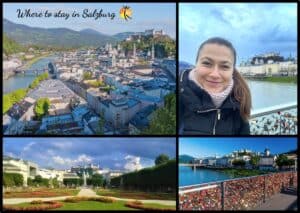
Where To Stay In Salzburg: Best Areas & Hotels For Each Traveler In 2024
Leave a reply cancel reply.
You must be logged in to post a comment.
Update April 12, 2024
Information for u.s. citizens in the middle east.
- Travel Advisories |
- Contact Us |
- MyTravelGov |
Find U.S. Embassies & Consulates
Travel.state.gov, congressional liaison, special issuance agency, u.s. passports, international travel, intercountry adoption, international parental child abduction, records and authentications, popular links, travel advisories, mytravelgov, stay connected, legal resources, legal information, info for u.s. law enforcement, replace or certify documents.
Share this page:
Learn about your destination
Take 90 seconds for safer travel.
Travel Advisory Levels
Enroll in step.

Subscribe to get up-to-date safety and security information and help us reach you in an emergency abroad.
Recommended Web Browsers: Microsoft Edge or Google Chrome.
External Link
You are about to leave travel.state.gov for an external website that is not maintained by the U.S. Department of State.
Links to external websites are provided as a convenience and should not be construed as an endorsement by the U.S. Department of State of the views or products contained therein. If you wish to remain on travel.state.gov, click the "cancel" message.
You are about to visit:
- English (EN)
- Español (ES)
- Português (BR)

Is Nicaragua Safe? Crime Rates & Safety Report
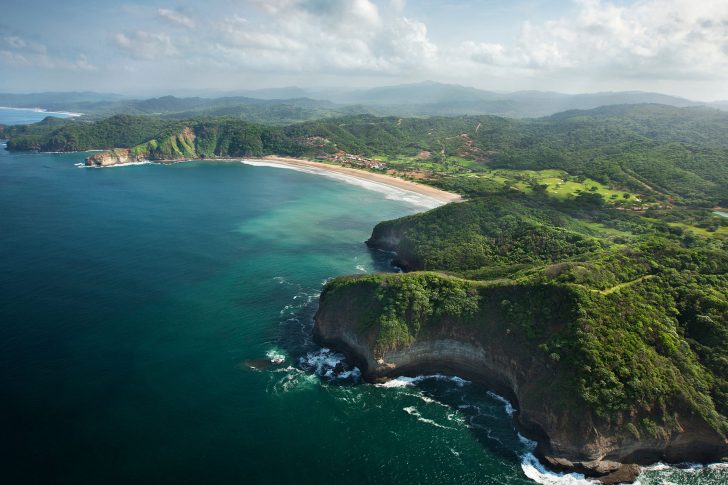
- Nicaragua : Safety by City
Nicaragua is a country located in Central America.
Apart from the natural beauties it boasts which make this country a paradise for nature lovers, it has coastlines on both the Caribbean Sea, in the east, and the North Pacific Ocean, in the west for anyone looking to just relax by the crystal blue waters.
Nicaragua has the title of the largest country in Central America and the largest freshwater body in Central America, Lago de Nicaragua is located here.
And with nearly one-quarter of the nation’s population living in the Nicaraguan capital Managua, it is the second metropolitan area in Central America.
Out of many reasons the tourists come and visit this country, the biggest one is love for nature, and this country offers an abundance of it.
There are the impressive colonial cities of Granada and Leon, the island of Ometepe and the Mombacho volcano for hiking and trekking, the coffee farm region of Jinotega and Matagalpa in the mountainous regions, while the gorgeous surf beaches of the Pacific Coast go without saying.
The Rio San Juan area, which is the largest rainforest north of the Amazon, is rapidly becoming a largely popular eco-tourist destination, and its biodiversity is attracting nature lovers all around the world at the speed of light.
- Warnings & Dangers in Nicaragua
OVERALL RISK: MEDIUM
Nicaragua is relatively safe to visit, but you should keep in mind that petty theft, as well as violent crimes, are extremely common here, so all precaution measures should be taken.
TRANSPORT & TAXIS RISK: MEDIUM
Taking public transport at night is highly advised against, due to the presence of criminals, both on public transport and on the roadways. Calling a taxi, or sharing a taxi with another person is far safer and common.
PICKPOCKETS RISK: HIGH
There is an extreme threat to petty crime. Pickpockets operate mainly in the major cities of Nicaragua. You should be extremely careful, especially in markets. Take as little as possible with you and never carry your money in a purse or a back pocket.
NATURAL DISASTERS RISK: MEDIUM
As far as natural disasters go, there are a couple of them hitting Nicaragua, such as earthquakes that can happen at any time. Then there is the hurricane season that lasts from June to November and the rainy season that often leads to floods. There are some active volcanoes in Nicaragua, the most dangerous one being San Cristobal which has been active since December 2012.
MUGGING RISK: HIGH
There have been reports of unauthorized taxis kidnapping people for ransom. Muggings, robberies, and rapes are also common. Be extremely careful.
TERRORISM RISK: LOW
Even though there haven't been any terrorist attacks in Nicaragua's recent history, they shouldn't be ruled out. Be aware of your surroundings at all times.
SCAMS RISK: HIGH
Like in every country taxi drivers might try to overcharge you. Apart from that, double check your change and negotiate everything in advance. Tourists are strongly encouraged not to use public ATMs, or if they do, not to flash their credit cards publicly. There have been many reports of credit card fraud in Nicaragua, as well as reports of extortion calls occurring.
WOMEN TRAVELERS RISK: MEDIUM
Women traveling solo are advised to be careful around men, even in front of employees at hotels, shops, and men providing any kind of tourist services. Many women have been sexually assaulted at the beaches of Nicaragua, so they are strongly advised not to walk alone both during day and night. Women should be prepared for rude comments by men when walking alone on the streets of Nicaragua.
- So... How Safe Is Nicaragua Really?
Though Nicaragua’s lowered crime rate is talked about in the recent years, in reality, it still has some very dangerous neighborhood, especially in the north where, in 2008, gang violence began occurring, originating from Honduras and El Salvador.
However, the Nicaraguan police have been doing their job extremely well, regularly repressing organized crime and catching gang members.
Tourists are strongly advised against traveling alone at night.
It is always better to pay for a taxi instead of walking around scarcely lit or abandoned areas.
Managua is especially dangerous after dark, so remain vigilant.
Attacks and murders with a goal of robbing you happen here even during broad daylight and in front of witnesses, particularly in Rivas and Managua.
The best advice for tourists would be to travel accompanied by someone who knows the area as well as the language.
There are many local organizations that offer translator or guide services.
Women are advised to be especially cautious.
Verbal sexual harassment of women, both foreign and local, is constant, and if you are traveling solo, you can expect cat-calling to be common even for Latin American standards.
Men and boys of all ages tend to make kissing noises, whistle and shout rude comments with a sexual connotation.
- How Does Nicaragua Compare?
- Useful Information
Most nationals do not need a visa for any stays in Nicaragua shorter than 90 days. Make sure your passport is valid for at least six months past your return date. If you are not sure about your visa status, visit www.doyouneedvisa.com which will let you know whether or not you need a visa based on your nationality and the country you want to visit.
Nicaraguan Cordoba is the official currency in Nicaragua, while US dollars are the alternative currency. ATMs are widespread throughout major cities but if you're going to rural regions, make sure you bring some cash. Credit cards are mostly accepted.
The climate in Nicaragua can be described as tropical. Just like in most Central American countries, there is the dry season and the wet season. The dry season lasts from January to June, while the wet season lasts from May to October, during which period the weather is a bit cooler.
Augusto C. Sandino International Airport is the main joint civil-military public international airport in Managua, the capital of Nicaragua. It is located in the City's 6th ward, locally referred to as Distrito 6.
Travel Insurance
Just like anywhere else, we recommend getting travel insurance when traveling to Nicaragua, since it covers not only the costs medical problems but also theft and loss of valuables.
Nicaragua Weather Averages (Temperatures)
- Average High/Low Temperature
Nicaragua - Safety by City
Explore nicaragua.
- 10 Best Beaches in Nicaragua
- 10 Most Dangerous Cities in Nicaragua
- 10 Safest Cities in Nicaragua
- Go 7 Places in Nicaragua for Golden Sands & Reefs
- Where to Next?
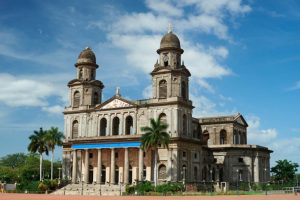
26 Reviews on Nicaragua
While not afraid for my person, theft is high..
Having personally been robbed while sleeping in a cabaña on Little Corn Island, I can concur with your assessment of the theft risk as high. Follow-up by the police was nonexistent, despite the fact that I filled out all the paperwork, the island is small, the thefts are recurring, locals believe they know who the thieves are, and the stolen camera was relatively unique.
Nicaragua it is a dangerous place , the police they kill people very easy . They took bribe every time on the street . Robery are around the corner s as nd police do nothing armed people are everywhere to still money or properties , conclusión , Nicaragua is not safe at all
A place everyone should visit
Nicaragua is a place everyone should visit at least once in their lifetime. It’s so filled with beautiful places and good people. Of course there are dangers but if you do your research and take care, everything will be fine.
Beautiful but unsafe
Unfortunately, someone will try to steal something from you while you’re there. It’s just that kind of place. And it’s a real shame because the place is absolutely beautiful. Not a place to go to alone, with friends it can be a great experience.
Safe for us. We love the people!
We love Nicaragua and the people! We’ve been to Nicaragua six times for a month each time.
Granada has been our main city to stay when in the country but we visit other places too such as San Juan del Sur, Jinortega, Leon, Estili and other places too. Granada is a beautiful colonial city with so much character.
Many businesses and restaurants speak English. The people seem very spiritual and involved in their churches (mostly Catholic) and seem happy and loving.
People are poor and do beg but more commonly try to sell things. We’ve had no problems with crime when we are out and about during the day and early evening.
We don’t go out in unpopulated areas or dark streets at night but we don’t do that in our own country (the United States) either.
I absolutely love this country!
A friend of mine was robbed and murdered in Nicaragua so safe? Ehh not so sure
4 stars robbed and murdered ?
Then your friend went looking for it.
If that’s the case, why would you rate the safety 4 stars?
I wonder what it would take to get a 3 star rating from you. I would hate to find out
Bullshit..live here and have my residency. As for the people who “say” they have had problems. Then you have looked for them. beautiful people and a beautiful country. Live here and see.
Do you still live there? Is there a way to arrange transport and should we exchange money before we go and how much should I travel with ?
Calm and hospitable
The country’s residents are friendly and welcoming. Isla Ometepe in particular is a space where violent crime is practically unheard of. It’s policed as a community and people do not tolerate those who look to harm others. Petty theft is rising as unemployment and poverty does. The country is seeing it’s second economic crisis in 2 years. I feel safer here than in European cities.
Very nice living here
Im koos dutch and living on isla de ometepe my experience are nice people very safe and very beautifal im also living in costarica but here much tranquil
Nicaragua is amazing
I’ll be moving there soon! Paying for a piece of land currently 🙂 Ometepe is where my heart is. It is paradise.
Safer than most USA cities!
I’ve lived in Managua, Jinotepe and Rivas administrative districts for over 15 years. I am dumbfounded by the fear-inciting comments about danger and crime. What are these people talking about? In all the years I’ve had a minor car burglary. Never felt threatened or in danger, the contrary. People here are very ethical and supportive. They will run to help if they can whatever the problem … flat tire? lost? need translation? In a car accident? I drive unafraid over 300 KM every week, both during the day and night, in cities and rural areas. I’ve picked up hitch hiking Nica and gringo hitchhikers, both single women and men who travel unafraid. This is a very tranquil and proud country under a lot of pressure right now.
Safe is as Safe does! Be Safe!
I have lived in Nicaragua full time for 15 years and never had a safety issue.. yes I have heard of petty theft etc which I would consider low on a per capita relative to most of the World.
We felt safe in the South
Please put dates on the user comments so that we can judge when they were and how they affect us today.
We were there in 2014 and 2016, staying in the southern part of Nicaragua, and felt extremely safe.
EXCELLENT point. We lived there from 2013 through 2014 and loved it and have since been back three times.
Safe and free
My wife and I have been traveling here for 12 years and now have been living here permanently for the last year. We absolutely love the country and the people. For safety, I would rate the country as a whole more safe than a major US city but probably less than small town USA. It is a beautiful country and we feel safe and free here.
Safe and Free??????
Thank you for the comment! My husband and I along with our three teenage boys are traveling to Nicaragua in eight days. We’re very excited to see your beautiful Country you now call home! Some of our friends bought houses in Nicaragua and absolutely love it!
My wife and I spent 6 weeks in early 2020 in an apartment 5 minutes from the beach in San Juan del Sur. Overlooking the ocean with amazing daily sunsets, it was magical. Lovely people and is generally a younger demographic. Their economy is challenged by an uncertain political situation. Never felt in danger anywhere in the Rivas (province) area and cannot speak for other parts of the country. Like anywhere else there is no need to go out looking for trouble by treating people like they work for you. Be nice and friendly and a smile from you will go a long way. People are generally helpful and despite speaking a very limited amount of Spanish most were keen to be helpful and even patient. It’s a rustic environment with lots of time spent outside from November to April. Lots of beeches within the area and small trucks drive back and forth to various beeches for about $5 each way per person.
Not great for people who have only been to resorts and prefer to be served on. That’s also available and sold as an adventure tour ($$$$ daily) and which might be perfect for some. If you’re looking for luxury it is available but planning ahead is crucial and with a good outfit. a great spot to spend some time with lovely friendly people.
This beautiful country is meant to be explored
I don’t know exactly what the situation is in all of the cities in Nicaragua. I know people that have visited this country and think it’s heaven on earth. They didn’t have any bad experiences, none at all. And I think everyone that has been here can recognize the absolute beauty of this place. It’s pretty surreal. Are there dangerous places in the country? Yes there are. There are thefts occurring almost daily even in the daytime. Like always, it’s best to keep a close eye on your belongings, all of them whether it’s your phone or wallet or handbag and so on.
I recommend visiting the Islets of Granada (there are 365 of them). Some of them are deserted but there are some that have small development on them, specifically ecolodges. It’s interesting to see if you’re into this. The Masaya Volcano is a nice place to visit from some breathtaking views. You can get pretty close to this active volcano and you will see the lava up close and personal.
Have you ever done volcano surfing? Yes, it’s actually a thing, believe it or not. I loved it! Going to Cerro Negro will give you the chance to do just that: ride on a wooden surboard on the side of a volcano. You will have a boiler suit and goggles for protection. You will easily reach speeds of 60 miles per hour so this is not for everyone. Please know that it will take around 30-40 minutes to get on top of the volcano and only then you can go down.
If you want to see nature in (almost) it’s rawest form then head to Mombacho Volcano Nature Preserve. 2500 acres of forest, farms, coffee plantations, flora (more than 800 plants), birds, monkeys. You’ll use the hiking trails to experience all of this so be ready with water, snacks and plenty of energy.
There’s also the Bosawas Biosphere Reserve which is amazing! It’s huge, being the second in the world (size wise) after the huge Amazon rainforest from Brazil.
Ometepe is heaven on earth. Absolutely gorgeous. The people and the atmosphere. Im american and glad i discovered this paradise!
Way dangerous
Regardless of the 4 and 5 stars given just remember some of us lived in Nicaragua. After my 3rd year living in Nicaragua in a supposed good neighborhood I was robbed at gunpoint twice and my apartment vandalized. Always remember MS-13 is alive and well throughout Nicaragua. I lived in Matagalpa the coffee region 3 years. Little did I realize anywhere in Northern Nicaragua is where ms-13 enters through Honduras. Then they work their way to Leon, Grenada then Managua.All united states airlines have permanently stopped service to Nicaragua as of 2018 Aeromexico and Copa airlines has too.The only flights into Managua are from Avianca airlines. Layover time is normally 3 to 5 hours in El Salvador and the flights arrive normally between 9:30 pm to 10:30 pm. There’s been abductions inside of the airport in San Salvador security looks the other way. Nowhere in Central America is safe just how it is. Nowhere is safe anywhere in South America either. So I’m not singelinig,out just Nicaragua. But I’ve stayed throughout Central and South America over the years. Best advice don’t put yourself in danger. Sure Central and South America are beautiful but underneath it all lurking in the shadows it’s all extremely dangerous.
Share Your Experience Cancel reply
Your Review
Title of your review
Article Contents
- Overall Risk
- Transport & Taxis Risk
- Pickpockets Risk
- Natural Disasters Risk
- Mugging Risk
- Terrorism Risk
- Women Travelers Risk
- Weather Averages (Temperatures)
- User Reviews
- Share Your Experience
Popular Destinations

Safety Index
Recent reviews & comments.
- Shan on Brisbane
- dummy above me on Saudi Arabia
- amora on 15 Pros and Cons of Living in Jamaica
- M.... on Amman
- Anton on Jordan
Popular US States
- Pennsylvania

Search Smartraveller

Latest update
Exercise a high degree of caution in Nicaragua due to the threat of violent crime.
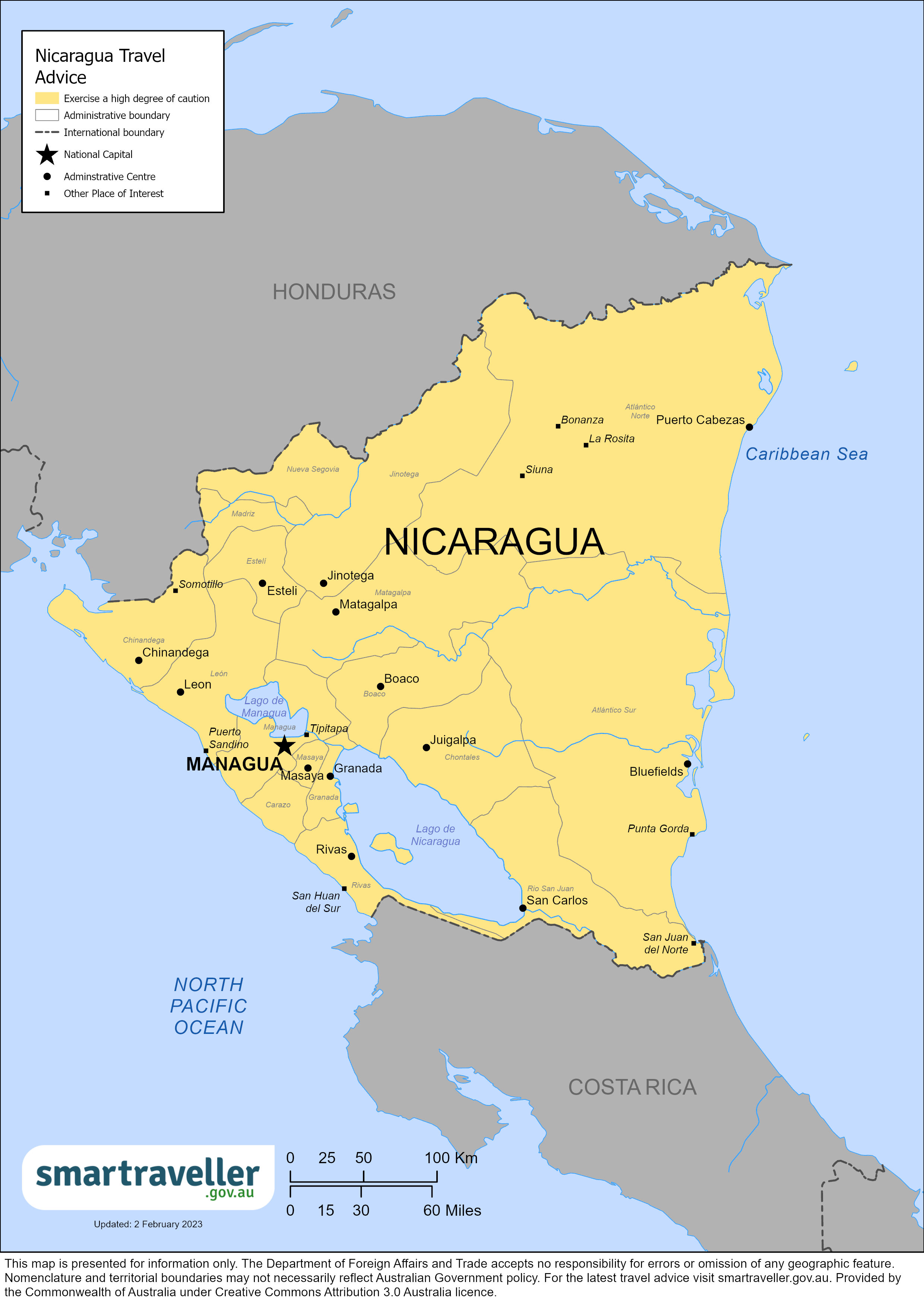
Nicaragua (PDF 238.12 KB)
Americas (PDF 3.25 MB)
Local emergency contacts
Fire and rescue services, medical emergencies.
Call 128 or go to the hospital.
Call 101 for the tourist police, or go to the nearest police station.
Advice levels
Exercise a high degree of caution in Nicaragua.
- Nicaragua has a high crime rate, including armed robbery, assault and express kidnapping. There aren't many police outside major urban areas. Avoid remote locations. Don't go out alone or at night. Only travel to tourist areas. Violent crime occurs in unofficial taxis. Use only official taxis with a red number plate, or radio-dispatched taxis. Avoid public transport.
- Armed gangs operate along the Honduran border. Only use highways that cross the border at Guasaule, El Espino or Las Manos.
- Hurricane season is from June to November. Hurricanes can cause flooding and disrupt services. Know your hotel or cruise ship's evacuation plan. Find your nearest shelter.
- Nicaragua has 3 active volcanoes. Don't hike near volcanoes or visit remote areas without an experienced guide.
- Protests against the Nicaraguan Government may occur. Take care not to appear to support anti-government activity. Avoid protests and political gatherings, authorities may arrest or imprison you.
Full travel advice: Safety
- Malaria is a risk in rural areas, including the outskirts of Managua. Consider taking anti-malaria medication.
- Insect-borne diseases, including dengue, chikungunya, chagas disease and leishmaniasis, are widespread. Ensure your accommodation is insect-proof. Use insect repellent.
- Zika virus is also widespread. If you're pregnant, discuss your travel plans with your doctor.
- Foodborne, waterborne and other infectious diseases are common. These include tuberculosis, typhoid, hepatitis and rabies. Drink only boiled or bottled water. Avoid raw or undercooked food. If you're bitten or scratched by an animal, get immediate medical help.
- Medical facilities are good in Managua but very limited elsewhere. There are no emergency ambulance services. If you're seriously ill or injured, you may need medical evacuation out of the country. Ensure your travel insurance covers this.
Full travel advice: Health
- Don't use or carry illegal drugs. Penalties for drug offences are severe. They include long prison sentences.
- It's illegal to photograph official buildings. Check with officials before taking photos.
- Take care when driving. If you kill or injure someone in an accident, officials may detain you until your court case finishes.
Full travel advice: Local laws
- Entry and exit conditions can change at short notice. You should contact the nearest embassy or consulate of Nicaragua for the latest details.
You'll need to purchase a tourist card at the airport. This permits you to visit Nicaragua for up to 90 days.
- Have multiple ways to access money. The only foreign currency you can exchange is US dollars. ATMs have low daily withdrawal limits.
- Driving can be dangerous. Travel only during daylight hours. Don't leave main roads in the northern border region, as there are unmarked landmines.
Full travel advice: Travel
Local contacts
- The Consular Services Charter details what the Australian Government can and can't do to help you overseas.
- For consular assistance, contact the Australian Embassy in Mexico .
- To stay up to date with local information, follow the embassy's social media accounts.
Full travel advice: Local contacts
Full advice
Violent crime.
Nicaragua has a high risk of crime. This includes:
- armed robbery
- express kidnapping , where criminals force you to withdraw cash from an ATM
Highest rates of violent crime occur in:
- Granada and San Juan del Sur
- La Rosita Siuna
- Corn Island
Gang violence can happen at major hotels, bus terminals, beaches and markets.
Illegal drug smuggling occurs in the Caribbean coastal area.
Policing is limited outside major urban areas. You may not find police in:
- remote beach communities on the Pacific Coast
- Atlantic Coast autonomous regions
Drug traffickers and other criminals use these areas.
Kidnapping occurs across the world with political, ideological and criminal motives. Foreigners, including Australians, have been kidnapped overseas while travelling. Kidnaps can happen anywhere, anytime, including in destinations that are typically at lower risk.
Incidents of kidnapping occur in Nicaragua. Small criminal gangs motivated by financial gain are responsible for the vast majority of kidnaps. Express kidnappings are a problem.
The Australian Government's longstanding policy is that it doesn't make payments or concessions to kidnappers.
More information:
Assaults and robberies occur in unlicensed taxis or when a stranger offers to call a taxi for you. To reduce your risks:
- don't use a taxi if a stranger organised it
- use official taxis with a clearly visible red number plate
- use radio-dispatched taxis at the international airport and larger hotels
Take note of the taxi's registration and phone numbers.
While it is a common local practice to share taxis with strangers, we recommend you don't. If you must, agree on a fare for a solo journey before you set off.
There is a risk of ‘express kidnapping’ if you use an unauthorised taxi. You could be taken hostage and forced to pay cash for your release.
Road-based crime
Armed gangs carry out kidnappings, robberies and extortion in the northern border region.
For safer travel to the Honduran border, only use highways that cross the border at:
Criminals have attacked vehicles, including hotel-run buses, along:
- Managua to León highway (Route 12/CA-3)
- Tipitapa to Masaya highway (NIC-11A)
- Somotillo to Chinandega highway (NIC-24)
To protect yourself from violent crime:
- don't discuss your travel plans with strangers or in public
- don't travel at night
- only travel in tourist areas
- avoid isolated locations
- avoid walking alone, particularly on remote beaches
Avoid public transport. If you must use it, be cautious of anyone offering help. They may rob you.
Pickpockets and bag snatchers are a risk:
- on public transport
- in tourist areas
- at hotels and markets
- when your vehicle is stopped in traffic
Take care of your valuables:
- in markets near the old cathedral in Managua
- near the Tica Bus Station terminal
- at public transport terminals
Use reputable tour operators. Thieves posing as tour guides may rob you, particularly on the island of Ometepe.
Only use ATMs at banks and in busy areas, like shopping centres.
Be alert when using your credit card. Credit card fraud is on the increase.
If you're attacked or robbed, don't resist. Many criminals carry weapons.
Cyber security
You may be at risk of cyber-based threats during overseas travel to any country. Digital identity theft is a growing concern. Your devices and personal data can be compromised, especially if you’re connecting to Wi-Fi, using or connecting to shared or public computers, or to Bluetooth.
Social media can also be risky in destinations where there are social or political tensions, or laws that may seem unreasonable by Australian standards. Travellers have been arrested for things they have said on social media. Don't comment on local or political events on your social media.
- Cyber security when travelling overseas
Civil unrest and political tension
Demonstrations and protests.
Protests against the Nicaraguan Government may occur.
Take care not to appear to support anti-government activity. Authorities may arrest or imprison you.
Public protests and events that draw large groups of people can turn violent.
During periods of unrest:
- avoid protests as they may turn violent
- monitor local media reports of unrest
- don't cross roadblocks
- follow the advice of local authorities
Boundary disputes occur in the Caribbean coastal waters between Nicaragua and Honduras. Authorities have detained and impounded boats and fishing vessels.
- Demonstrations and civil unrest
Terrorism is a threat worldwide.
Tourism safety
The town of San Juan del Sur has a lively party scene. If you plan to join in, see Partying safely .
Swimming safety
Strong currents and undertows occur on the Pacific coast beaches. Check the safety conditions. There may not be lifeguards or warning signs.
Climate and natural disasters
Nicaragua experiences natural disasters and severe weather , including:
- flash flooding
- earthquakes
- volcanic activity
If there's a natural disaster:
- always carry your passport in a waterproof bag
- keep in touch with family and friends
- check the media and local sources for information
- Global Disaster Alert and Coordination System
Hurricanes, landslides and flash flooding
Severe weather may occur at any time. This can cause landslides and flash flooding.
Hurricane season is from June to November. During this time, you may encounter landslides, mudslides, flooding and disruption to essential services.
The direction and strength of hurricanes can change suddenly.
In the event of a hurricane:
- you may get stuck in the area
- flights could be delayed or suspended
- available flights may fill quickly
- adequate shelter may not be available
If you travel during hurricane season:
- know the evacuation plan for your hotel or cruise ship
- keep your travel documents somewhere safe and waterproof
- contact your tour operator for an update on your destination
If a hurricane is approaching:
- identify your local shelter
- monitor alerts and advice from authorities
Severe weather may also affect:
- access to ports
- road travel
- essential services, such as communication, water and electricity
To get weather alerts, register with either the:
- National Hurricane and Tropical Prediction Center
- Caribbean Disaster Emergency Management Agency
Earthquakes, tsunamis and volcanoes
Earthquakes and large, destructive tsunamis can happen in Nicaragua. It is in an active earthquake zone.
The country has 3 active volcanoes:
- Santiago Volcano, about 25km south of Managua
- San Cristobal Volcano
- Cerro Negro Volcano
Don't hike near volcanoes or visit remote areas without an experienced guide.
If a natural disaster happens, follow the advice of local authorities.
Travel insurance
Get comprehensive travel insurance before you leave.
Your policy needs to cover all overseas medical costs, including medical evacuation. The Australian Government won’t pay for these costs.
If you can't afford travel insurance, you can't afford to travel. This applies to everyone, no matter how healthy and fit you are.
If you're not insured, you may have to pay many thousands of dollars up-front for medical care.
- what activities and care your policy covers
- that your insurance covers you for the whole time you’ll be away
Physical and mental health
Consider your physical and mental health before you travel, especially if you have an existing medical condition.
See your doctor or travel clinic to:
- have a basic health check-up
- ask if your travel plans may affect your health
- plan any vaccinations you need
Do this at least 8 weeks before you leave.
If you have immediate concerns for your welfare, or the welfare of another Australian call the 24-hour Consular Emergency Centre on +61 2 6261 3305 or contact your nearest Australian Embassy, High Commission or Consulate to discuss counselling hotlines and services available in your location.
- General health advice
- Healthy holiday tips (Healthdirect Australia)
Not all medication available over the counter or by prescription in Australia is available in other countries. Some may even be considered illegal or a controlled substance, even if prescribed by an Australian doctor.
If you plan to bring medication, check if it's legal in Nicaragua. Take enough legal medicine for your trip.
Carry a copy of your prescription or a letter from your doctor stating:
- what the medication is
- your required dosage
- that it's for personal use
Health risks
Insect-borne diseases.
Malaria is a risk in rural areas of Nicaragua, including the outskirts of Managua.
Dengue and chikungunya are widespread.
The risk of other insect-borne diseases increases in the rainy season, from April to November. This includes:
- Chagas disease
- Leishmaniasis
Widespread transmission of zika virus occurs in Nicaragua.
If you're pregnant, the Australian Department of Health recommends that you:
- discuss travel plans with your doctor
- consider deferring non-essential travel to affected areas
To protect yourself from diseases spread by insects:
- make sure your accommodation is insect-proof
- use insect repellent
- wear long, loose, light-coloured clothes
Consider taking medicine to prevent malaria.
Other health risks
Waterborne, foodborne, parasitic and other infectious diseases are common.
These include:
- tuberculosis
- leptospirosis
Serious outbreaks sometimes occur.
More information
- Infectious diseases
Medical care
Medical facilities.
Facilities are good in Managua but are very limited in smaller towns and rural areas.
Expect to pay cash upfront before doctors, and private hospitals treat you, even in an emergency.
There are no emergency ambulance services in Nicaragua. Access to certain types of medical equipment, medication and treatments is limited.
If you become seriously ill or injured, you may need evacuation to another country. This can be very expensive.
You're subject to all local laws and penalties, including those that appear harsh by Australian standards. Research local laws before travelling.
If you're arrested or jailed, the Australian Government will do what it can to help you under our Consular Services Charter . But we can't get you out of trouble or out of jail.
Penalties for drug offences are severe and include long prison sentences in local jails.
- Carrying or using drugs
It's illegal to take photos of official buildings. Check with local authorities before taking photos.
There are strict restrictions on the use of drones. Do not use drones for photography or any other reason unless you have written permission from Nicaraguan authorities.
If you drive a car and injure or kill someone in an accident, authorities may arrest or detain you. The local courts will need to determine who was responsible. This can take weeks or months.
Australian laws
Some Australian criminal laws still apply when you’re overseas. If you break these laws, you may face prosecution in Australia.
- Staying within the law and respecting customs
Dual citizenship
Dual nationality is recognised in Nicaragua. Should you be arrested, you may be treated only as a Nicaraguan citizen and denied access to consular services.
Children with single or dual Nicaraguan nationality may need specific documents to leave the country without both parents.
Contact the Nicaraguan authorities before you travel.
- Dual nationals
- Advice for people travelling with children
Visas and border measures
Every country or territory decides who can enter or leave through its borders. For specific information about the evidence you'll need to enter a foreign destination, check with the nearest embassy, consulate or immigration department of the destination you're entering.
Tourist card (CA-4 visa)
Nicaragua is a member country of the Central American Border Control Agreement (CA-4), along with:
- El Salvador
With a CA-4 tourist visa, you can travel freely by land between member countries within a 90-day period.
Your tourist card is dated from the first point of entry in any member country.
You can apply to extend the CA-4 visa at Nicaraguan Immigration (Spanish) before it expires.
If you overstay the visa without an extension, you may be:
- forced to leave
- unable to enter other CA-4 member countries
If you're not a tourist or you plan to stay longer, you'll need a visa.
Entry and exit conditions can change at short notice. Contact the Nicaraguan Embassy in Japan for details about visas, currency, customs and quarantine rules.
Travel via the United States
If you're travelling through the US , ensure you meet all current US entry and transit requirements. If you're arriving in or transiting through the US, you'll need to show onward flight tickets from not only the US but also any country that borders the US (i.e. Mexico and Canada) if that's your next destination.
- Travel advice for the US
Travel via Canada
If you're travelling via Canada, you'll need an ETA (Electronic Travel Authorisation) for Canada. Transit requirements for Canada are strictly enforced.
- Visit Canada
- Canadian High Commission
- Travel advice for Canada
Travel via Chile
If you’re travelling via Chile, ensure you meet all current entry or transit requirements.
- Travel advice for Chile
Other formalities
Yellow fever vaccination.
You may need a valid yellow fever vaccination certificate to enter Nicaragua. Some airlines may want to see one when you leave.
- Yellow fever risk and certification requirements
Arrival and departure taxes
There's an arrival tax, which you need to pay in cash.
Your airline ticket usually includes the airport departure tax from the Augusto Sandino Airport in Managua. Confirm this with your travel agent.
Some countries won’t let you enter unless your passport is valid for 6 months after you plan to leave that country. This can apply even if you’re just transiting or stopping over.
Some foreign governments and airlines apply the rule inconsistently. Travellers can receive conflicting advice from different sources.
You can end up stranded if your passport is not valid for more than 6 months.
The Australian Government does not set these rules. Check your passport’s expiry date before you travel. If you’re not sure it’ll be valid for long enough, consider getting a new passport .
Lost or stolen passport
Your passport is a valuable document. It's attractive to people who want to use your identity to commit crimes.
Some people may try to trick you into giving them your passport. Always keep it in a safe place.
If your passport is lost or stolen, tell the Australian Government as soon as possible:
- In Australia, contact the Australian Passport Information Service .
- If you're overseas, contact the nearest Australian embassy or consulate .
Passport with ‘X’ gender identifier
Although Australian passports comply with international standards for sex and gender, we can’t guarantee that a passport showing 'X' in the sex field will be accepted for entry or transit by another country. Contact the nearest embassy, high commission or consulate of your destination before you arrive at the border to confirm if authorities will accept passports with 'X' gender markers.
- LGBTI travellers
The local currency is the Nicaraguan Córdoba (NIO).
You won't be able to use Australian dollars or traveller's cheques in Nicaragua.
The only foreign currency you can exchange is US dollars.
ATMs have low daily withdrawal limits.
Local travel
Remote areas.
If you're an adventure traveller, use an experienced local guide. This includes trekking to volcanoes or other remote areas.
Make sure you take enough supplies.
Driving permit
To drive in Nicaragua, you'll need either:
- an International Driving Permit (IDP)
- an Australian driver's licence
You must get the IDP before arriving in Nicaragua.
You also need to carry your current passport and tourist card.
Road travel
Driving in Nicaragua can be dangerous. Hazards include:
- narrow roads in poor condition
- lack of signage
- dangerous local driving practices
You're more likely to die in a motor vehicle accident in Nicaragua than in Australia.
If you're involved in an accident, don't move your vehicle until a police officer permits it.
If you plan to drive or travel by car:
- only travel during daylight hours
- travel in groups where possible
- don't hitchhike
- lock doors and keep windows up, even when moving
- don't leave main roads in the northern border region, as there are unmarked landmines
- Driving or riding
It's a common local practice to share taxis with strangers. To avoid this, agree on a fare for a solo journey before you set off.
Assaults and robberies happen in unlicensed taxis or when a stranger offers to call a taxi for you. Don't take a taxi if you don't know the person who called it.
DFAT doesn't provide information on the safety of individual commercial airlines or flight paths.
Check Nicaragua's air safety profile with the Aviation Safety Network.
Emergencies
Depending on what you need, contact your:
- family and friends
- travel agent
- insurance provider
Always get a police report when you report a crime.
Your insurer should have a 24-hour emergency number.
Consular contacts
Read the Consular Services Charter for what the Australian Government can and can’t do to help you overseas.
The Australian Consulate in Managua is closed.
Our ability to provide consular assistance to Australians in Nicaragua is severely limited. Contact the Australian Embassy in Mexico City for consular assistance.
Australian Embassy, Mexico City
Ruben Dario #55 Corner of Campos Eliseos, Polanco Colonia Bosque de Chapultepec 11580 CDMX Mexico
Phone: +52 55 1101 2200 Email: [email protected] Website: mexico.embassy.gov.au Facebook: Australia in Mexico, Central America, Cuba and the Dominican Republic X: AusEmbMex
See the Embassy website for details about opening hours and any temporary closures.
24-hour Consular Emergency Centre
In a consular emergency, if you can't contact an embassy, call the 24-hour Consular Emergency Centre on:
- +61 2 6261 3305 from overseas
- 1300 555 135 in Australia

Travelling to Nicaragua?
Sign up to get the latest travel advice updates..
Be the first to know official government advice when travelling.
Nomadic Matt's Travel Site
Travel Better, Cheaper, Longer
Nicaragua Travel Guide
Last Updated: September 1, 2023
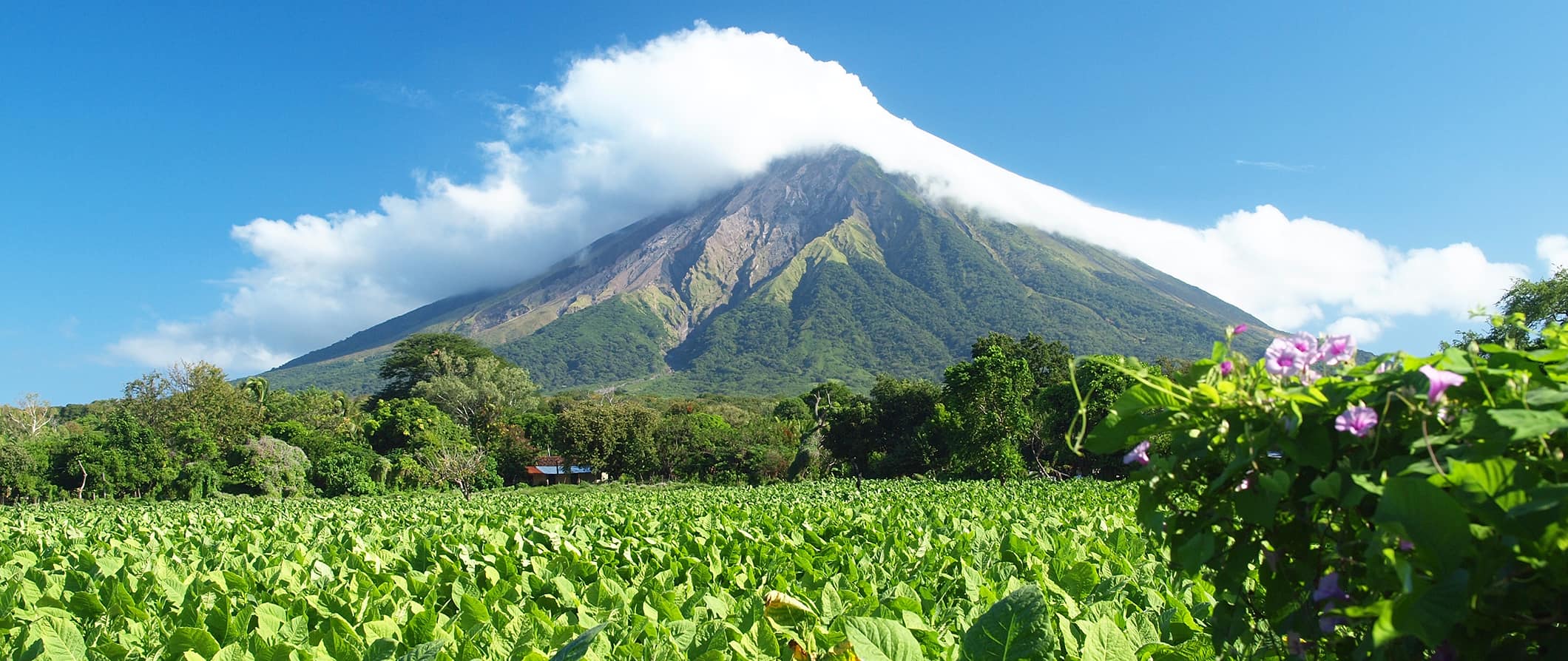
Known as the “Land of Lakes and Volcanoes,” Nicaragua is the largest country in Central America. Home to Lake Nicaragua (Central America’s largest lake), beautiful islands, expansive volcanic terrain, mangrove swamps, ethereal cloud forests, and tropical rainforests, Nicaragua is a stunning destination with tons of things to see and do — no matter your interests.
In fact, I loved my visit to Nicaragua so much I ended up extending my visit!
While Granada, León, and San Juan del Sur tend to pull in the crowds, if you leave the main southern cities and get a little off the tourist trail, you can discover even more varied landscapes, friendly locals, and little explored towns and national parks.
This travel guide to Nicaragua shows you how to visit on a budget, save money, and make the most of your trip.
Table of Contents
- Things to See and Do
- Typical Costs
- Suggested Budget
- Money-Saving Tips
- Where to Stay
- How to Get Around
- How to Stay Safe
- Best Places to Book Your Trip
- Related Blogs on Nicaragua
Top 5 Things to See and Do in Nicaragua
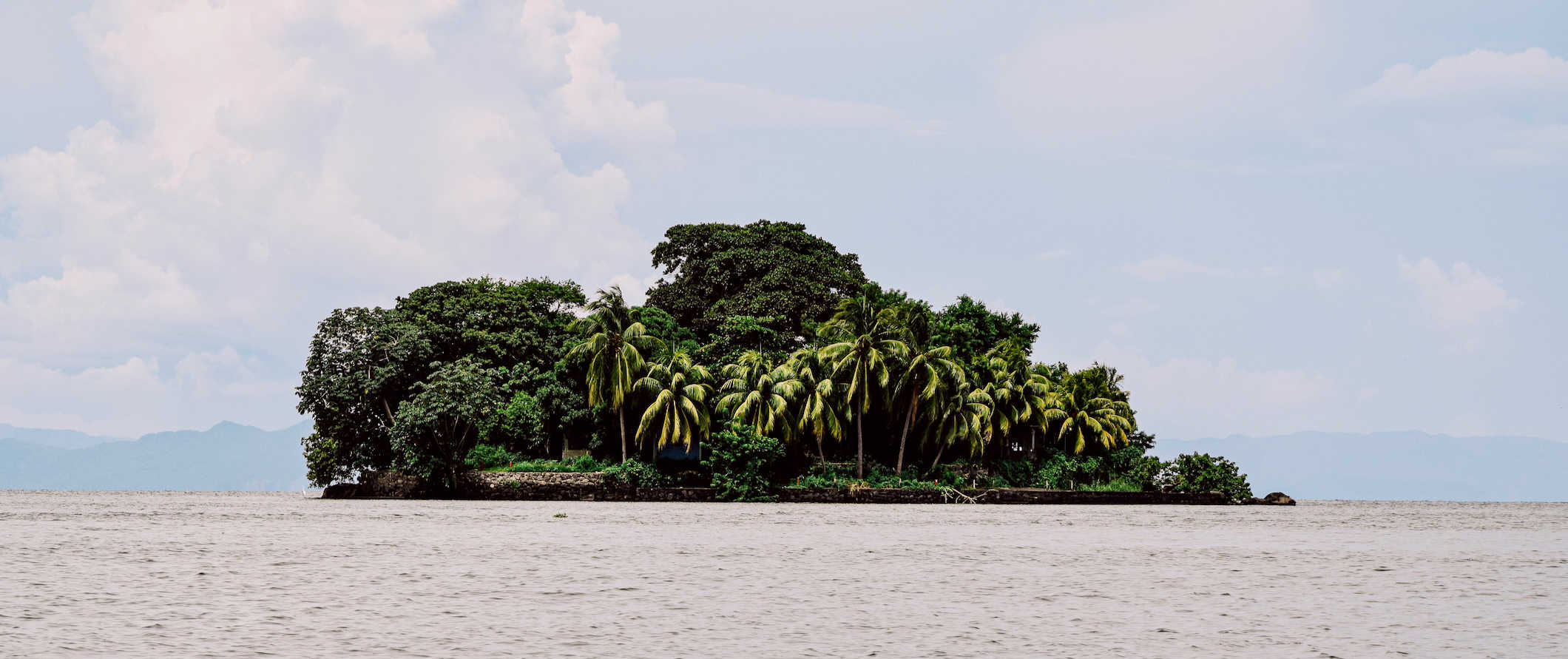
1. Visit Little Corn Island
This archipelago off the Caribbean coast is one of the best places to relax in the country. It boasts diving with hammerhead sharks and underwater caves, fresh seafood, and plenty of hammock downtime on deserted beaches (invest in a good hammock if you’re serious about your R&R). Don’t miss Otto’s Beach.
2. Relax in San Juan del Sur
This picturesque surfer paradise is fringed with prehistoric volcanic hills and was the first destination to put Nicaragua on the map. Backpackers flock here in droves to surf and party under the stars. It’s a must-visit destination in the country!
3. Admire colonial Granada
Nicaragua’s oldest city is revered as the colonial jewel of Central America. Many of the pastel-painted buildings have been meticulously restored. Bask in Granada’s historic grandeur as you weave through the cobblestone streets, visit local art galleries, and sip on a coffee in a plaza.
4. Tour León
From world-class museums, Central America’s largest cathedral, and other beautiful monuments to a lively party scene fueled by the ample student population, León is one of my favorite places in the country. Sample the best roadside quesillo and see the local artists who give the city its eccentric flavor.
5. Explore Ometepe Island
Spend your days hiking, kayaking, or cycling around the island, spotting howler monkeys and archeological ruins in the process. Two of the two volcanoes here (Concepción and Maderas) offer strenuous 8-10-hour hikes. Guides are mandatory and cost 530 NIO.
Other Things to See and Do in Nicaragua
1. hike miraflores.
Miraflores national park was the highlight of my entire trip. Located in Estelí in northern Nicaragua, this is a stunning cloud forest with rivers and waterfalls. You can take day-hikes or multiday treks to the park (the multiday trips enable you to stay with local host families in small communities) and there are also programs to help you learn to farm. The one-day trek that I did ran from 7am-4pm and cost 550 NIO which included two meals and a mandatory guide. An extra bonus that I loved is that all the money goes back into supporting the community and farmers.
2. Explore Rio San Juan
This river is a wonderful stopover for nature enthusiasts looking to go kayaking, fishing, and wildlife watching. Despite the surge in eco-tourism in the region, accommodation options are still no-frills and very low-key, with Wi-Fi and phone coverage being scarce. Most tours leave from San Carlos, which is located at the mouth of the river on Lake Nicaragua.
3. Hike a volcano
Nicaragua has 19 volcanos (9 of which are active). The two peaks on Ometepe –– Concepcion and Maderas –– are the two most popular day hikes in the country. Concepción, towering at 1,600 meters (5,249 feet) is a baking hot hike, so bring lots of sunblock and water. Maderas is easier but muddier, with a lake at the summit. Cerro Negro (near León) offers a comfortable sandy route from top to bottom and is also well-known for “volcano surfing.” Masaya Volcano is the most active volcano in Nicaragua and you can actually see the lava bubbling there (visits are limited to 10 minutes due to the fumes). For people wanting a challenge, try San Cristobal, Nicaragua’s highest volcano. If you’re hunting for scenic Insta-worthy views, hike to Telica (also within easy reach from León) for a spectacular sunset (you can actually camp at the top).
4. Relax at Lake Apoyo
Laguna de Apoyo is a breathtaking body of water that sits upon the Apoyo volcano crater near Granada. This 200-meter-deep lake is the perfect spot for swimming, kayaking, fishing, and sailing. Hostels offer day trips from Granada for around 300 NIO, which include a return shuttle and include use of another hostel’s facilities, kayaks, and tubes on the lagoon. You can also visit independently and stay overnight if you want a longer visit.
5. Tour a coffee plantation
Coffee is Nicaragua’s primary export and Jinotega, the misty and mountainous northern region, produces over 80% of the country’s output. You can organize a coffee tour in any of the eco-lodges/hostels dotted around the region. I particularly liked Eco Albergue La Fundadora. Even though I don’t drink coffee, it’s a fascinating and important industry in the country (and region) and worth learning about.
6. Relax at the Pearl Cays
The remote string of crescent-shaped playas that make up the Pearl Cays (pronounced “Pearl Keys”) offer some of the best Caribbean beaches in Nicaragua. Unfortunately, due to climate change, this stunning collection of white islands is steadily shrinking. Located near the Corn Islands, there are currently only 10 left from the original 18. Accommodation on the island is super exclusive and very pricey. However, day trips by shared speedboat can be easily arranged to make visits affordable. Private boats start from around 8,800 NIO and fit up to 10 people. Come here to snorkel, swim, and lounge away the day.
7. Visit the Bosawas Biosphere Reserve
Bosawas is the second-largest rainforest in the Western Hemisphere and is home to jaguars, tapirs, spider monkeys, harpy eagles, and more. A huge chunk of the country’s bird population — 600 out of 790 species — are located here, making it the prime spot for wildlife and bird watching. Multi-day trips, where you can truly immerse yourself in the wilderness, hike cloud forests, swim in waterfalls, and meet Mayangna and Miskito indigenous communities start at around 12,000 NIO per person.
8. Explore the Solentiname Archipelago
Isolated on the southwest tip of Lago de Nicaragua, the Solentiname Archipelago is a cluster of 36 islands revered for their pristine collections of primitive art, birdlife, and laid-back lifestyle. It’s best to base yourself in Mancarrón and organize day trips to other neighboring islands throughout your stay. It’s roughly a four-hour drive from Managua to San Carlos and then and then a two-hour boat ride to the dock in Mancarrón. There are no ATMs to be found on the islands so bring plenty of cash.
9. Shop at the Masaya Markets
Stock up on rum, coffee, hammocks, and ceramics at the Masaya Markets in Masaya National Park near Managua. Barter your way through the markets and soak up the colorful atmosphere. While there is a lot of tourist junk here, there are still plenty of artisanal handmade crafts as well. On Thursdays, a weekly ‘Night of Revelry’ features traditional dancing, local food, and music. The market is just thirty minutes from Managua.
10. Visit the stone carving hermit
Near Estelí in the north you can find Alberto the hermit. He’s been living here for almost 40 years, carving stone figures and sculptures in the jungle. He’s eccentric, kind, and incredibly knowledgeable about the flora and fauna in the region. Stop by to see his carvings and learn about his life in the jungle. Here’s a video of my visit .
11. Check out the Isletas de Granada
Southeast of the city of Granada in Lake Nicaragua, you can find the Isletas de Granada (Grenada Islets). There are around 365 of these volcanic islands, some of which are inhabited. A few have hotels on them or you can take a one-hour boat ride around them to admire their pristine beauty (it costs around 1,400 NIO for a boat that can take 8 people).
12. See Somoto Canyon
Dating back to the Miocene epoch (23-25 million years ago), Somoto Canyon is a relatively unexplored part of Nicaragua. Located near the border with Honduras, it was discovered by Czech and Nicaraguan scientists in 2004 and, since then, its spectacular walls and clear water have become a popular tourist destination. Activities here include hiking, boating, and scaling the canyon walls. The narrowest part of the canyon can only be reached by swimming or by tubing. Somoto Canyon Tours offers a variety of tours lasting from 3-6 hours with prices starting at 880 NIO.
13. Do a homestay/Learn Spanish
If you have a bit more time to spend in Nicaragua, there are lots of opportunities to volunteer, learn Spanish, and farm by taking part in a homestay (Estelí, Ometepe, and León are popular destinations for this). Hostels and tourist offices in any of the big cities can help you arrange it.
Nicaragua Travel Costs
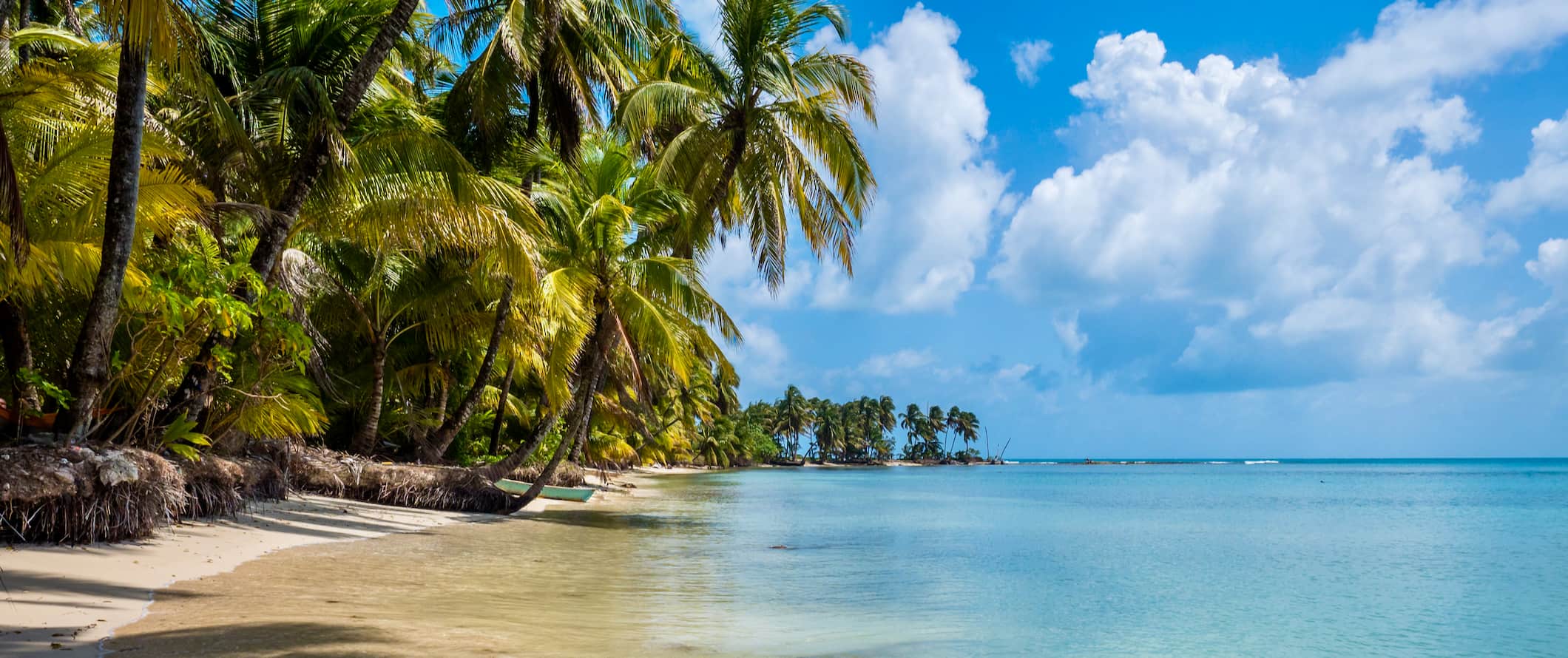
Accommodation – Small 6-8-bed dorms generally cost around 250-350 NIO per night, with private rooms costing between 700-1,700 NIO. Free Wi-Fi and free breakfast are common and many hostels also have a swimming pool.
For a budget two-star hotel, expect to pay between 1,000-2,600 NIO for a double room including breakfast. Expect basic amenities such as Wi-Fi, A/C, a TV, and sometimes a swimming pool.
Airbnb is available on Nicaragua’s Pacific coast as well as in Grenada and Managua (there are no rentals on the Atlantic side). You can score a great beachfront property from 2,800-4,200 NIO depending on group size and house style. For a private room, expect to pay at least 880 NIO per night.
Food – Beans, rice, and meat are the backbone of most meals in Nicaragua. Grilled chicken, pork, and beef are common options (especially for street food). Gallo pinto (fried rice and beans) is the go-to breakfast and dinner meal, with an egg often being added for the breakfast option. Be sure to try the popular quesillo , a tortilla wrapped around white cheese smothered cream, and nacatamales , a tamale made from maize dough stuffed with pork and potato.
A typical lunch, eaten in a comedor (local eatery serving tradition cuisine), or street stall costs between 100-175 NIO. Nicaraguans are more accustomed to dining out for lunch so travelers can expect to see fewer evening options available in non-touristy spots.
On the coast, seafood is the main staple so expect a lot of grilled fish. On the Caribbean side, the cuisine is heavily influenced by Caribbean culture as well.
A meal at a restaurant serving local cuisine costs around 345-520 NIO for a three-course meal with a drink.
The touristy towns and on the coast have more international cuisine options. Expect to pay 800-1,200 NIO for a three-course meal in a mid-range restaurant. A large pizza costs around 270-350 NIO. For fast food (think McDonald’s), expect to pay around 210 NIO for a meal.
A domestic beer or latte/cappuccino costs around 30-90 NIO.
If you’re buying a week’s worth of groceries, expect to pay between 1,100-1,300 NIO for basic staples like rice, beans, seasonal produce, and some meat or fish.
Backpacking Nicaragua Suggested Budgets
On a backpacking budget of 1,100 NIO per day, you can stay in a hostel dorm, use public transportation and chicken buses to get around, limit your drinking, cook all of your meals, and enjoy free and cheap activities like free walking tours and lounging on the beach.
On a mid-range budget of 2,800 NIO per day, you can stay in a private Airbnb or hostel room, eat out for most meals, enjoy a few drinks, take the occasional taxi or coach between cities, and do more paid activities like diving or guided day hikes.
On a “luxury” budget of 8,200 NIO per day or more, you can stay in a hotel, eat out anywhere you want, drink as much as you’d like take domestic flights to get around, and do whatever tours and activities you want. This is just the ground floor for luxury though. The sky is the limit!
You can use the chart below to get some idea of how much you need to budget daily, depending on your travel style. Keep in mind these are daily averages — some days you’ll spend more, some days you’ll spend less (you might spend less every day). We just want to give you a general idea of how to make your budget. Prices are in NIO.
Nicaragua Travel Guide: Money-Saving Tips
Nicaragua is one of the cheaper countries in the region but prices are rising quickly as it becomes more of the “it spot” to retire and work remotely from. Here are some of the best ways to save money during your trip:
- Take the chicken bus – Chicken buses (crowded local buses that make multiple stops) are the cheapest way to travel. You can save big time if you’re willing to trade A/C and cushioned seating to travel on a decommissioned school bus for a few hours. For example, the 3.5-hour trip from Granada to Rivas costs just 70 NIO!
- Refill your water bottle – The tap water here is not safe to drink so make sure you have a reusable bottle with you. To stay safe, bring a water filter like LifeStraw to ensure your water is clean and safe!
- Use the right currency – Pay with US dollars in bigger cities and save your córdobas for purchases at small businesses in rural areas and villages since they won’t have change for larger USD bills.
- Bring cash – Cards are accepted in major establishments and big cities. However, electricity can be fickle on the coast so it’s best to carry plenty of cash in case you’re caught out in a blackout.
- Learn some Spanish – Inflated tourist prices are common here. To avoid getting overcharged, learn some Spanish. Even just a few words and phrases can help you avoid being overcharged.
- Travel during the shoulder season – Prices are highest during the dry months (December-April). To avoid the crowds and save money, travel during the rainy season or shoulder season. You might get rained on, however, accommodation and activities are cheaper.
- Choose less-traveled routes – Prices for activities and accommodation plummet when you leave the tourist triangle (Granada, León, and San Juan del Sur). Nicaragua is the largest country in Central America so don’t be afraid to think outside the box and venture off the beaten path.
- Share private taxis – If you’re traveling in a small group, a taxi can often work out cheaper and more time-efficient than a bus or shuttle. Negotiate the price beforehand and ask your hostel for the normal rates so you have a reference.
Where to Stay in Nicaragua
If you’re looking for places to stay during your visit, here are some of my favorites:
- Hola Ola Hostel (San Juan del Sur)
- Viavia Leon (León)
- De Boca en Boca (Granada)
- Managua Backpackers Inn (Managua)
How to Get Around Nicaragua
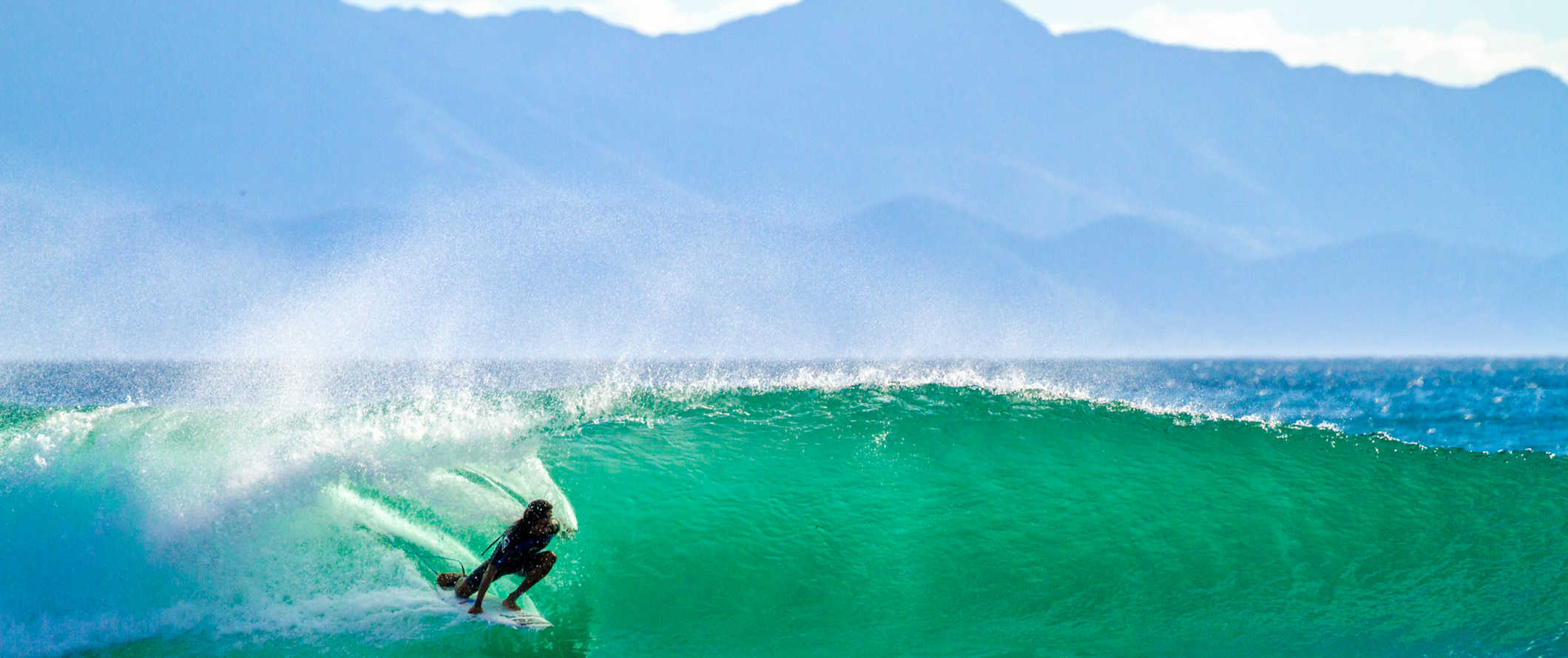
Bus – Chicken buses (i.e. converted school buses) are the cheapest way to get around. They are slow and stop often but have dirt cheap prices (around 35 NIO per hour of travel).
If you’re looking for a more comfortable journey, book with a coach company or private mini-shuttle, the latter of which are air-conditioned with cushioned seating and have storage room for your luggage.
For private mini-shuttles, expect to pay between 880-1,750 NIO per trip, however, you can try and buddy up with other hostel guests to drive down the price since it’s a private booking.
Most of the large cities have public transportation with local bus tickets costing under 6 NIO.
Air – La Costeña, Nicaragua’s domestic carrier, is based out of Managua and serves most of the country. Even if you’re keeping spending to a minimum, you have to take a flight if you want to visit the Corn Islands. Return tickets from Managua to the Corn Islands cost 5,700 NIO. For the 2.5-hour flight from Managua to Bluefields, expect to pay at least 4,500 NIO.
Train – There are no trains in Nicaragua.
Car Rental – A 4WD is recommended if you’re planning to visit rural areas as the roads here can be rough. Prices start from around 1,400 NIO per day for a multi-day rental. You’ll need an International Driving Permit (IDP) and you’ll definitely want to have extra insurance too.
When to Go to Nicaragua
There are two distinct seasons in Nicaragua: the dry season, which falls between November-April, and the green (rainy) season which is from May-October.
To avoid the crowds and peak prices, visit during the rainy season. The rainier months also offer ideal surfing conditions and deserted beaches to enjoy the waves. Just keep in mind the Caribbean coast sees more rain than the Pacific. Expect daily highs around 30°C (86°F).
The San Sebastian festival in Diriamba runs between January 17th-27th and is an amazing way to celebrate a local fiesta, with colorful parades, traditional music, and street-side buffets filling up every corner.
Easter (Semana Santa) is when you can find most locals hitting the mountains or beaches with family and friends. Buses and hotels, particularly on the coast, fill up fast so be sure to book in advance if you’re visiting during this time. Note that cities are much quieter during this period and many local businesses adapt their opening times/hours and events to celebrate the religious holiday.
How to Stay Safe in Nicaragua
Nicaragua is one of the safest countries in Central America, though petty theft and robberies are still relatively common. For that reason, keep your belongings secure and out of sight at all times — especially on crowded public transportation.
Solo female travelers should feel safe here when out during the day, however, they will want to avoid traveling alone after dark. Additionally, the usually standard precautions apply here as well (always keeping an eye on your drink at the bar, never walking home alone intoxicated, etc.).
If you rent a car, don’t leave any valuables in it overnight, and make sure to have suitable insurance just in case as break-ins can occur.
Scams are rare here, but they do happen. Be wary of random strangers asking for medicine or other financial assistance. Just politely decline and be on your way. You can read about common scams to avoid here .
Inflated tourist prices are common in Nicaragua. To avoid getting overcharged, learn some Spanish. Even just a few words and phrases can help you avoid being overcharged
Many people come to Nicaragua to party as drugs and alcohol are both cheap and abundant. However, the fines and penalties for drug use are steep. Police often expect bribes that can cost of hundreds — if not thousands — of dollars. Police won’t hesitate to strip search you if they suspect narcotics so avoid using drugs here to stay safe.
Moreover, the drug trade contributes to deaths, instability, and unrest in the region. Don’t contribute to that.
Protests and clashes in the major cities aren’t uncommon. Should a protest occur during your visit, avoid the area and return to your accommodation. While you’re unlikely to be hurt, it’s better to be safe than sorry.
As always, keep your wits about you at night time, particularly in the capital. Ask your hotel to call you a taxi in Managua (always negotiate the price before getting in the car), which can be an intimidating spot for travelers due to the lack of road names, tourists, and landmarks.
If you experience an emergency, dial 118 for assistance.
Always trust your gut instinct. Avoid isolated areas at night, and be aware of your surroundings at all times. Make copies of your personal documents, including your passport and ID, before you leave on your trip.
If you wouldn’t do it at home, don’t do it in Nicaragua!
The most important piece of advice I can offer is to purchase good travel insurance. Travel insurance protects you against illness, injury, theft, and cancellations. It’s comprehensive protection in case anything goes wrong. I never go on a trip without it as I’ve had to use it many times in the past.
Nicaragua Travel Guide: The Best Booking Resources
These are my favorite companies to use when I travel. They consistently have the best deals, offer world-class customer service and great value, and overall, are better than their competitors. They are the companies I use the most and are always the starting point in my search for travel deals.
- Skyscanner – Skyscanner is my favorite flight search engine. They search small websites and budget airlines that larger search sites tend to miss. They are hands down the number one place to start.
- Hostelworld – This is the best hostel accommodation site out there with the largest inventory, best search interface, and widest availability.
- Booking.com – The best all around booking site that constantly provides the cheapest and lowest rates. They have the widest selection of budget accommodation. In all my tests, they’ve always had the cheapest rates out of all the booking websites.
- Get Your Guide – Get Your Guide is a huge online marketplace for tours and excursions. They have tons of tour options available in cities all around the world, including everything from cooking classes, walking tours, street art lessons, and more!
- SafetyWing – Safety Wing offers convenient and affordable plans tailored to digital nomads and long-term travelers. They have cheap monthly plans, great customer service, and an easy-to-use claims process that makes it perfect for those on the road.
- LifeStraw – My go-to company for reusable water bottles with built-in filters so you can ensure your drinking water is always clean and safe.
- Unbound Merino – They make lightweight, durable, easy-to-clean travel clothing.
- Top Travel Credit Cards – Points are the best way to cut down travel expenses. Here’s my favorite point earning credit cards so you can get free travel!
Nicaragua Travel Guide: Related Articles
Want more info? Check out all the articles I’ve written on backpacking/traveling Central America and continue planning your trip:
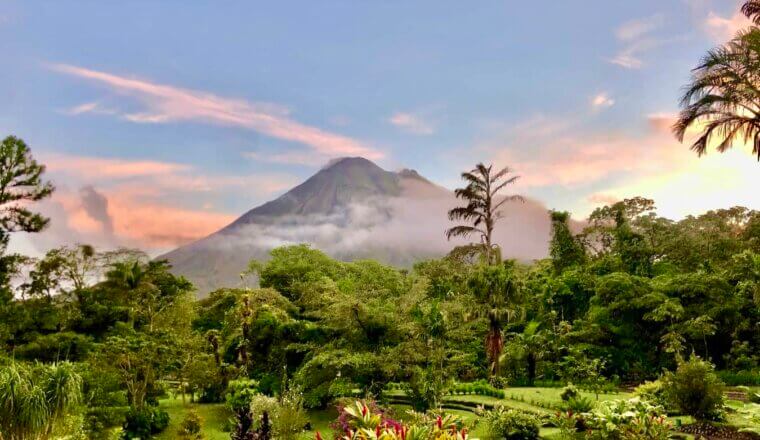
Do You Need Travel Insurance for Costa Rica?
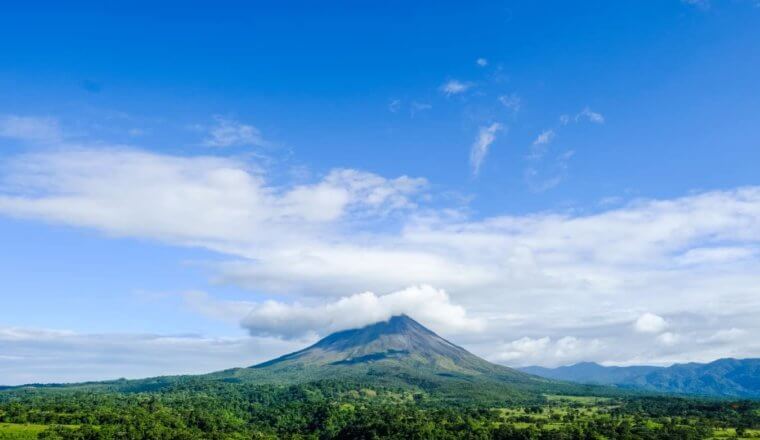
The Best Tour Companies in Costa Rica
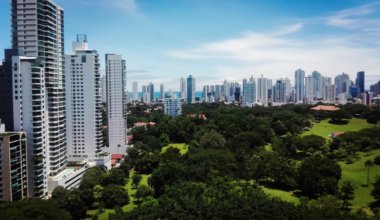
The 6 Best Hostels in Panama City, Panama
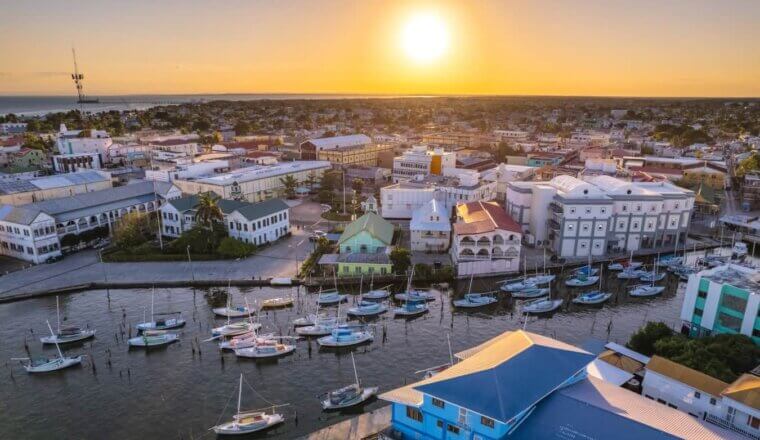
Is Belize Safe to Visit?
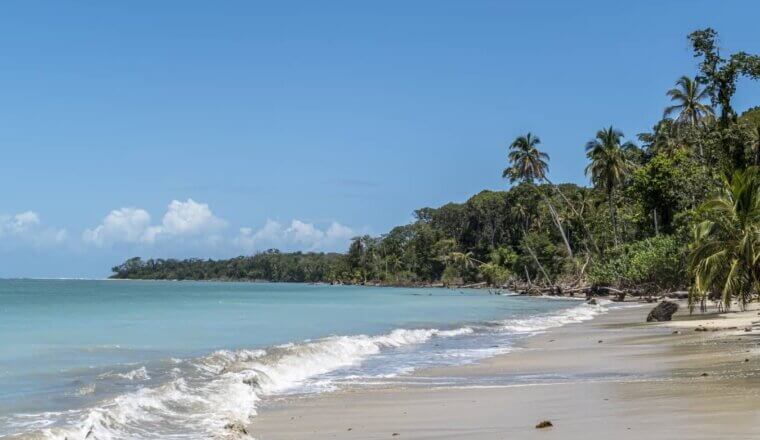
Is Central America Safe to Visit?
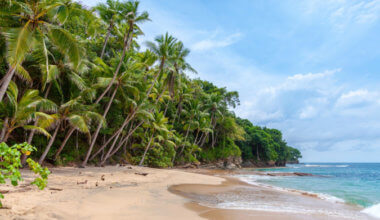
How to Get Around Central America on a Budget
Get my best stuff sent straight to you, pin it on pinterest.
- Where To Stay
- Transportation
- Booking Resources
- Related Blogs
Maddy's Avenue
By: Melanie Gordon (Contributor) · Last Updated: March 18, 2024
Is it Safe to Travel to Nicaragua? A Solo Female Traveler’s Perspective
By now, you’ve heard just how magical Nicaragua is. But before booking your plane ticket, you’re pondering the one question any sensible traveler would: Is it safe to travel to Nicaragua? (And if, like me, you’re a solo female traveler, then your concern is likely doubled!)
Just like many other countries in Latin America, Nicaragua is “dangerous.” Statistically speaking, the crime rate in Nicaragua is high . Violent crimes, like sexual assault and armed robbery, are not uncommon. So, of course, it’s true that you could easily find yourself in a less-than-desirable situation.
But don’t let the numbers and travel advisories scare you off.

After living in Nicaragua (and falling in love with the country), I can tell you that there’s a big difference between what the numbers say Nicaragua is like, and how it really is – when you visit as a tourist.
In short, traveling to Nicaragua can be safe *, but only if you prepare yourself and get informed.
In this post, I’m going to break down everything you need to know about Nicaragua safety – whether you’re a solo female traveler or not.
Is Traveling to Nicaragua Safe?
Boasting wild jungles, Caribbean islands, two coastlines, many volcanoes and lakes, and authentic culture, intrepid travelers love Nicaragua. Compared to Costa Rica and Belize , Nicaragua is one of Central America’s less-developed countries. Which, on one hand, means lush, untrodden landscapes and countless other reasons to visit Nicaragua . But on the other, increased possibilities of danger…
If you visit the U.S. Department of State website, you may be ready to cancel your visit to Central America before you even book it. However, if you’re an experienced traveler, if you’re familiar with life in urban areas, and if you have common sense, you will (most likely) enjoy safe travel through Nicaragua.
Remember, there is no such thing as being totally safe. No matter where you are in the world! But there are ways to greatly mitigate your risk of all kinds of danger.

Stats & Facts on Nicaragua Travel Safety
- The U.S. Department of State lists Nicaragua as an orange, “Level 3” advisory, suggesting that you should “reconsider travel” and “exercise increased caution in Nicaragua due to crime.”
- The Statista Research Department states “the world’s most dangerous cities are located in Latin America”, due to gang violence from drug trafficking.
- In urban cities like Managua and San Juan del Sur, violent crime is more common.
- Nicaragua often has poor road conditions and unsafe driving practices.
- Nicaragua has 19 active volcanoes, miles of un-lifeguarded beaches, and no cell phone service in many areas with unpatrolled hiking trails.
- National disasters, civil strife, poor economy, and general lack of resources have greatly affected the lives of kind-hearted Nicaraguan people for many years.
- Much of the water in Nicaragua is not safe for drinking.
- Nicaragua has 15 species of poisonous snakes , many poisonous frogs, and plenty of other dangerous wildlife on land and water.
Maintaining safety in Nicaragua, and anywhere , requires awareness of your surroundings, common sense, and some planning ahead.
Now that the facts are out of the way, let’s dive deeper into answering your question: Is Nicaragua safe to travel to?
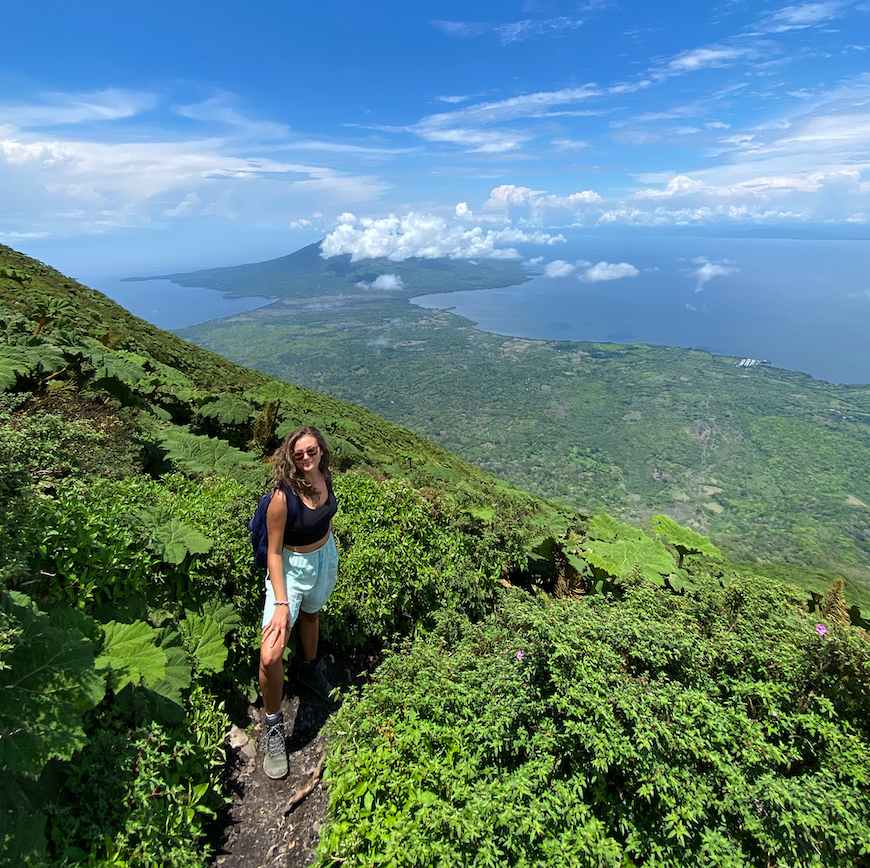
My Experience in Nicaragua
After living in Nicaragua for many months (in tourist areas like Laguna de Apoyo and Granada ), I can sum up my thoughts about Nicaragua travel safety into a few sentences:
My safety is my top priority. I remain vigilant and familiarize myself with local laws. I watch my footing in nature – beaches and jungle alike. (Stepping on a scorpion again is not on my wishlist.) I do my best to play it safe when it comes to adrenaline-inducing activities like surfing, and limit my time on motorcycles. I always hold my bags close to me in markets or cities such as San Juan del Sur, and don’t share conversations with just anyone.
With the above safety practices – and maybe a little luck, too – I have not been a victim of violent crime while in Nicaragua, or Central America for that matter. I feel more vulnerable to violent crime in the United States than I do living in Nicaragua.
Petty crime, however, is rampant, due to desperation and lack of resources for many people. If you leave a pair of Havaiana flip flops outside, for example, they likely won’t be there in the morning.
General Safety Tips for Nicaragua Travel
#1. learn to speak spanish.
This shows respect to locals, and increases your chances of positive experiences. You’ll be able to avoid scams, getting lost, or saying something totally offensive to the wrong person!
#2. Be Mindful of Your Public Presence
There are some easy ways to lower your exposure to violent crime: don’t go out at night; use the buddy system; travel during daylight hours only; don’t flash expensive goods; don’t wear overly revealing clothing; and obey local laws.
Basically, use common sense. Be a low-profile, respectful tourist and you’ll likely be fine.
#3 Stay Out of Politics
If you’re going to speak about political ongoings and the Nicaraguan government, then speak well of them. A better idea would be to avoid getting involved in, or discussing, politics at all. You should also stay away from political protests and other demonstrations.
#4. Respect Mother Nature and Wildlife
There isn’t a place in the world that’s completely safe when Mother Nature strikes. Nicaragua is prone to natural disasters like earthquakes, hurricanes, and tsunamis – which have devastated the lives of many locals. Know common local practice for emergencies.
Do research about the land you’re on, and the plants and animals you could encounter. Wear shoes in nature to avoid stepping on a dangerous (and equally as scared) creature. Hike with friends or reputable tour guides so you don’t get lost or injured and stranded.
Find a non-toxic mosquito repellant to mitigate disease. If you have a nasty wound or bite, go to urgent care.
By the oceans, a lways be mindful of riptides and swells – no lifeguards here!
#5. Choose Your Food & Drinks Wisely
Every time you eat, there’s always a risk of food poisoning, but if you choose wisely, you’re sure to enjoy some amazing street food in Nicaragua. Here are some essential food safety tips.
- While in Nicaragua, only drink bottled water . Make sure to double-check that the water and ice you drink in restaurants is made from filtered, bottled water.
- It’s a great idea to get a GRAYL GeoPress Filter Water Bottle that filters out all waterborne pathogens (virus, bacteria, protozoan cysts), pesticides, chemicals, heavy metals, and microplastics. That way, in a pinch, you can drink whatever water you can find!
- Always choose restaurants where plenty of other people are dining, this shows that ingredients are fresh (high turnover) and potentially a clean kitchen… And good food!
- Be sure to maintain electrolyte balance and eat lots of immune-boosting foods such as fruits and veggies, ginger, and turmeric.
- Fresh, uncooked veggies (like lettuces) and other produce that don’t have peels pose higher risk because you don’t know if they’ve been properly cleaned.
- Taking a daily probiotic is a good idea to keep your gut flora happy. (These shelf-stable probiotics are perfect to travel with.)
Check out this must-read article for more food safety tips: How to Keep a Happy Tummy While Traveling in Developing Countries
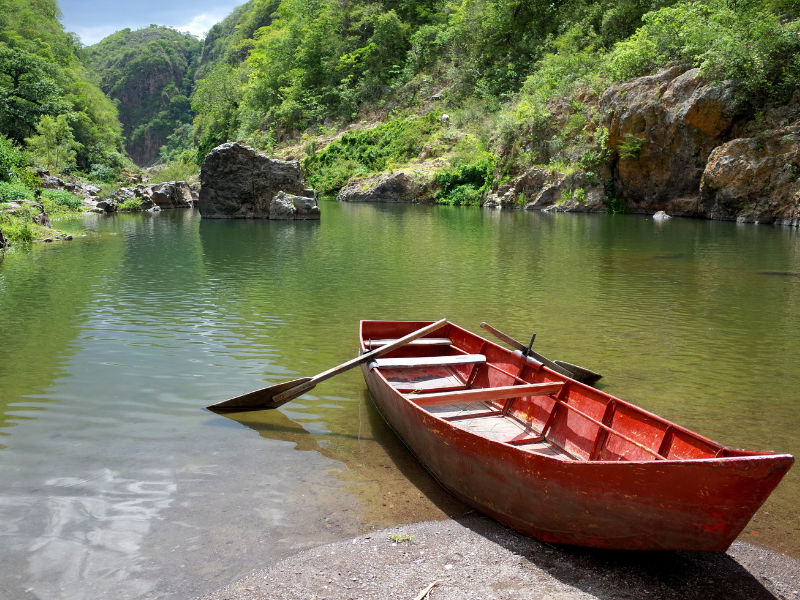
#6. Bring a Personal First-Aid Kit
When you travel in Central America, it’s a good idea to be prepared for whatever comes your way. One of the simplest, but most important things you can do? Pack a personal health and safety kit!
Some things you should pack include:
- Vitamins for your specific needs ( liposomal vitamin C , vitamin D , and zinc are always a good idea!)
- Feminine hygiene products (buying a menstrual cup , like the DivaCup , is amazing because you don’t have to carry around millions of tampons; plus, with no waste or no nasty chemicals, the DivaCup is better for your health and the environment.)
- Antihistamines (allergy pills for general allergens and/or anti-itch cream for bug bites) are another must
- Bandaids (of all shapes/sizes) , of course!
- Antibiotic ointment , like Neosporin
- Shelf-stable probiotics , to keep your gut flora happy and avoid traveler’s diarrhea
- Good tweezers , for stings, splinters, and more
- Natural bug spray , to keep mosquitoes (and the diseases they carry) away
- Natural, reef-safe sunscreen , better for you, better for the environment
- GRAYL GeoPress Purifying Water Bottle , so you can safely drink any water in a pinch
#7. Keep Track of Your Personal Belongings
Especially in bus stations, rural areas, hostels, and major urban areas like San Juan del Sur or Managua, keep your things close. Always keep your money, passport, and valuable items on your person or in your carry-on while traveling.
In hostels, always use a lock and put everything in your locker. In hotels, be sure to use the safety deposit box, if you have one. This TSA-approved lock is great for lockers and to secure your luggage while you travel.
Going to the beach? Just wear your swimsuit, and leave everything else at home. If you leave anything on the sand while you’re swimming, it probably won’t be there when you get back.
Basically, just keep your belongings locked up or in your sight at all times. Also, always keep doors locked (while in the house or car, etc.), just in case.
#8. Travel Smart
Always make sure taxi drivers have an official Nicaraguan Tourism Board (Instituto Nicaragüense de Turismo) sticker. This way you can avoid taxi scams, kidnapping, and more. On this website , you can book safe transportation options in advance with officially licensed drivers.
Travel only during daylight hours , and know that public transport carries higher risk. If you can afford it, trusted, private transportation is best.
If you’re on a motorcycle, WEAR A HELMET! Watch out for other drivers, and please, do not speed. And remember, during Nicaragua’s rainy season , dirt roads get very muddy, sticky, and slippery!
Something else to be careful with is asking for rides. Though it’s common in places like Ometepe – and the few times I’ve done it were fine – hitchhiking is a very easy way to end up in trouble . If you must, avoid doing so in rural areas, and only in daylight hours.
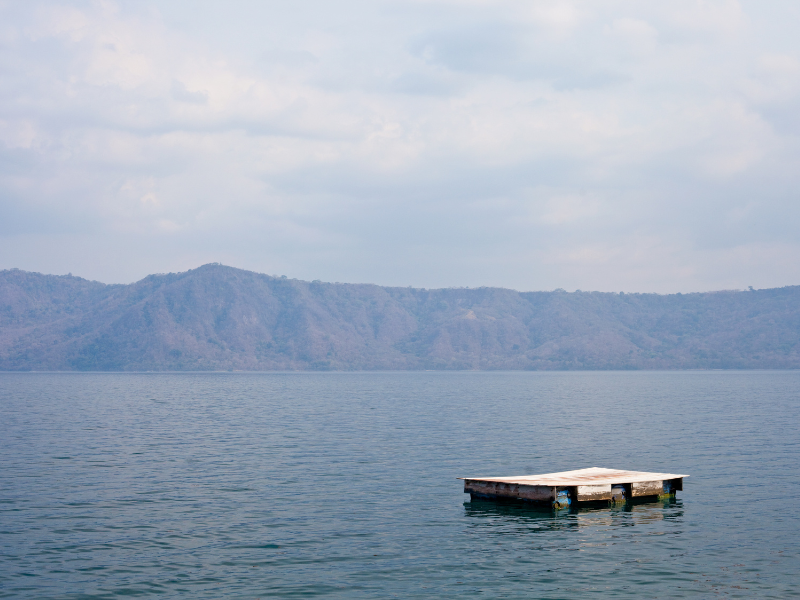
#9. Know that You’ll Have Access to Health Care
If you find yourself needing medical attention in Nicaragua, don’t freak out!
The universal healthcare for Nicaraguan citizens applies to travelers, too. This means free care at decentralized clinics and public hospitals.
In cities like Leon, Managua, Granada, San Juan del Sur, and surrounding towns, you’ll likely have more than one medical facility to choose from. There are even public hospitals on the island of Ometepe!
Nicaragua has 32 hospitals total. Private hospitals are aplenty as well, and offer specializations, though this care comes with a bill.
In my experience, at a private laboratory in Rivas, I paid a fraction of what I’d pay for the same blood tests in the US. I’ve also had two friends receive care at public hospitals without any issues. Note: Medications are not free.
Another thing to note is that you can buy antibiotics , as well as many other medications (that would usually require a prescription) without a prescription , at any pharmacy . The pharmacies in Nicaragua have an arsenal of vitamins and natural herbs and remedies, too.
Important note: You cannot purchase an at-home COVID-19 test anywhere. If necessary, you will have to travel to Managua to purchase a PCR or Rapid Antigen test.
#10. Stay Away from Illegal Drugs & Activities
This should go without saying, but it’s wise to stay away from illegal drugs and other illicit substances and activities. Whatever it is, it’s not worth it.
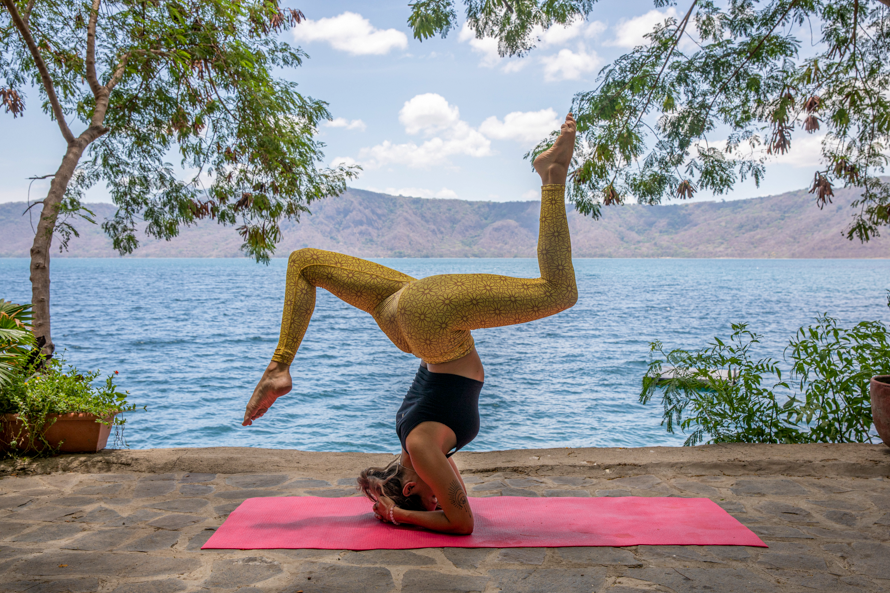
Is Solo Female Travel in Nicaragua Safe?
Is Nicaragua safe for solo female travelers? In short, the answer is yes . Solo female travel In Nicaragua is safe…
Many people think I’m crazy for traveling here alone. However, I’ve met tons of other solo female travelers in Nicaragua who get along just fine.
Here are some of my top tips for solo female travel in Nicaragua.

Nicaragua Safety Tips for Solo Female Travelers
#1. take precautions.
Although I’ve never had to use them, I travel with pepper spray (you CAN fly with this pepper spray , it’s TSA-approved) and a taser flashlight ; these are comforts I prefer to have. Traveling alone as a female anywhere is more risky than traveling alone as a man.
I will add, Nicaragua is culturally conservative, so covering up is a good idea. In addition to respecting local culture, not showing too much skin is a good way to keep yourself from experiencing unwanted attention or encounters.
#2. Dress Conservatively
Long, loose pants and light colored shirts will keep you cool in the heat, as well as keep you under the radar. Of course, this is merely a suggestion, but it stems from my own personal experience.
#3. Use Your Intuition
As women, intuition is one of our many superpowers. If you don’t have a strong connection to yours, I suggest uncovering it before traveling solo.
I know myself to be a good judge of character, I also sense the energies of those around me. If I’m choosing a seat on a bus, I don’t sit in close proximity to someone who gives me an icky feeling. Duh.
#4. Keep to Yourself
For my safety, I make a point to avoid eye contact with men, and I don’t carry on conversations with anyone who wants to know details about my travel plans. As a warm and friendly person, sometimes this is out of my nature, but it’s for the best.
Nicaragua is a Destination for Experienced Travelers
Nicaragua is best for those with traveling experience. If you’ve never left North America, for example, I recommend starting in a Central American country like Belize or Costa Rica. In general, there are more English-speakers and better infrastructure. Experience is invaluable.
For example, familiarity with navigating public transportation can save you from ending up in the middle of nowhere at night, with no reception. (Side note: It’s best not to travel at night, anywhere in Latin America.) Visit Nicaragua after you have a few more touristy countries under your belt. And definitely have some basic Spanish speaking skills!
Ultimately, the less risk you take, the less chance of a bad experience.
In an effort to enjoy your travels, here are some tips and knowledge of best practices to keep you and your belongings safe. You don’t have to learn the hard way!
Travel Insurance for Nicaragua Travel
Whenever you travel overseas, you should take out a travel insurance policy – but especially when traveling to more intrepid destinations like Nicaragua. Travel insurance covers you for travel inconveniences (like lost luggage and travel delays) as well as serious health and safety incidents where you may need to pay overseas medical costs or require emergency services or medical evacuation.
Note: Just because you may have access to decent, cheap – or even free – healthcare abroad does not mean that you shouldn’t buy travel insurance. If a serious incident occurs, where you require high-quality care and/or a medical evacuation back to your home country, you will be glad that your travel insurance policy has your back.
If you’re traveling to Nicaragua soon, then click here to take out a travel insurance policy .
MORE NICARAGUA TRAVEL INSPIRATION
- The Ultimate Nicaragua Itinerary (For 1, 2, or 3 Weeks)
- 10 Reasons to Visit Nicaragua ASAP: Central America’s Hidden Gem
- Nicaragua Rainy Season: What to Know & Why You’ll Love It!
- Laguna de Apoyo, Nicaragua Travel Guide: Where to Play, Stay & Eat
- 10 Unforgettable Things to Do in Granada, Nicaragua
- 11 Best Things to Do in Popoyo, Nicaragua + Must-Know Travel Tips
- Ometepe Island, Nicaragua Guide: Best Things to Do, See & Eat!
Nicaragua Travel Safety FAQs
Despite the alarming statistics and preconceived notions you may have about safety in Nicaragua, it is usually very safe for tourists in Nicaragua. There are many ways that travelers can decrease their exposure to safety risks, such as: using common sense, not traveling outside of daylight hours, keeping a watchful eye on their belongings and surroundings, bringing a personal first-aid kit, dressing conservatively, not calling attention to themselves (with disrespectful behavior or flashy items, for example), following the local laws, and more. This article answers the question “Is traveling to Nicaragua safe?” in depth, while providing essential safety tips and information for all types of travelers – including solo female travelers.
Popular tourists areas in Nicaragua are generally the safest parts of the country to visit. The safest parts of Nicaragua include Granada, Laguna de Apoyo, Ometepe Island, the Corn Islands, and more.
September and October are the rainiest months in Nicaragua. Any time between November through August is a great time to visit Nicaragua.
Is it Safe to Travel to Nicaragua?
So, is traveling to Nicaragua safe? Well, if you take to heart all of the tips above and decide that traveling to Nicaragua is right for you , yes!
Commit to your safety, exercise caution, and do your own research, always.
Traveling to developing countries like Nicaragua presents experiences that broaden our perspectives of life. Sometimes it takes travel to uncover desire for a simpler way of life. A way of life that comes with a different set of risks and challenges than those of the “modern” world.
I hope this has brought you closer to feeling confident in making the best decision for you !
Did you know…
When you book travel or purchase something through our links, we receive a small commission, at no extra cost to you ? Your support enables Maddy’s Avenue to keep producing helpful travel content. Thank you!
- Book a HOTEL : This is my favorite website for scoring amazing deals on accommodation worldwide – from luxe beach resorts to chic city stays, and everything in between.
- Shop my favorite TRAVEL GEAR : A collection of all of my must-have travel gear.
- Book a HOSTEL : If you’re traveling on a budget, this is the best website to score cheap hostel deals.
- Book a VACATION RENTAL : The best site for finding the perfect vacation rental for an unforgettable getaway.
- Purchase TRAVEL INSURANCE : Never go on a trip without travel insurance. If you travel regularly or are a remote worker, SafetyWing has an amazing monthly subscription for digital nomad insurance! I currently use SafetyWing .
- Book GUIDED TOURS & EXCURSIONS : Many of the tours I recommend are hosted with Viator, which works with local tour operators.
- Find CHEAP FLIGHTS : My favorite flight fare aggregator for finding the cheapest flights.
- Get an eSIM FOR YOUR PHONE : Instantly connect your phone up to a local data plan with an eSIM . It’s cheap and super easy!
Have any questions about Nicaragua safety? Or traveling to Nicaragua in general? Leave your thoughts below, we read and reply to every comment.
*Of course, whether you travel to Nicaragua or not is up to you. This blog post shares only personal experience. No one is liable for any personal risk that you take on , except for yourself .
Join the adventure.
Be the first to know when new travels or recipes are published! Plus, gain FREE access to my Know-Before-You-Go Travel Guide!
About Melanie Gordon (Contributor)
Melanie contributes travel writing and photos to Maddy's Avenue. Melanie began traveling after life threw her a major curveball in the form of a condo fire. Losing everything (including her beloved cat, Moby) presented her with the opportunity to turn a tragedy into a catalyst for growth. With nothing to lose, she set out for a solo “soul searching” journey. Turns out, this curveball set her path straight in the direction of her destiny. Through work like website design, travel writing, and sharing her passion of teaching yoga and hula hooping, she’s found the life she’s always envisioned. Follow along for more of Melanie’s travel writing, and reach out through her website or Instagram (livinginflowco.com & @livinginflowco).
You’ll Also Love
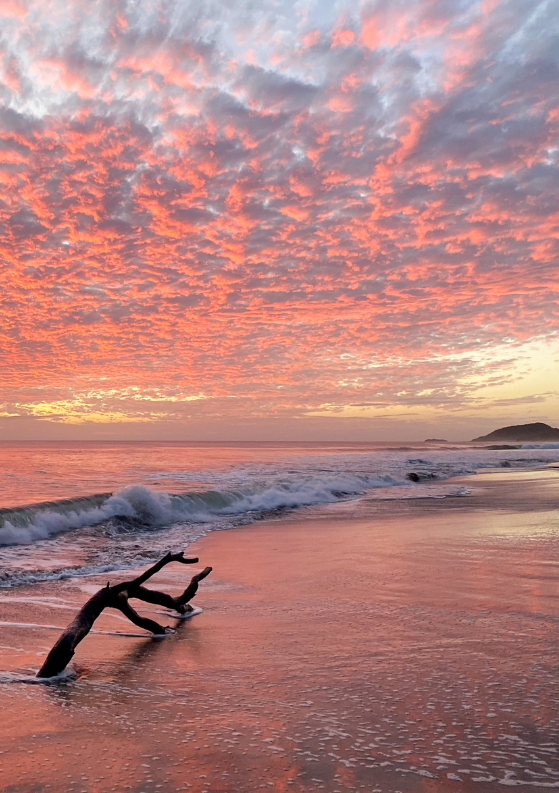
Leave a Reply Cancel reply
Your email address will not be published. Required fields are marked *
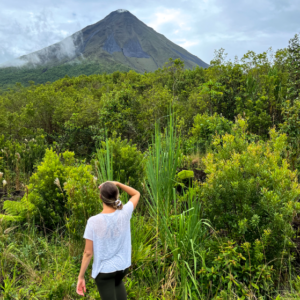
Costa Rica Rainy Season: Why it’s Best & What to Know!
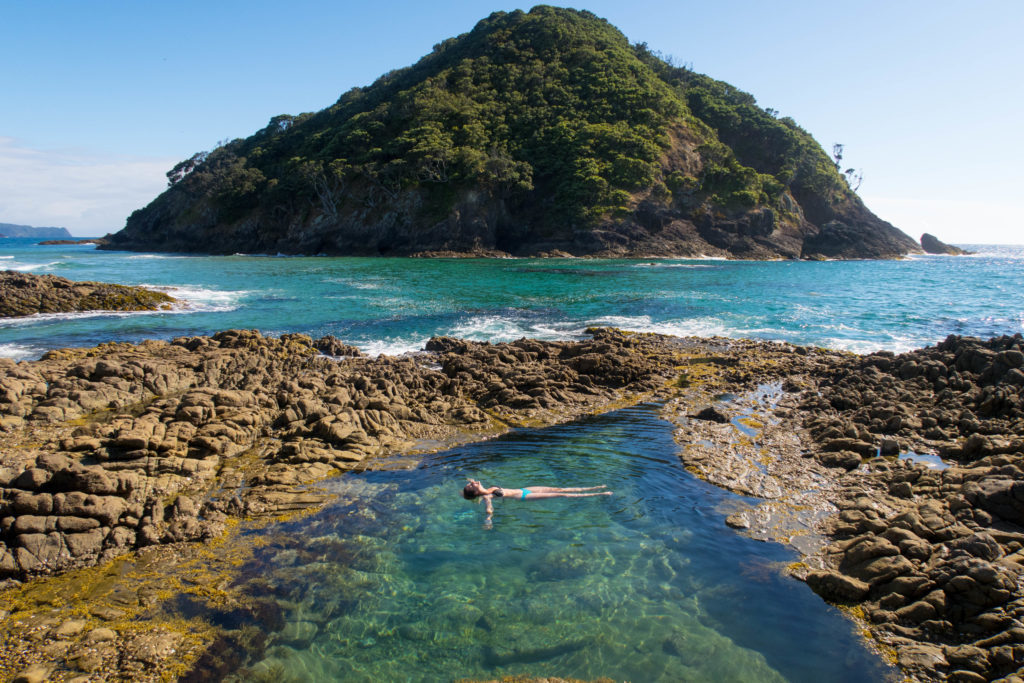
Be the first to know when I publish new recipes or travel guides. Plus, gain FREE access to my Know-Before-You-Go Travel Guide!
Maddy's Avenue is here to inspire you to live a bold life : to discover yourself and the world around you at greater depths – one forkful, or one plane ticket, at a time. Learn more...
- About Maddy’s Avenue
- Terms & Disclosure
- Destinations
- Adventure Travel
- Digital Nomad Travel
- Luxury Travel
- Foodie Guides
Affiliate Disclosure
Maddy's Avenue shares affiliate links to recommend products we love and earn commissions from purchases you make. As an Amazon Associate, we earn from qualifying purchases. Learn more...
Copyright © 2024 Maddy's Avenue · Theme by 17th Avenue
You cannot copy content of this page.
First-timer’s guide to Nicaragua

Oct 10, 2023 • 6 min read

Nicaragua has retained its off-the-beaten-path feel ©adamdodd/Getty Images
Supported by
The largest country in Central America - dubbed the land of lakes and volcanoes - Nicaragua has retained its off-the-beaten-path feel, and much of it has been preserved rather than developed.
Whether you want to feast on gourmet local produce, taste top-notch rum, wake up and smell the organic coffee surrounded by Spanish-colonial architecture, lounge on idyllic white-sand beaches beneath swaying palms, clamber over – and surf down – active volcanoes, ride some big waves or go monkey-spotting in lush forests, Nicaragua has something for you.
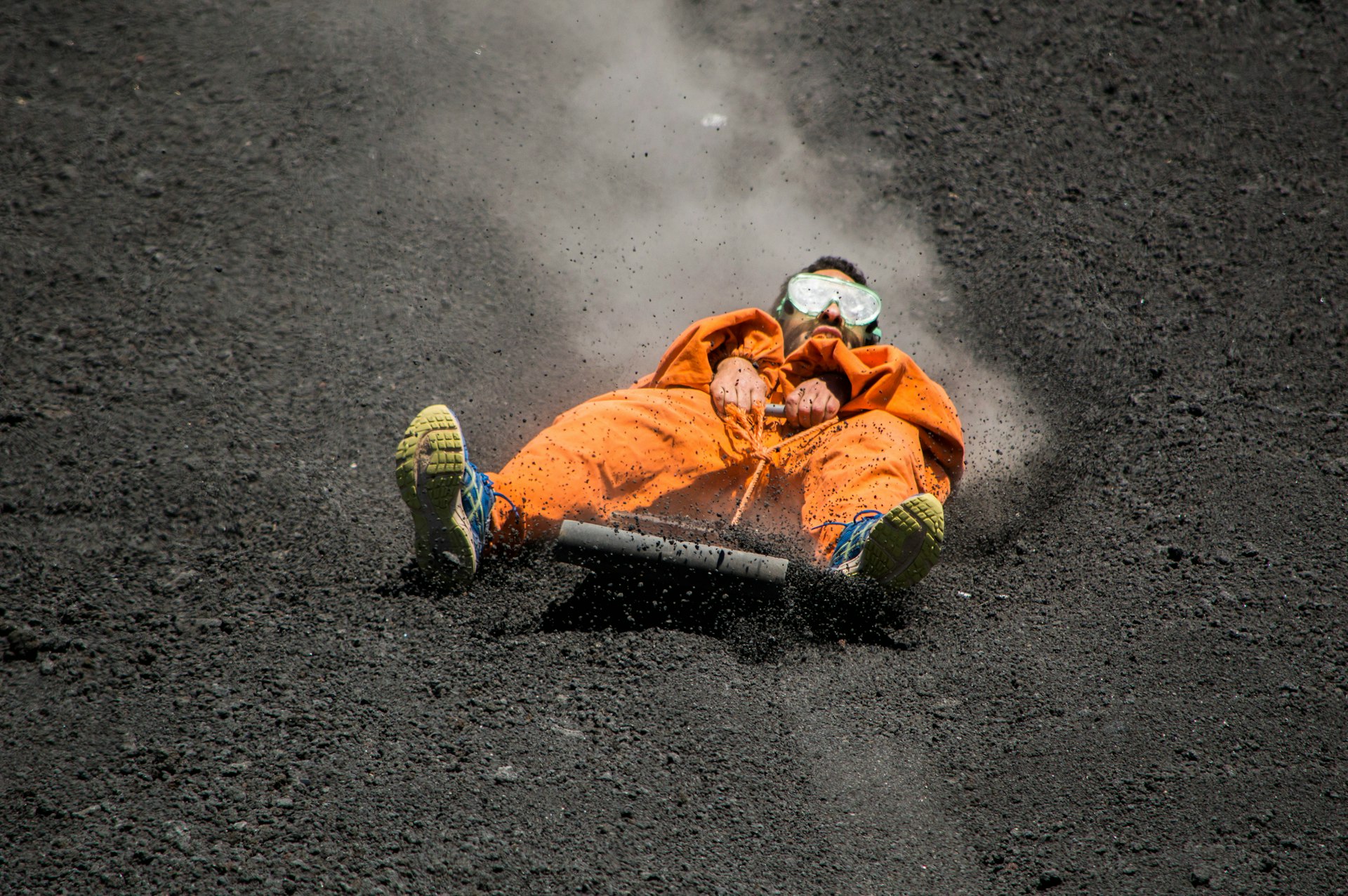
When should I go to Nicaragua?
Subtropical Nicaragua is a year-round destination with two distinct seasons: hot and dry from November to May and hot and wet from June to October, aka the "green season". The rains usually come in short, sharp bursts in the late afternoon, with plenty of sunshine the rest of the time; September and October are the wettest months.
Nicaragua is at its most popular (and most expensive) over Christmas, New Year and Easter, when towns and cities hold colorful religious festivals and Nicaraguans flock to the beaches.
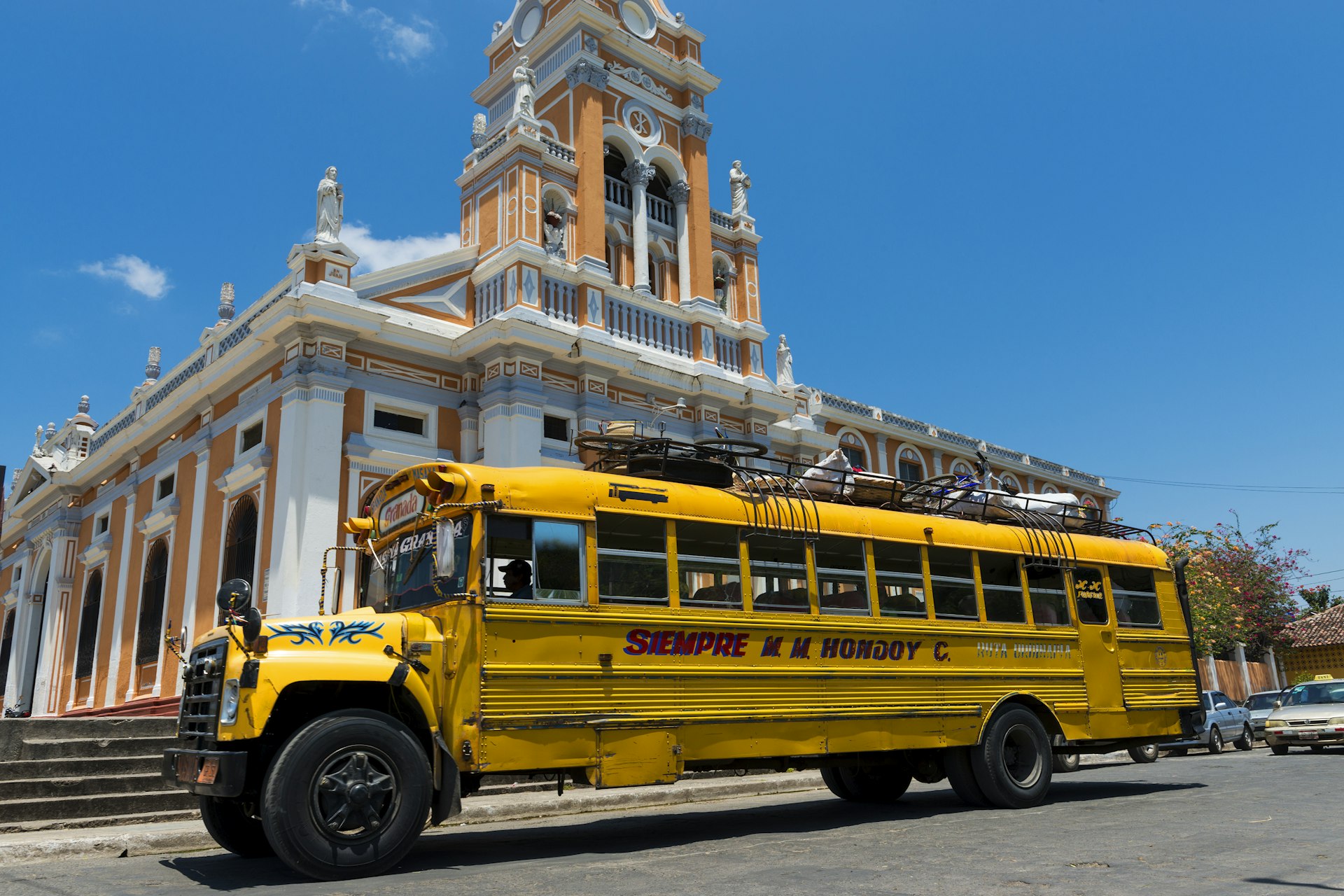
Is it easy to get to and around Nicaragua?
Nicaragua’s international airport is Augusto C. Sandino in Managua , and there are direct flights from Miami and Fort Lauderdale in the US , Mexico City and Panama City , and plenty of connecting flights.
If you’re traveling around Central America by bus, Transnica covers Costa Rica, Honduras, and Nicaragua, while Transporte del Sol operates in Guatemala, El Salvador, Costa Rica and Nicaragua.
You can also get around the country on local buses, whether "chicken buses" – reinvented North American school buses that rattle along at breakneck speed – or good-value long-distance coaches that are reasonably comfortable.
La Costeña offers daily flights from Managua to Great Corn Island and ferries cross Lake Nicaragua to Isla de Ometepe and the Solentiname archipelago. Explore the historic centers of Granada and León on foot, but taxis are cheap and plentiful if you want to go further afield.
How long do I need in Nicaragua?
In a week, most visitors skip Managua and head straight to colonial-era Granada , on the shores of Lake Nicaragua. After you’ve explored the city, its lakes and volcanoes, take a puddle jumper to the Corn Islands, bus it to the beaches of San Juan del Sur, chill on the volcanic isle of Ometepe, or surf down an active volcano in Léon.
In two or three weeks, you could cover all the above and add on a visit to the lush Solentiname islands and their primitivist artists, or take a jungle journey along the Río San Juan , the watery frontier with Costa Rica. And with more time, you could brush up your Spanish at one of the many wallet-friendly schools.

Top things to do in Nicaragua
1. peer into a volcanic crater in granada.
Granada is one of Central America’s oldest and loveliest cities, all postcard-pretty plazas, ornate churches and cobbled streets lined with rainbow-coloured houses, where locals drag their rocking chairs onto the streets to catch up with their neighbors.
But you’re never far from nature. Spend an evening peering into Masaya Volcano’s crater as luminous orange molten lava bubbles away below you, discover its string of volcanic isletas (islets) by kayak, hike through – or zipline above – Mombacho Volcano’s cloud forest, cool off in the crater lake of Laguna de Apoyo, and visit the skilled artisans of Masaya and the Pueblos Blancos .
2. Ride the Pacific rollers
Stellar waves and wild beaches line Nicaragua’s Pacific coast, and it’s long been a haunt of surfers in the know . To the south, laid-back San Juan del Sur is surf-and-party central – the Sunday Funday Pool Crawl is a backpacker legend. But the surfing is better out of town – Playa Maderas , 20 minutes north, has the best beach break, while mellow Playa Remanso, 15 minutes south, is perfect for novices.
In Popoyo, around 75km (47 miles) to the north, the surf breaks have the most consistent swells for wave riders of all levels, with rentals and surf schools aplenty.
3. Surf down an active volcano
Adrenaline junkies can climb up and whizz back down the black ash slopes of still-rumbling Cerro Negro volcano on a specially designed board, hitting speeds of up to 100kph (60mph).
Nicaragua’s youngest volcano is a short hop from Léon , the northern colonial-era capital that’s home to the largest cathedral in Central America.
Léon has the buzzy feel of a university city, with eclectic museums including the Museo Histórico de la Revolución , and art, from the contemporary Museo de Arte Fundación Ortiz-Gurdián to street murals.
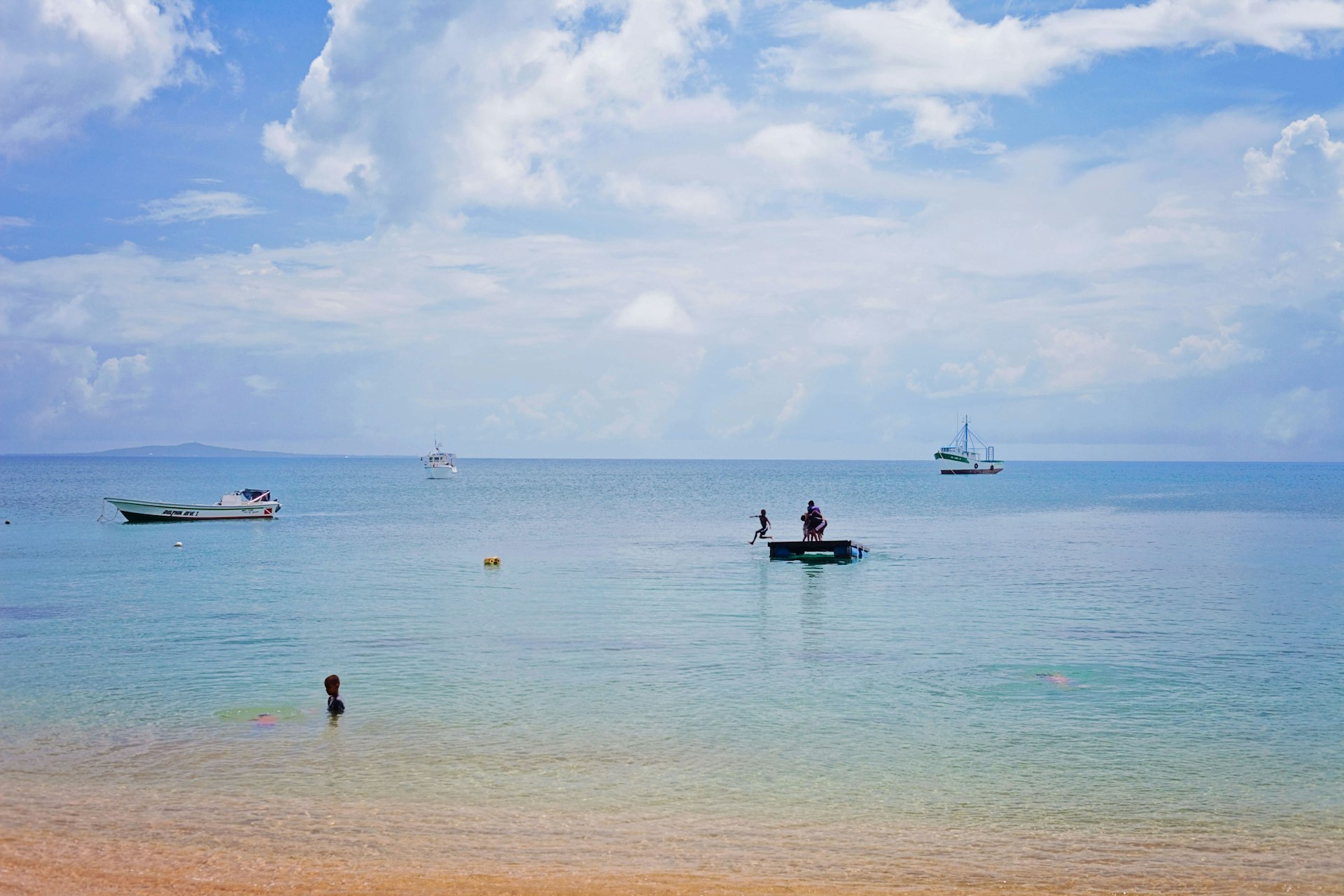
4. Kick back in the Caribbean
Around 70km (43 miles) off Nicaragua’s east coast, the pocket-sized Corn Islands tick all the Caribbean boxes – palm-fringed, icing-sugar sand beaches, gin-clear water and a chilled-out vibe – without the hefty price tag.
Car-free Little Corn is a short flight from Managua followed by a bouncy 40-minute boat ride from Great Corn. Snorkel and scuba the pristine reefs, flop into a hammock for a front-row view of the sunset, then dine feet-in-the-sand on just-caught fish to a reggae soundtrack.
5. Enjoy volcanic island life
The twin-coned volcanic Isla de Ometepe rises out of the silver-flat surface of Lake Nicaragua, and both fertile, dormant Volcán Maderas and rocky, fiery Volcán Concepción make challenging climbs.
Less strenuous is the beautiful cloud forest hike to the San Ramón waterfall , wildlife-watching from a kayak along the green-fringed Istián River, howler-monkey spotting at Reserva Charco Verde and hikes to ancient petroglyphs. Or tour a community-owned coffee finca or a tree-to-bar chocolate farm before a feast of organic farm-to-fork fare at Café Campestre .
My favorite thing to do in Nicaragua
I love tucking into Nicaragua’s one-of-a-kind dishes. Nacatamales are flavorsome parcels of corn dough stuffed with marinated spicy pork or chicken, rice, chilies, olives and more, all wrapped in a banana leaf and steamed.
Granada’s favorite street food is vigorón , an energy-boosting combination of boiled cassava and crispy chicharrones (fried pork rinds), topped with a tangy cabbage salad.
The country’s bountiful tropical fruits, such as mangos, guanábana (soursop) and calala (passion fruit), appear in batidas (shakes), top-notch coffee is grown on fertile volcanic slopes, while Flor de Caña’s 12-year-old naturally aged rum is rated one of the world’s finest. And now artisan chocolate makers, such as Argencove in Granada, are turning the country’s cacao into award-winning chocolate bars.
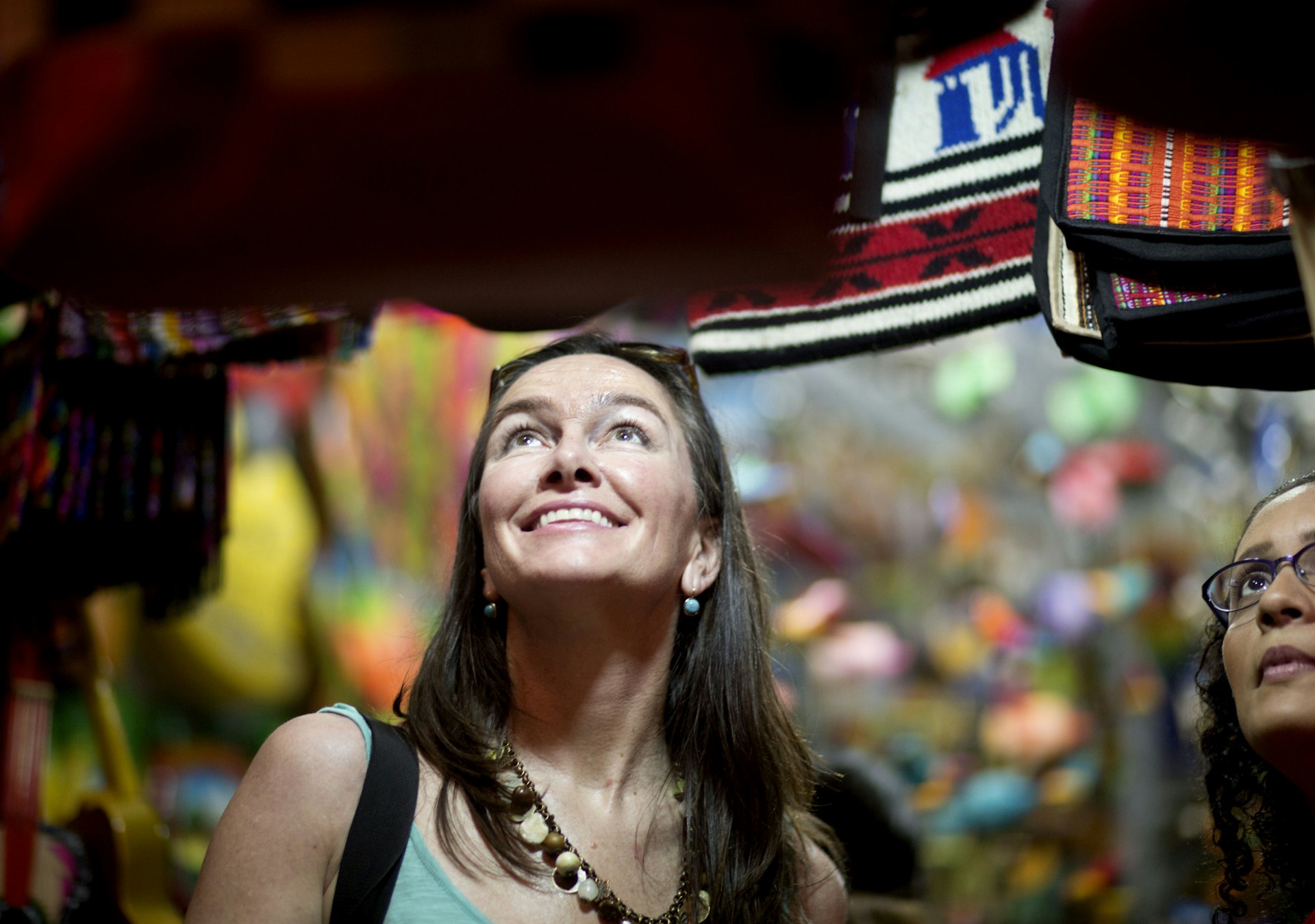
How much money do I need for Nicaragua?
Nicaragua is one of the cheapest countries in Central America. There’s accommodation to suit all budgets, from hostels and family-run guesthouses to eco-friendly boutique hotels and luxe resorts. Buses are a bargain, and you can fill up on street food, eat in a comedor (local restaurant) or splurge on fine dining.
- Hostel bed: from US$8
- Budget hotel room for two: from US$27
- Bus ticket: from US$1
- Dinner for two in a mid-range restaurant: from US$25
- Nicaraguan coffee: from US$2
- Local beer: from US$1.30
Is Nicaragua safe to visit?
Statistically, Nicaragua is the safest country in Central America after Costa Rica. Just take the same precautions you would at home. Don’t flash your cash or valuables in public places, and avoid isolated and dimly lit areas at night, especially if you’re alone – ask a local for advice on unsafe neighborhoods.
Order a radio taxi where possible, and if you rent a car don’t leave any valuables in it overnight. If you come across a demonstration, leave the area.
Editor's note: This article was sponsored by Nicaragua Tourism after the city was selected for Lonely Planet's Best in Travel 2024. Sponsors do not influence a destination's inclusion in Best In Travel, which is determined solely by Lonely Planet's editorial team.
Supported by Nicaragua Tourism
As a travel entertainment and inspirational media outlet, we sometimes incorporate brand sponsors into our efforts. This activity is clearly labeled across our platforms.
Funding for this story is provided by Nicaragua Tourism. All editorial views are those of Lonely Planet alone and reflect our policy of editorial independence and impartiality.
With sponsored content, both Lonely Planet and our brand partners have specific responsibilities:
Brand partner
Only provides financial support and their logo. Doesn't make revisions or approve the story.
Lonely Planet
We fully control the creative and editorial approach, just like any other featured story.
Explore related stories
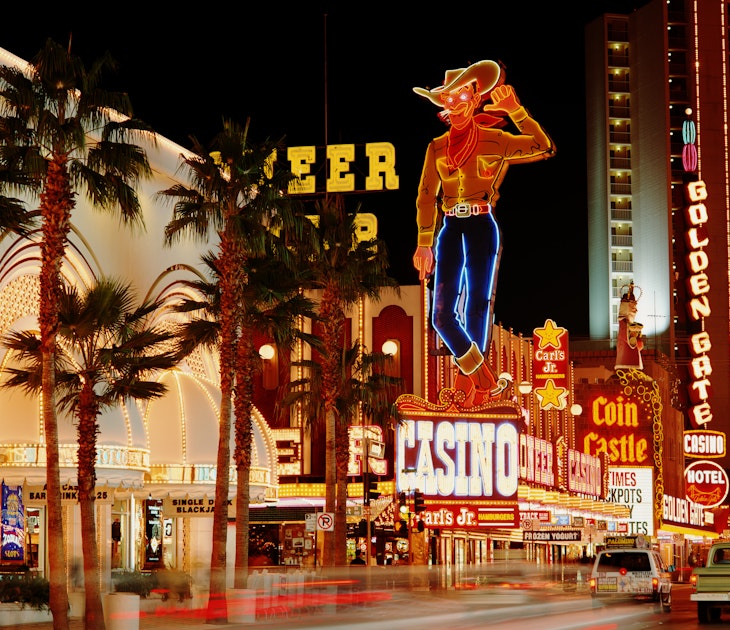
Apr 19, 2024 • 6 min read
How do I play against a blackjack dealer? What should I wear? Are drinks really free? If you’re new to gambling in Las Vegas, we have your answers.
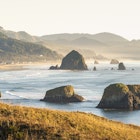
Apr 17, 2024 • 6 min read
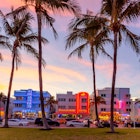
Apr 12, 2024 • 5 min read
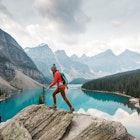
Apr 11, 2024 • 6 min read
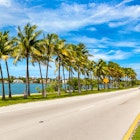
Apr 10, 2024 • 6 min read
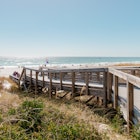
Apr 8, 2024 • 7 min read
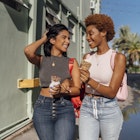
Apr 8, 2024 • 6 min read
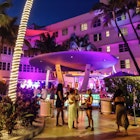
Apr 6, 2024 • 7 min read
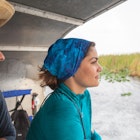
Apr 6, 2024 • 6 min read
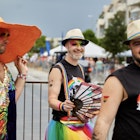
Apr 4, 2024 • 6 min read
- Destinations
- Mexico Travel News

Is Nicaragua Safe To Visit Right Now? Travel Advisory 2024
Nicaragua is a safe destination worth visiting, but given the high rate of crime and ongoing political unrest, visitors should proceed with caution.
Travelers should be aware of the political climate and potential for natural disasters in addition to general crime, which includes pickpocketing, robbery, and small-time theft.
Areas to avoid
Violent crime rates are highest in:
- Granada and San Juan del Sur
- La Rosita Siuna
- Corn Island
Major hotels, bus terminals, beaches, and markets are all potential locations for gang violence.
U.S. Travel Advisory – Level 3: Reconsider Travel
According to the U.S. Department of State, you should “reconsider travel” and “exercise increased caution in Nicaragua due to crime.” (Last Update: January 11, 2024 )
Government and law enforcement agents continue to target groups and people in Nicaragua who are thought to be adversaries of President Daniel Ortega and Vice President Rosario Murillo, his wife. Revocation of Nicaraguan citizenship, reentry prohibitions, expulsion, and other measures have been applied to U.S. citizens, including dual U.S. and Nicaraguan citizens. The following reports have been made to the government and its affiliates:
- Conduct searches on personal phones, computers, and documents for anti-government content, restrict the photography of government property, and occasionally seize devices.
- Systematically focus on individuals for political reasons, irrespective of nationality, including former allies, political activists, business representatives, clergy, human rights advocates, civil society leaders, academics, and members of the press.
- Arbitrarily target advocates of pro-democracy and their family members.
- Confiscate privately owned land, residences, financial assets, and personal belongings without prior warning or due process.
- Arbitrarily detain, accuse, and charge individuals with terrorism, money laundering, and organized crime offenses for political reasons without adherence to fair trial guarantees.
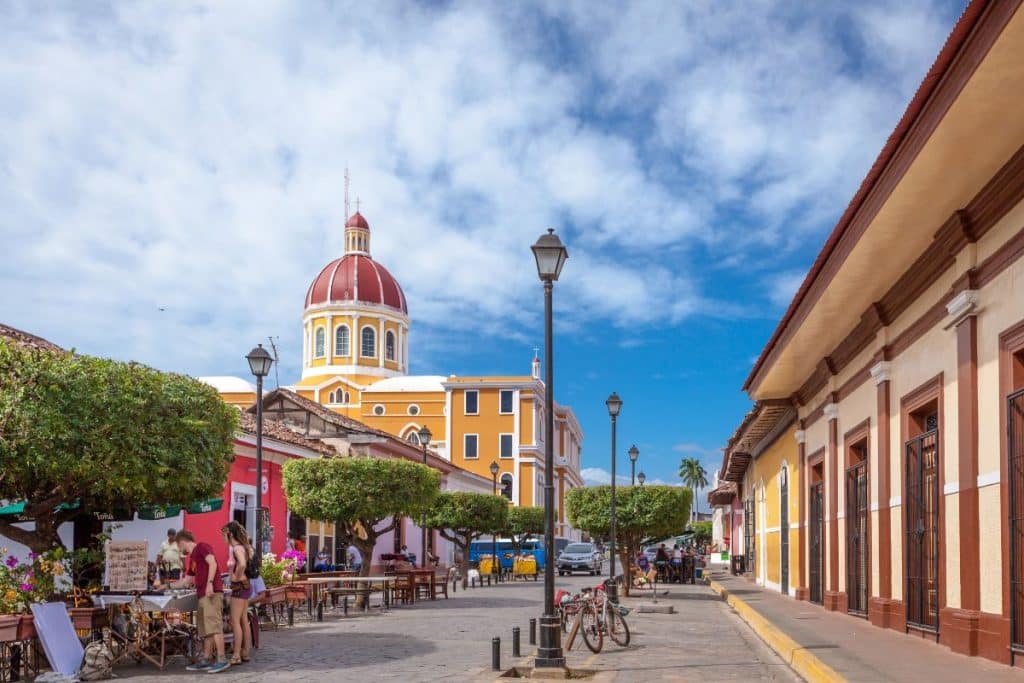
Canada Travel Advisory
Nicaragua’s political climate is unpredictable. Since April 2018, the nation has gone through periods of political unrest that have resulted in hundreds of detentions and deaths.
Government employees and law enforcement in Nicaragua have brutally suppressed anyone who is critical of or opposed to government policies since the 2021 presidential elections.
If you travel to Nicaragua:
- Avoid talking about the political situation in public or on the internet.
- Steer clear of any political activity.
- Refrain from sharing content on social media.
U.K. Travel Advisory
Protests and rallies have the potential to turn violent. Foreign participation in politics of any kind is prohibited in Nicaragua. You may be deported or placed under arrest for:
- Engaging in a protest against the government, such as a political gathering or campaign using the national flag of Nicaragua or its colors (blue and white)
LATEST UPDATES / NEWS from Nicaragua
January 26 – a priest and an exiled bishop denounce the nicaragua regime in los angeles.
An exiled bishop urged Nicaraguans living in the Los Angeles area to “fight for peace, liberty, and justice without ever losing hope or giving up”.
Days after several priests were detained by local authorities in Nicaragua, Auxiliary Bishop Silvio Báez of Managua and Father Edwing Román, who had been banished for openly criticizing the administration of Daniel Ortega and his spouse, Vice President Rosario Murillo, arrived in Los Angeles.
He addressed the hundreds of people gathered on January 6, many of whom were wearing hats and clothing with the Nicaraguan flag on them. “We Nicaraguans know well that in our history as a people we’ve lived through very dark periods in which terrible errors have been committed,” the speaker said.
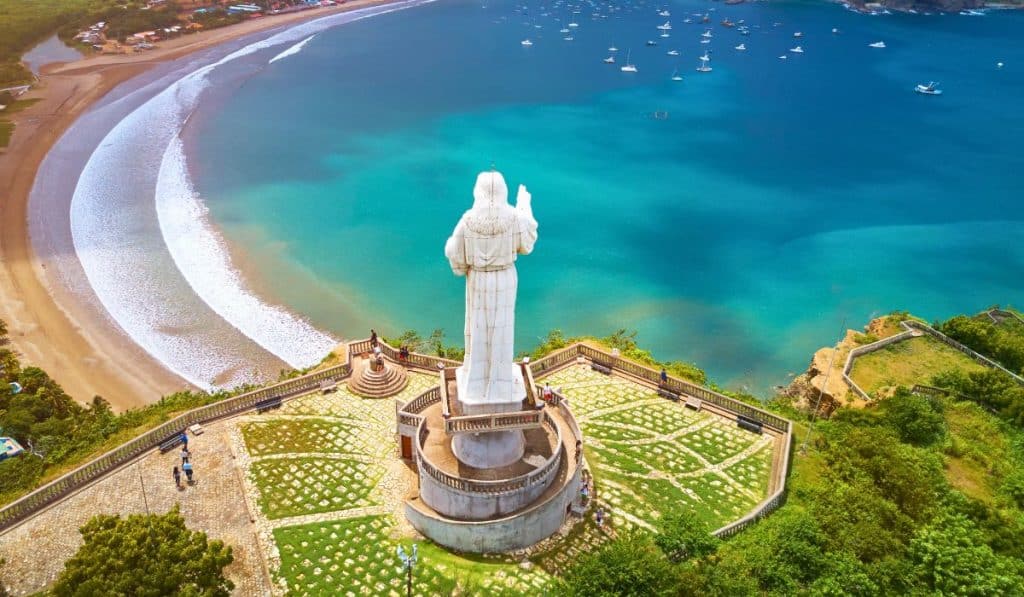
Tips for Staying Safe in Nicaragua
- Steer clear of isolated locations. Refrain from going out alone or during nighttime. Limit travel to recognized tourist areas.
- Be cautious of violent crime incidents in unofficial taxis. Opt for official taxis displaying a red number plate or those dispatched through radio communication. Avoid public transportation.
- Exercise caution along the Honduran border, where armed gangs are known to operate. Use only the highways crossing at Guassaule, El Espino, or Las Manos.
- Take note of the hurricane season, occurring from June to November. Hurricanes may lead to flooding and service disruptions. Familiarize yourself with the evacuation plan of your hotel or cruise ship and locate the nearest shelter.
- Nicaragua hosts three active volcanoes. Avoid hiking near these volcanic areas or exploring remote regions without an experienced guide.
Cookies on GOV.UK
We use some essential cookies to make this website work.
We’d like to set additional cookies to understand how you use GOV.UK, remember your settings and improve government services.
We also use cookies set by other sites to help us deliver content from their services.
You have accepted additional cookies. You can change your cookie settings at any time.
You have rejected additional cookies. You can change your cookie settings at any time.
- Passports, travel and living abroad
- Travel abroad
- Foreign travel advice
Safety and security
There is a high threat of terrorist attack globally affecting UK interests and British nationals, including from groups and individuals who view the UK and British nationals as targets. Stay aware of your surroundings at all times.
UK Counter Terrorism Policing has information and advice on staying safe abroad and what to do in the event of a terrorist attack. Find out how to reduce your risk from terrorism while abroad .
Terrorism in Nicaragua
Although there is no recent history of terrorism in Nicaragua, attacks cannot be ruled out.
Political situation
Demonstrations and gatherings can turn violent. It is illegal for foreigners to take part in any sort of political activity in Nicaragua. You can be arrested and detained or deported for:
- taking part in a protest
- breach of the peace
- any activity seen as acting against the government, including political meetings and campaigns
- using Nicaragua’s national flag or colours (blue and white) for campaigning or protesting
Demonstrations can also lead to travel disruption. Check local information before travelling.
Violent crime
Foreigners have been affected by violent crime in Nicaragua. Criminals often carry out attacks on people in vehicles. To reduce the risk to yourself and your belongings:
- keep the windows of your car closed and the doors locked
- avoid public transport after dark
Take care when walking around markets, bus stations, around the old cathedral in Managua and in the poorer areas of towns. Do not visit these areas after dark on foot.
If you are robbed, do not resist, as many criminals carry weapons. If you report the incident to the police, get a signed and stamped copy of the police report.
Taxi safety and ‘express kidnapping’
There is a risk of ‘express kidnapping’ if you use an unauthorised taxi. You could be taken hostage and forced to pay cash for your release.
Reduce the risk by:
- using a radio-dispatched taxi or an authorised taxi with red plates
- making sure the driver’s ID number, name and photograph are clearly visible on the dashboard
- making a note of the colour and number of the vehicle before you get in
It is a common local practice to share taxis with strangers, but tourists have been robbed when taking taxis called by strangers. Do not take a taxi if it has been called for you by someone you do not know well. You should also avoid using ‘colectivos’ (minibuses).
Sexual assault
If you’re a woman, use hotels that have staff at the front desk 24 hours a day and have adequate security measures. Read the advice for women travelling abroad .
Risks when exchanging money
There is a risk when exchanging money on the street that you could be assaulted or targeted by muggers. There are often money changers with official identification at the front of banks, where there is likely to be better security. You can also withdraw cash in US dollars or Nicaraguan cordobas from ATMs.
Laws and cultural differences
Illegal drugs and prison sentences.
Do not become involved with drugs of any kind. Possession of even small quantities can lead to imprisonment.
Flying drones
There are strict restrictions on the use of drones. Do not use drones for photography or any other reason, unless you have written permission from the Nicaraguan authorities.
Outdoor activities and adventure tourism
Swimming safety.
There are strong currents off sections of Nicaragua’s Pacific coast and people have drowned. There are no warning signs or lifeguards, and rescue equipment is not readily available.
Scuba diving
There have been fatalities from scuba diving off Nicaragua’s Caribbean coast. If you want to dive, contact a reputable diving company to find out about Nicaraguan waters. Nicaragua’s only hyperbaric chamber is in Puerto Cabezas, a 5-hour speedboat ride from Corn Island.
Transport risks
Road travel.
If you’re planning to drive a car, see information on driving abroad . You cannot drive or import right-hand-drive vehicles into Nicaragua.
You can use a UK photocard driving licence to drive in Nicaragua. If you still have a paper driving licence, you may need to update it to a photocard licence.
Driving standards and road conditions
The standard of driving is low and the condition of vehicles, particularly taxis and buses, is poor. There’s a risk of drivers failing to give way and driving dangerously, including under the influence of alcohol.
Road conditions are generally poor. There is no street lighting on the main highways between major cities and only minimal street lighting in towns. Avoid driving at night.
If you’re involved in a serious or fatal road traffic accident, you’re likely to be detained while it is investigated.
Boat and ferry travel
Although local law requires operators of water transport to have insurance, some still do not carry recognised insurance. Check the operator’s insurance cover before beginning your journey.
Extreme weather and natural disasters
See extreme weather and natural hazards for information about how to prepare, and how to react if there is a warning.
The hurricane season normally runs from June to November. Monitor the National Hurricane Center forecasts and the World Meteorological Organization warnings . Follow the advice of local authorities and obey evacuation orders.
Volcanic eruptions
A group of volcanoes, several of which are active, stretches the length of the country, in particular San Cristóbal, Masaya, Cerro Negro, and Telica and Concepción on Ometepe Island. Follow media reports and listen to local authorities if you intend to visit the area.
Do not hike on volcanoes without an experienced guide.
Earthquakes
There is a risk of earthquakes. The US Federal Emergency Management Agency has advice about what to do before, during and after an earthquake or tsunami .
Related content
Is this page useful.
- Yes this page is useful
- No this page is not useful
Help us improve GOV.UK
Don’t include personal or financial information like your National Insurance number or credit card details.
To help us improve GOV.UK, we’d like to know more about your visit today. We’ll send you a link to a feedback form. It will take only 2 minutes to fill in. Don’t worry we won’t send you spam or share your email address with anyone.
We’re sorry, this site is currently experiencing technical difficulties. Please try again in a few moments. Exception: request blocked

IMAGES
COMMENTS
Travel Advisory. January 11, 2024. Nicaragua - Level 3: Reconsider Travel. O D H C. Reissued with updates to information on arbitrary enforcement of laws. Reconsider travel to Nicaragua due to arbitrary enforcement of laws, the risk of wrongful detention, and limited healthcare availability. Exercise increased caution in Nicaragua due to crime.
Wedged between Costa Rica and Honduras, Nicaragua is a good all-round destination.Think beautiful cathedrals, elegant architecture, a ton of history, and loads of nature to get to grips with. However, Nicaragua was hit with renewed political trouble in 2018, and it was hit hard. There have been widespread protests against a corrupt government and these are sometimes met with force.
As a last word of precaution: avoid hitchhiking in Nicaragua, don't go home with strangers after a night at the club, and always travel in a group whenever possible. 3. Express kidnappings in Nicaragua. Taxi kidnappings have occurred in Nicaragua with worrisome frequency.
The overall Travel Advisory for Nicaragua remains at Level 3: Reconsider Travel due to arbitrary enforcement of laws, the risk of wrongful detention, and limited healthcare availability. Exercise increased caution in Nicaragua due to crime. Please read the full Travel Advisory and Country Information for more details. Assistance:
Nicaragua; You can travel between these countries for up to 90 days without having to undergo entry and exit formalities at border immigration checkpoints. ... Prevent hepatitis B infection by practicing safe sex, only using new and sterile drug equipment, and only getting tattoos and piercings in settings that follow public health regulations ...
The United States has issued a level 3 'Reconsider travel' advisory on Nicaragua due to the 'civil unrest, limited healthcare availability and arbitrary enforcement of laws'. Both the UK and Canada have issued 'exercise a high degree of caution' travel advisories. Commercial airlines still fly to the country.
If your travel plans in Nicaragua include outdoor activities, take these steps to stay safe and healthy during your trip. Stay alert to changing weather conditions and adjust your plans if conditions become unsafe. Prepare for activities by wearing the right clothes and packing protective items, such as bug spray, sunscreen, and a basic first ...
STEP 1: Using the Nicaragua Ministry of Health COVID-19 online testing system select the icon that says "Results" (RESULTADOS). STEP 2: Enter the number of the travel document you used to schedule your test as well as the sample code you were given when the test was administered. STEP 3: Select the language and click download.
Transport in Nicaragua: How to Get Around Safely. We take a look at the humble chicken bus ride, safety for those who want to self drive, and hiring your very own private driver to get around Nicaragua. Is Nicaragua safe for travelers? Here's our help, and support for planning a successful trip and traveling safely in Nicaragua.
Besides crime, Nicaragua also suffers from an unstable political situation and frequent civil unrest. This civil unrest is the primary reason why some governments, including the United States, caution their citizens to avoid non-essential travel to Nicaragua. Nicaragua has experienced a rapid drop in safety over the past few years.
With that said, here are my top 9 safety tips for you if you want to experience this beautiful country. 1. Don't Walk Outside At Night Alone. Walking outside at night, especially as a solo female traveler, is unsafe in Nicaragua. Make sure you join a group of travelers if you want to go out.
Nicaragua Travel Advisory: Level 3: Reconsider Travel: January 11, 2024: Niger Travel Advisory: Level 3: Reconsider Travel: January 8, 2024: Nigeria Travel Advisory: ... You are about to leave travel.state.gov for an external website that is not maintained by the U.S. Department of State.
Crime Rates & Safety Report. Updated On November 7, 2023. Written by Travel Safe Team. Safety Index: 46. * Based on Research & Crime Data. User Sentiment: 75. * Rated 75 / 100 based on 26 user reviews.
There is no resident British diplomatic mission in Nicaragua, and FCDO cannot give in-person consular assistance. If you need emergency consular assistance or have passport-related issues, contact ...
Safety. Nicaragua has a high crime rate, including armed robbery, assault and express kidnapping. There aren't many police outside major urban areas. Avoid remote locations. Don't go out alone or at night. Only travel to tourist areas. Violent crime occurs in unofficial taxis.
5. Tour a coffee plantation. Coffee is Nicaragua's primary export and Jinotega, the misty and mountainous northern region, produces over 80% of the country's output. You can organize a coffee tour in any of the eco-lodges/hostels dotted around the region. I particularly liked Eco Albergue La Fundadora.
Location: Nicaragua. Travel Advisory Level 3: Reconsider Travel. The U.S. Department of State renewed its Travel Advisory for Nicaragua on December 5, 2022. The Department continues to advise travelers to reconsider travel to Nicaragua. Reconsider travel to Nicaragua due to limited healthcare availability and arbitrary enforcement of laws.
Stats & Facts on Nicaragua Travel Safety. The U.S. Department of State lists Nicaragua as an orange, "Level 3" advisory, suggesting that you should "reconsider travel" and "exercise increased caution in Nicaragua due to crime." The Statista Research Department states "the world's most dangerous cities are located in Latin America", due to gang violence from drug trafficking.
2. Ride the Pacific rollers. Stellar waves and wild beaches line Nicaragua's Pacific coast, and it's long been a haunt of surfers in the know. To the south, laid-back San Juan del Sur is surf-and-party central - the Sunday Funday Pool Crawl is a backpacker legend. But the surfing is better out of town - Playa Maderas, 20 minutes north ...
Travel Advisory 2024. Nicaragua is a safe destination worth visiting, but given the high rate of crime and ongoing political unrest, visitors should proceed with caution. Travelers should be aware of the political climate and potential for natural disasters in addition to general crime, which includes pickpocketing, robbery, and small-time theft.
FCDO travel advice for Nicaragua. Includes safety and security, insurance, entry requirements and legal differences.
Visit the COVID-19 crisis page on gov for the latest information regarding impacts to travel. Visit our Embassy webpage on COVID-19 for information on conditions in Nicaragua. ... Contact the S. Embassy in Managua, located at Km 5 ½ C. Sur Managua, Nicaragua, by calling +505-2252-7104, 7:15 a.m. to 4:30 p.m., Monday through Thursday, ...